
Home » RV Lifestyle Topics » Camper Van Or Travel Trailer – Which One Should I Buy?

Camper Van Or Travel Trailer – Which One Should I Buy?
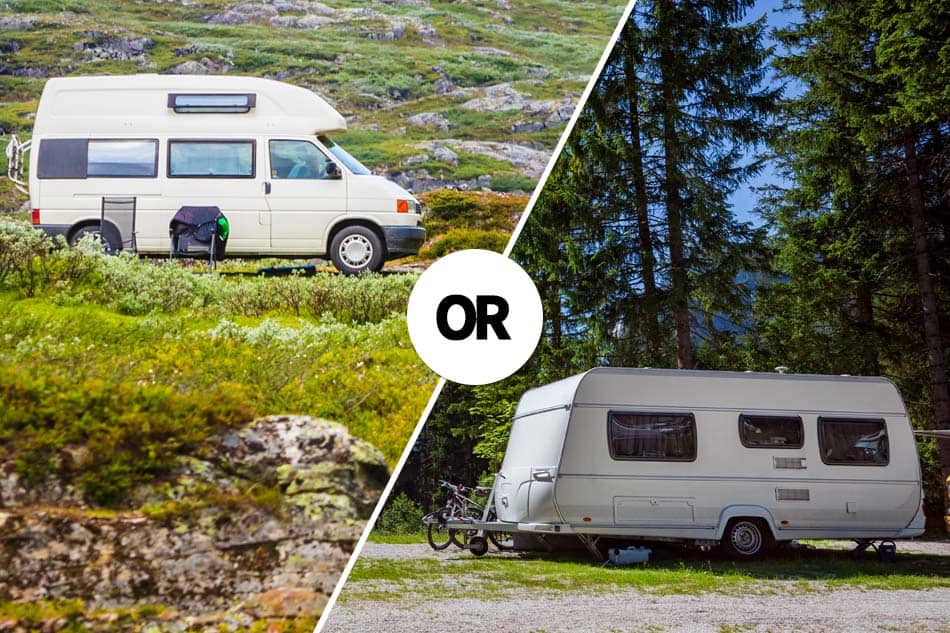
Camper vans and travel trailers can be great options for those who want to camp in comfort. Although they have much in common, they are very different from each other and it can be difficult deciding on which one to buy.
I researched and looked at both types during my search for a camping solution. I liked a lot of what travel trailers had to offer but the convenience of a camper van was nice as well.
I’ve looked at large travel trailers and small travel trailers and tried to figure out which would be best for me. I have always leaned towards the smaller ones because I like the coziness and the simplicity of keeping it small. I never wanted a huge trailer that would be cumbersome to tow around.
This is what led me to look more at camper vans because of the smallness and the convenience of being able to drive anywhere.
I also loved the idea of being able to custom build a camper van which would make it more affordable than buying a manufactured Class B.
If you find yourself in this position of trying to decide between a trailer or a van, I can show you my research notes and why I chose what I chose in the end.
I understand that deciding on the perfect type of RV can be a difficult process. It’s normal to be unsure since it’s such a large expense. It’s important to make the best decision for yourself and choose the one you’ll actually use and get the most out of.
Let’s compare the two options in a few key areas.
Camper Van VS Travel Trailer
It’s likely that if you are looking between a camper van and a travel trailer, you are looking at mostly small travel trailers. Since small trailers aren’t a lot bigger than what a van offers, this is a fair comparison.
Both require you to live more minimal than you would in a larger motorhome or fifth wheel.
Although the size of some of the smaller trailers can be similar to the size of a camper van, there are a few key areas in which they differ. This is where it becomes easy to decide on which is best for you as long as you know what you want.
Let’s discuss the following key areas.
Cost of ownership Size Liveability Mobility Quality
Cost Of Ownership
Expect to pay: $50,000 – $100,000
A van can be quite expensive if you are looking to purchase a newly manufactured van. Some of the more premium models on the market can be in the $150,000 or more range.
This is a huge expense for anyone looking to purchase a van. Unless this is your primary residence and you have the funds to afford it, this type of purchase doesn’t make much sense for the average consumer. Especially when you consider the small size of a van.
The good news is that there are more affordable options so the high cost mentioned above isn’t always the case. You can purchase brand new Class B vans for around $70,000 and much less than that if you choose to go with a used one.
A used van is a great choice since RVs depreciate. You can get an almost new one for much less than the MSRP or for whatever it was bought for when it was brand new.
The other option is to build your own. You can get an empty van and then turn it into a camper if you have the skillset and interest to do so. If not, you can hire someone to do it for you. The cost for a van of this type would be considerably less than purchasing a new one.
Another cost to consider is maintenance. Not only do you have the maintenance costs of the RV itself but also the van. Although there isn’t a lot of maintenance to the RV portion of the van other than winterizing and making sure it stays leak-free.
You’ll have to get oil changes, tire rotations, tire replacements, and other routine vehicle maintenance. These costs can add up depending on how much you use the vehicle.
Travel Trailer
Expect to pay: $10,000 – $35,000
A travel trailer can be much less than a camper van unless you choose to build your own camper van and buy a cheap, used van. If you choose a newer van or if you buy a pre-manufactured van, you will pay much less for a travel trailer.
However, there are other costs that you must consider if this is the route you go. A trailer has to have a vehicle that can tow it. If you do not currently have a vehicle capable of this, you will have to purchase one and that is an added cost.
With a tow vehicle, it will create wear and tear on that vehicle which may also lead to more maintenance costs.
In my case, during my search, I was focused on purchasing a trailer that had a loaded weight of 5500 lbs or less. My Nissan Frontier with 4.0L V6 engine can tow up to 6500 lbs but I never like to get close to the max on towing weight.
Most small travel trailers that I looked at were below 4000 lbs when fully loaded so it wasn’t a big deal for my vehicle. If I would’ve had to purchase a vehicle to tow a trailer, I wouldn’t even have considered one.
So if the cost is your main concern, travel trailers are likely going to be less expensive. Just don’t forget about the tow vehicle when making the decision.
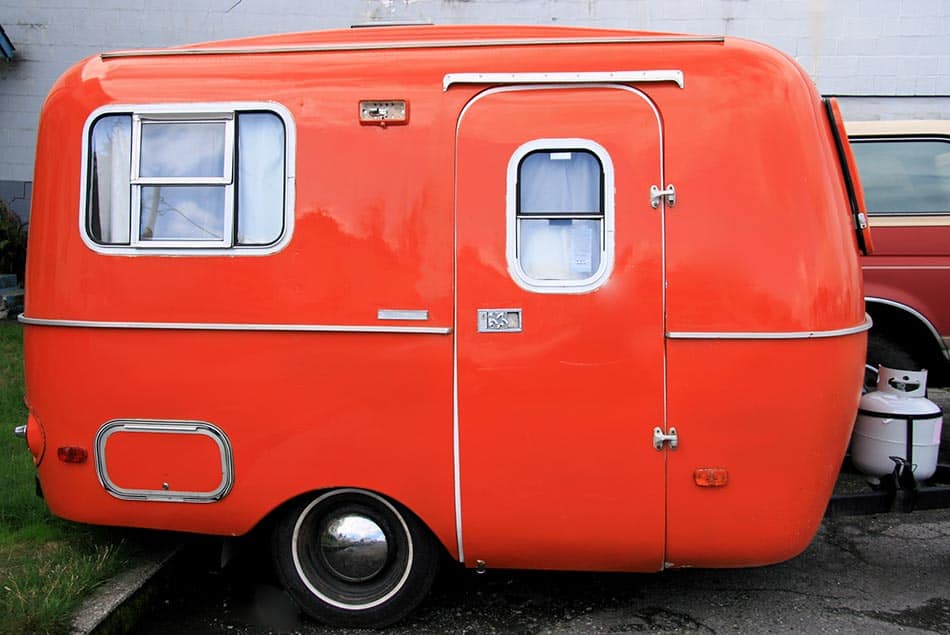
Camper vans offer a very limited amount of living space and can be among the smallest RVs on the market. The typical van measures from about 19 ft – 25 ft in length from the front bumper to the rear bumper.
With the engine compartment, dashboard, driver and passenger seating taking up space, you are left with a tiny footprint on the inside in which you can live.
Although they are small, they still contain almost everything you could ever need while out on the road. Many of them have full showers, bathrooms, kitchen areas, dining areas, sleeping areas and comfortable seating that allows you to unwind and enjoy.
Camper vans serve a crowd of people who want to take up minimal space but want the convenience of traveling anywhere their heart desires. They don’t want the restrictions that are attached to having a larger camper.
Although small, most offer more space than a van can provide. Small teardrop trailers are smaller than vans but larger teardrop trailers can be even larger than the living area in a van.
Trailers also have options that vans don’t often have and that includes slide outs. These slide outs allow you to slide parts of the trailer out while it is parked to create additional living space. Some aren’t even livable until these sections have been slid out.
With slide-outs, a trailer can be very room and make for a very comfortable living arrangement. You won’t see this feature on the smallest trailers but as you go up in size, this will become an option that you’ll see more of.
Overall, travel trailers provide a good amount of living space for the money that you pay.
Liveability
How easy is it to actually live and spend time in a camper van? One would think that it could get a little claustrophobic spending time in such a small space. However, you might be surprised at just how much space you have in one.
Most Class B vans are cleverly designed to maximize space. Although it will never be like living in a much larger RV, it is quite cozy and fun in my opinion.
I travel in mine with my wife and a small dog and we find it to be quite comfortable. The trade-off is that it is highly versatile and the mobility of it allows you to go to places you couldn’t go with an RV with a larger living space.

Depending on the size of the trailer, they can be quite livable. It’s like pulling a little house around behind your car that has everything that you need. You can cook, stay warm or cool, watch TV, take showers, use the bathroom just like you would at home.
You probably won’t miss any of the comforts of home if you spend time in a travel trailer. Even a small one is designed to have a livable amount of space and is usually set up to maximize that space.
A travel trailer is an obvious choice if you are traveling with a larger family. If you have children, you’ll need the extra space that a trailer can provide over a van.
This is where a camper van will shine over a travel trailer. Camper vans are very versatile and are easy to take wherever you want.
Since the van is an all-in-one solution, you have your vehicle and your home all in one space. You don’t have to hitch up to a trailer and then worry about towing it.
Vans are a huge benefit for those who want to stay small and nimble in their camper and be able to travel and see places that larger RVs can’t.
I’ve never had an issue taking my van anywhere and I feel comfortable driving it anywhere that I have driven my personal mid-sized truck. I can back it into a spot easily and be gone in minutes when it’s time to leave.
Trailers are not as nimble and are more difficult to travel with. Although a small trailer can be easy to tow, it’s still something extra that has to be pulled by your vehicle and it can make you a bit uncomfortable having it behind you.
People who aren’t used to towing trailers and only do it every once in a while can have some anxiety about doing this. There is always that chance that you can turn too sharp and hit something or misjudge how much space you need.
Of course, backing into a spot is difficult for many people and a small campground can be difficult to navigate with a trailer. The bigger the trailer, the more difficult it will be.
If you are considering a small trailer, like a teardrop trailer, read about my comparison to a camper van .
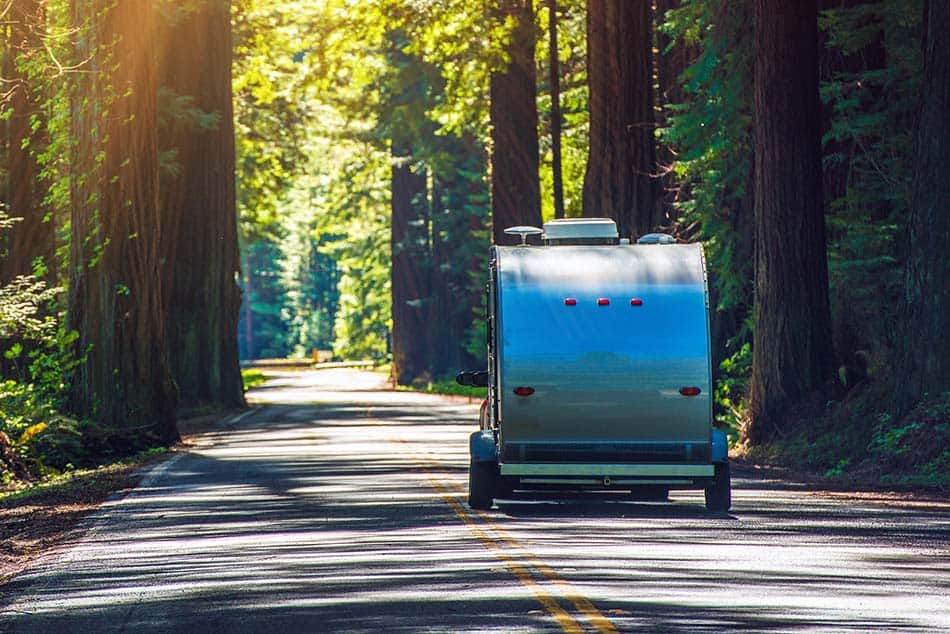
For the most part, the class B motorhomes that I looked at were noticeably higher in quality than were the travel trailers. You would expect them to be higher quality for the price you pay.
Most of the finishes are what you would expect and they just have an overall feel of quality. Some of the more premium-priced ones are even higher in quality.
I care about quality but this may not matter to some people as much. To me, the quality of the parts you can see is an indication of the quality of work that you can’t see.
If I see a low quality, sloppy job done on the shower caulking, for example, I can only imagine the low quality of work that is probably behind the shower walls.
With Class B motorhomes, most of the areas seem to be high quality and I always had a good feeling when looking at them.
During my journey to find a camping solution, one thing stood out as I looked at various travel trailers; the quality is pretty low.
As I walked through trailer after trailer, I noticed the quality was lacking from all the small details. Things like trim not lining up, terrible caulking job, cheap parts, paper-thin walls, etc.
I understand that campers use thinner walls to maintain a lower overall weight but I was amazed during my search that manufacturers could get away with such cheap finishings. It didn’t give me a lot of confidence in purchasing one.
It isn’t like this across the board but a lot of them do not maintain the quality that I like to see in something this expensive.
In the end, I was much happier with the quality and care that I used to build my camper van than I was with any travel trailer that I looked at.
The following video shows some issues you might expect from travel trailers and RVs in general. These issues aren’t always present but it’s good to know what to look for.
Which Is Better?
Ask anyone and you will get a different answer to this question. The one that is better for you may not be better for someone else.
For example, a camper van was better for me because I don’t want the hassle of pulling a trailer. I don’t care how nice the trailer is, I would rather stay in the small space of a van than have to go through the trouble of hauling a trailer all over the place.
That’s my take on it and I’m sure yours is different.
It comes down to what the person wants. If you are looking for more space to live in, you are probably going to be happier with a travel trailer than you would be with a camper van.
On the other hand, a camper van is great for those people who like to travel and see more. It’s great for those who want to be able to drive and not have to worry about any size restrictions since a camper van is small enough to go anywhere.
You are not limited with a camper van like you would be with a larger trailer.
Below, I have outlined some examples of when it would be best to have each type.
Who Should Buy A Camper Van?
A camper van might be a good solution for you if…
- You plan on traveling more and don’t want the worries of size restrictions or the burden of towing a trailer.
- You want to boondock often and stay somewhat stealthy.
- You are camping alone or with one other person and don’t need a lot of space.
- You like the idea of taking less stuff so you can enjoy your journey more.
- You have more money to spend on a camping solution.
- You are looking for something with good fuel economy.
- You are handy and like the idea of building your own camper van.
- You want your driving area connected to your living space so you don’t have to exit the vehicle.
Who Should Buy A Travel Trailer?
A travel trailer will probably be a better solution for you if…
- You have a family and need more space or you are just someone who likes having a lot of space.
- You plan on staying at RV parks most of the time. If you plan on pulling into an RV park and parking for the week, a trailer will serve you well.
- You have less money to spend.
- You already have a good towing vehicle or are willing to purchase one.
- You don’t mind towing a trailer behind a vehicle.
- You have a good place to store the trailer when not in use.
- You don’t mind exiting your vehicle to access your living area.
- You want to be able to disconnect from your trailer at an RV park and have a personal vehicle to drive.
Bottom Line
A camper van and a travel trailer might appeal to the same people but they will likely disagree on some of the main features. If you are looking for a home away from home that provides the space you need for you and your family, a travel trailer is your answer.
If you are looking for a vehicle that will take you to places far and wide and give you a cozy, safe place to stay, a camper van could be the answer.
One isn’t necessarily better than the other and it will all depend upon what you aim to use it for.
If you are stuck deciding on what type to pursue, the best thing to do is what I did when I was in the same position. I went searching my local area at RV dealerships and looked at dozens of different models of each type.
Doing this will allow you to get a feel for what it is like inside each type and you’ll start to learn which is best for you.
Nothing can take the place of seeing them with your own eyes so make a plan to step foot inside each of these and determine which one you’ll go with.
Dan Collins
I consider myself an outdoor enthusiast. I love to travel and go to places that most people don't get a chance to go. I want to see it all and live life to the fullest while I'm alive. My camper van is helping me to do just that. I write about my experiences to help inspire others to do the same.
Recent Content
What Size RV Do I Need? Size Comparisons of Each Type
Choosing the best RV can be a difficult task! It isn't always easy to pick the perfect solution on the first go-around, especially if you are new to the lifestyle. I drive a camper van but it may not...
6 Reasons Why Renting an RV Is a Good Idea
Purchasing an RV can be quite an expensive undertaking! Not only is it expensive but also requires space in which to park it. Many people just don't have the room for a large RV sitting in their...
- Credit cards
- View all credit cards
- Banking guide
- Loans guide
- Insurance guide
- Personal finance
- View all personal finance
- Small business
- Small business guide
- View all taxes
You’re our first priority. Every time.
We believe everyone should be able to make financial decisions with confidence. And while our site doesn’t feature every company or financial product available on the market, we’re proud that the guidance we offer, the information we provide and the tools we create are objective, independent, straightforward — and free.
So how do we make money? Our partners compensate us. This may influence which products we review and write about (and where those products appear on the site), but it in no way affects our recommendations or advice, which are grounded in thousands of hours of research. Our partners cannot pay us to guarantee favorable reviews of their products or services. Here is a list of our partners .
RV vs. Camper: Which Is Right for You?

Many or all of the products featured here are from our partners who compensate us. This influences which products we write about and where and how the product appears on a page. However, this does not influence our evaluations. Our opinions are our own. Here is a list of our partners and here's how we make money .
Camping saw a huge spike in interest during the pandemic as travelers looked for fresh air and wide-open spaces.
Even as restrictions lifted, many people continued to look to the outdoors for vacations. Whether you’re planning a weekend excursion or are a digital nomad, camping remains a fulfilling and budget-friendly option for many travelers.
One of the most important considerations for campers is where to sleep, and if you’re not opting for a tent, that means sifting through other options, from recreational vehicles and motorhomes to campers, trailers, pop-ups and fifth wheels.
For those who are new to camping, you may be wondering whether you should choose an RV or a camper. Here’s what you need to know when deciding between the two, including the main differences.
What’s the difference between an RV and a camper?
A recreational vehicle (RV) is a catch-all term that applies to the family of vehicles that can be driven, towed or popped up as well as lived and slept in, says Paul Bandstra, national sales executive at campground booking site Campspot. He has visited 42 campgrounds in 11 months, logging about 20,000 miles in his camper.
Those less familiar with camping may hear the term RV and picture a motorhome — a large vehicle with living space and an engine. “Those are the units that have a steering wheel and a gas pedal and you drive it,” Bandstra explains.
So is a camper an RV? By most definitions, yes.
It’s generally understood that campers and trailers need to be towed by a separate vehicle — often a pickup truck or an SUV, Bandstra says. There’s a wide range of towable options, from fifth wheels to travel and pop-up trailers.
» Learn more: RV road trip routes in the United States
What are the pros and cons of a motorhome?
Having established that motorhomes are, in fact, RVs with a steering wheel, it’s worth asking: Is it right for your needs?
There are a few classifications within the motorhome family, Bandstra explains, from the extensive and luxurious Class A models to smaller Class C ones.
Generally, motorhomes have sleeping and living accommodations, and they tend to be larger. This gives them some definite pros and cons .
“The bigger unit has more room but limits your options of where you can go. It costs more to tow and to camp,” Bandstra says, noting that many campgrounds restrict motorhomes. These RVs may also have a limited — and sometimes pricier — set of sites where they're permitted.
And, he says, the costs of motorhomes themselves — particularly the larger, more luxurious ones — can be quite high. A new Class A motorhome can cost from $50,000 to $150,000 or more.
Some motorhome dwellers choose to tow a separate vehicle behind the RV to give them a more flexible form of transportation once they’re set up at a campground.
» Learn more: RV vs. hotel: Which is more economical?
Are campers worth the investment?
Because of the high price and large size of a motorhome, many camp enthusiasts instead opt for campers, which are pulled by a separate vehicle. There are many types of campers: travel trailers, fifth wheels and pop-ups, to name a few.
Travel trailers, Bandstra says, hitch onto an SUV or a pickup truck and are towed — similar to how you’d tow a boat. There are many types of trailers, ranging from 10 to 40 feet in length.
A fifth wheel, which is the type Bandstra’s family selected last year, latches onto the bed of a pickup truck. These campers are typically a bit longer, starting at 20 feet and reaching up to 40 feet long.
“It’s a lot easier to tow a fifth wheel,” he says. “There’s a lot more room for swinging if you have a bigger unit; the wind affects it more.”
Like motorhomes, plenty of travel trailers and fifth wheels have kitchens, bathrooms, sleeping areas and space for multiple people.
Bandstra likes the camper because he can unlatch it at a campground and drive his truck to the store, work assignments or wherever else he needs to go.
» Learn more: The best RV rental options and how to choose
Is it worth buying a pop-up camper?
Pop-up campers are a far smaller type of towable RV with a hard-shell base and wheels. They unfold into a tent-looking structure.
Part of the camper family, pop-ups are typically less than 20 feet long and are pulled by a vehicle. Most are fairly simple and don’t have amenities like a kitchen or bathroom, so it’s typically not a permanent living option for long-term travelers.
“[Pop-ups] are usually just going to be for a couple, maybe a couple smaller children,” Bandstra says. Pop-ups have benefits, though. “They’re definitely more affordable, and they’re easy to tow because they’re small,” he adds.
» Learn more: How safe is an RV road trip?
Camper vs. RV, recapped
Ultimately, Bandstra suggests travelers looking to buy or rent one of these options — whether a camper or an RV — consider their needs carefully.
“We spent hours with the kids narrowing it down to what floor plan or model is best going to suit us,” he says, adding that they looked at over 100 options before deciding.
“For us, it was full-time living and traveling and working remotely,” he says, adding that it’s a good idea to think about how frequently you’ll be using it.
And regardless of the model selected, Bandstra recommends buying a product with a warranty or purchasing an extended warranty to cover costs. He says not doing so can be a key mistake for first-time buyers.
After all, for many travelers, these vehicles become a home — or a home away from home, at least.
How to maximize your rewards
You want a travel credit card that prioritizes what’s important to you. Here are our picks for the best travel credit cards of 2024 , including those best for:
Flexibility, point transfers and a large bonus: Chase Sapphire Preferred® Card
No annual fee: Bank of America® Travel Rewards credit card
Flat-rate travel rewards: Capital One Venture Rewards Credit Card
Bonus travel rewards and high-end perks: Chase Sapphire Reserve®
Luxury perks: The Platinum Card® from American Express
Business travelers: Ink Business Preferred® Credit Card

on Chase's website
1x-5x 5x on travel purchased through Chase Travel℠, 3x on dining, select streaming services and online groceries, 2x on all other travel purchases, 1x on all other purchases.
60,000 Earn 60,000 bonus points after you spend $4,000 on purchases in the first 3 months from account opening. That's $750 when you redeem through Chase Travel℠.

1.5%-6.5% Enjoy 6.5% cash back on travel purchased through Chase Travel; 4.5% cash back on drugstore purchases and dining at restaurants, including takeout and eligible delivery service, and 3% on all other purchases (on up to $20,000 spent in the first year). After your first year or $20,000 spent, enjoy 5% cash back on travel purchased through Chase Travel, 3% cash back on drugstore purchases and dining at restaurants, including takeout and eligible delivery service, and unlimited 1.5% cash back on all other purchases.
$300 Earn an additional 1.5% cash back on everything you buy (on up to $20,000 spent in the first year) - worth up to $300 cash back!

on Capital One's website
2x-5x Earn unlimited 2X miles on every purchase, every day. Earn 5X miles on hotels and rental cars booked through Capital One Travel, where you'll get Capital One's best prices on thousands of trip options.
75,000 Enjoy a one-time bonus of 75,000 miles once you spend $4,000 on purchases within 3 months from account opening, equal to $750 in travel.

Travel Trailer Vs. Camper: What’s the Difference?

About the Author
Tom Davidock
If you’re beginning your search for a Recreational Vehicle (RV) and are trying to sort out the differences between the various options, you’re not alone. One common point of confusion that many people have is the difference between a camper and a travel trailer. These two terms often spark confusion and are occasionally used interchangeably, “camper” and “travel trailer.”
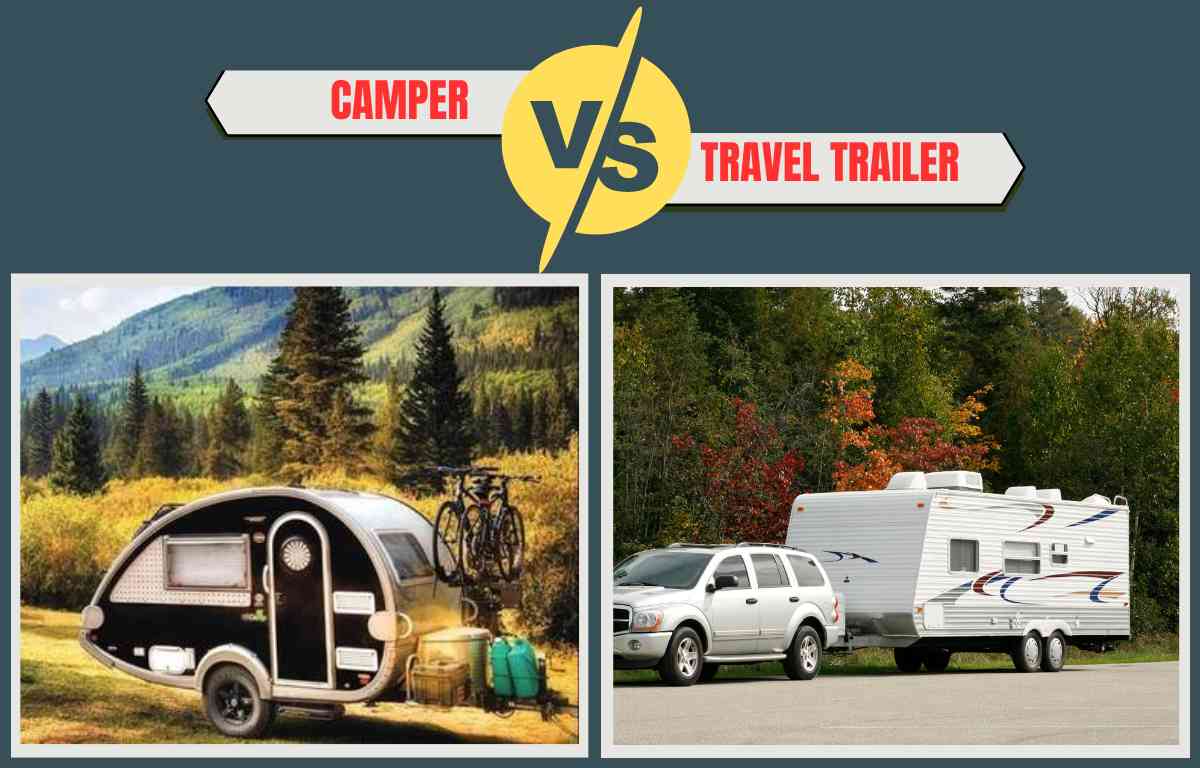
While these terms might seem synonymous, they denote distinct categories of RVs, each offering its own set of features, advantages, and charm. However, don’t worry too much about the terminology. The best way to find the perfect RV is to see it in person and decide if it fits your needs and travel style. In this article, we’ll look at the nuances between campers and travel trailers and shed some light on their terminology, design, functionality, and what sets them apart.
Defining the Terminology: Camper and Travel Trailer
Before we delve into the distinctions, let’s look at the core definitions of “camper” and “travel trailer.” Aside from truck campers, both can fall under the category of towable RVs.
Camper: A camper is a term often used as an umbrella category encompassing various types of recreational vehicles (RVs) that are designed for temporary accommodation and travel. Specifically, a camper can refer to a smaller type of RV that can be towed behind a vehicle or affixed to the bed of a pickup truck, creating a self-contained living space. You may also hear campers referred to as camping trailers or camper trailers. Still, regardless of name, these compact units typically provide essential amenities, including sleeping space and basic kitchen facilities, making them ideal for those seeking a cozy and efficient camping experience.
Travel Trailer: On the other hand, a travel trailer is a larger type of RV designed to be towed behind a vehicle, such as a truck or SUV. These trailers offer a spacious living area, a kitchenette, bathroom facilities, and sleeping quarters. Available in various sizes and layouts, travel trailers provide flexibility, allowing you to detach the trailer from the towing vehicle once your campsite is established and allowing you the freedom to explore your surroundings independently. Not to be confused with a 5th wheel, a travel trailer is towed from the bumper of a vehicle.
While the terms “camper” and “travel trailer” might sound interchangeable, their specific meanings highlight the contrasting nature of these two categories of RVs. While a travel trailer can be a large RV, a camper, by definition, is typically quite a bit smaller and won’t have the extra space afforded by their bigger RV counterparts. Let’s dig a little deeper into the various types of trailers and campers.

The Different Types of Campers
Campers come in various shapes and sizes, each tailored to different preferences and travel styles. Let’s take a closer look at some of the different types of campers available in recreational vehicles.
Pop-Up Campers:
Pop-up campers, also known as tent trailers, are a popular choice for those seeking a lightweight and compact RV. A pop-up trailer features collapsible walls, which can be expanded when parked to provide additional living space. When folded down, they become more streamlined and easier to tow, making them suitable for various vehicles. Pop-up campers are especially favored by campers who value versatility and convenience. Despite their relatively modest size, these campers can offer sleeping areas, basic kitchen facilities, and sometimes even bathroom amenities.
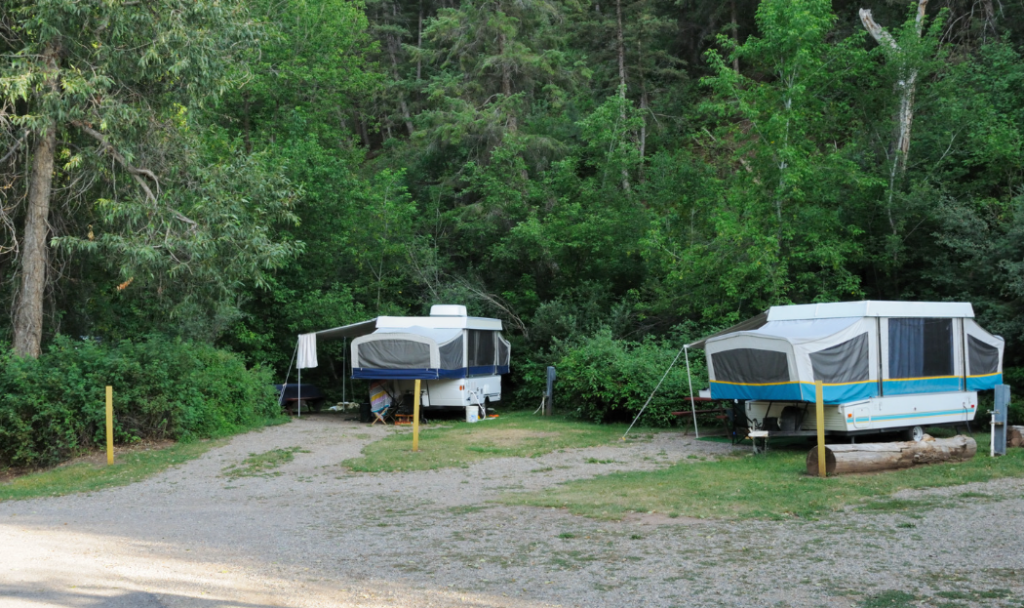
Truck Campers:
A Truck camper, also called a slide-in camper, is designed to fit directly onto the bed of a pickup truck. This unique design allows for easy installation and removal, providing a self-contained living space that travels with the truck. Truck campers offer a compact and efficient layout, making them an excellent choice for solo travelers, couples, or those who prioritize mobility. Despite their smaller footprint, truck campers often include sleeping areas, a kitchenette, and bathroom facilities, allowing you to enjoy the comforts of home while on the road.
Teardrop Trailers:
Teardrop trailers are known for their distinct teardrop-shaped design, prioritizing aerodynamics and efficiency. These compact campers are perfect for individuals or couples seeking a cozy and minimalistic camping experience. While they may appear small on the outside, teardrop trailers often feature ingenious interior layouts that maximize space. They typically include sleeping quarters, a small kitchen area, and sometimes basic amenities. Teardrop trailers are easy to tow and maneuver, making them an ideal choice for those who value simplicity and style. Some manufacturers will put these in the category of small travel trailers.
Off-Road Campers:
As the name suggests, off-road campers are designed to tackle rough terrains and adventurous trails. These campers have robust suspensions, reinforced frames, and off-road tires, allowing you to explore remote and challenging destinations. Off-road campers often come with features such as higher ground clearance, heavy-duty construction, and specialized amenities for outdoor enthusiasts. These are great options if you plan to travel on rough terrain or maneuver down narrow roads in more remote areas.

The Different Types of Travel Trailers
Travel trailers come in various shapes and sizes, each catering to different preferences, group sizes, and travel experiences. Let’s delve into some different types of travel trailers, each offering unique features and advantages.
Conventional Travel Trailers:
Conventional travel trailers are the quintessential choice for many RV enthusiasts. They come in various sizes, layouts, and floor plans, making them versatile for individuals, couples, families, and even larger groups. From compact units with all the essentials to spacious models with slide-out extensions, conventional travel trailers offer an array of amenities. They typically include sleeping quarters, a kitchenette, dining areas, and bathroom facilities.
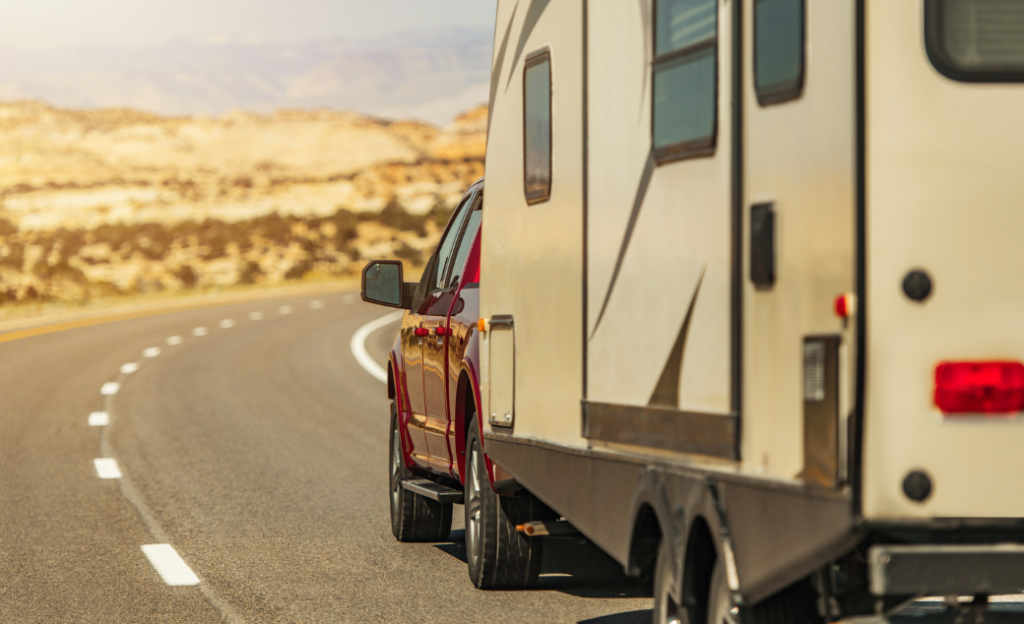
Toy Haulers: Blending Adventure and Comfort
Toy haulers are travel trailers designed with a twist— they come equipped with a garage area at the rear, which can be used to transport motorcycles, ATVs, bicycles, or other adventure gear. This unique feature combines the convenience of an RV with the ability to bring along your favorite outdoor toys. Toy haulers often feature fold-down beds, convertible seating, and ample storage space.
Ultra-Light Travel Trailers: Towable with Ease
Ultra-light travel trailers are engineered to be lightweight and easy to tow, making them an excellent choice for those with smaller tow vehicles or who want improved fuel efficiency. These trailers are designed with lightweight materials and streamlined construction, allowing you to hit the road without needing a heavy-duty truck. Despite their compact size, ultra-light travel trailers offer essential amenities, including sleeping quarters, kitchen facilities, and sometimes even bathroom amenities.

Luxury Travel Trailers: Embracing Elegance
For travelers who seek the epitome of comfort and style, luxury travel trailers offer a lavish experience on the road. These trailers feature high-end amenities, upscale finishes, and a focus on sophisticated design. From luxurious furnishings to gourmet kitchens and spacious living areas, luxury travel trailers provide a home-away-from-home experience.
Similarities Between Camper and Travel Trailer
Campers and travel trailers accomplish the same goals in the diverse landscape of RVs, offering travelers the freedom to explore the world while enjoying the comforts of home. While these two categories might have distinct features and designs, they share an essence that draws enthusiasts to both options. When differentiating between the two, it’s essential to highlight the significant similarities that make them both appealing choices for those seeking a mobile lifestyle.
Home Away from Home:
At their very heart, campers and travel trailers offer a familiar refuge amidst the unfamiliarity of new landscapes. Whether you’re traversing mountains, lounging by serene lakes, or nestled in your local RV park, these vehicles provide a cozy space to sleep, eat, or relax each day.
Sleeping Quarters:
Both campers and travel trailers accomplish one of the primary goals of an RV, providing comfortable sleeping quarters. Whether you’re traveling solo, as a couple, or with family and friends, these vehicles cater to varying numbers of occupants with their diverse floor plans. From snug sleeping areas to spacious master bedrooms, the sleeping arrangements allow you to wake up refreshed and ready for the day’s escapades.

Kitchen and cooking:
Both campers and travel trailers will offer some type of kitchen facilities that allow you to cook on the go. From preparing your morning coffee to crafting gourmet campfire dinners, the equipped kitchenettes in both options empower you to savor culinary delights while surrounded by breathtaking landscapes. While the size of the kitchen and available amenities will vary with the size of the RV, this shared feature is something you can expect in either option.
Bathroom Amenities:
Most campers and travel trailers will provide some type of bathroom facilities. Depending on their size and layout, both offer bathroom amenities ranging from basic toilet facilities to more comprehensive setups that include showers. Small campers may be limited in bathroom options, with very small ones only offering a portable toilet and outdoor shower. However, having these amenities within reach eliminates the dependency on external facilities.
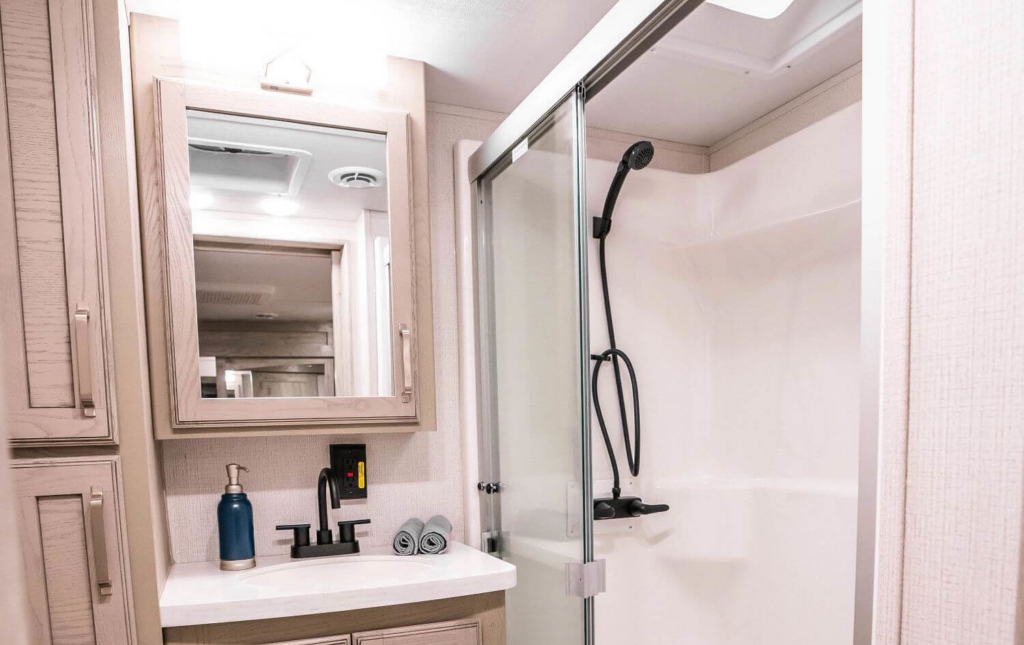
Flexibility and Exploration:
Both campers and travel trailers embrace the spirit of adventure by granting you the freedom to change your destination and itinerary as your wanderlust dictates. Whether you’re traversing remote camping spots, exploring national parks, or simply embarking on a spontaneous road trip, the flexibility these options provide ensures you can adapt your journey to your desires and discoveries.
Differences Between Camper and Travel Trailer
While these two categories share commonalities that make them both alluring options for travelers, it’s essential to recognize their distinct characteristics and functionalities. Let’s delve into the key differences that set campers and travel trailers apart, helping you make an informed decision when selecting the ideal RV for your adventures.
1. Design and Size:
Campers: Campers are smaller and designed to be affixed to the bed of a pickup truck or towed by a smaller vehicle. Their size is inherently limited due to the dimensions of the truck bed or the smaller size of the vehicle towing it. This design makes campers an excellent choice for solo travelers, couples, or those who prefer a more minimalist approach to camping.
Travel Trailers: In contrast, travel trailers encompass a broader spectrum of sizes and layouts. From compact units to expansive models with slide-out extensions, travel trailers often offer more spacious living areas, separate sleeping quarters, and comprehensive kitchen and bathroom facilities. This versatility makes them a better option for individuals, families, and larger groups seeking varying comfort levels.
2. Towing and Mobility:
Campers: Campers are usually easy to tow and usually offer an easier learning curve for folks unfamiliar with towing an RV. For truck campers, they provide a seamless integration with the towing vehicle, as they become a single unit when attached to the bed of a truck. This configuration enhances maneuverability, especially in tight spaces, and simplifies the overall towing experience. Since the campers are usually smaller, they will also improve fuel efficiency when getting to and from the campsite. A small camper will also offer better gas mileage for your tow vehicle. A small camper will be a great choice if you want to be nimble and take spontaneous road trips.

Travel Trailers: Travel trailers are designed to be towed behind a separate vehicle, such as an SUV or truck. This towing setup allows for greater mobility once you’ve reached your destination. You can unhitch the travel trailer and use your vehicle independently to explore local attractions, run to the grocery store, or embark on day trips. Larger travel trailers will require some practice when towing and maneuvering the vehicle. Unless you have a smaller trailer, It will take some skill to maneuver through parking lots or a tight campsite. Also, due to their large size, your fuel economy when towing will be much less than with a camper.
3. Living Space and Amenities:
Campers: Due to their smaller size, campers have a more compact layout that generally results in limited interior space. While they offer sleeping quarters and basic kitchen facilities, the overall living area is more confined than travel trailers. This is one of the main differences when shopping for your first RV.
Travel Trailers: Their larger dimensions typically provide more spacious living areas. Depending on the model, they can include features like separate bedrooms, comfortable seating arrangements, full kitchens with appliances, and even more luxurious amenities. Many travel trailers will offer slide outs, providing much more space when set up at the campground. The extra room allows for greater comfort and a more home-like atmosphere.
4. Storage:
Campers: Campers have a more limited storage capacity due to their compact size. While they offer some storage solutions, you’ll need to be selective about the items you bring along on your journey. Unlike a large travel trailer, campers will have fewer options to transport or store their camping gear or supplies.
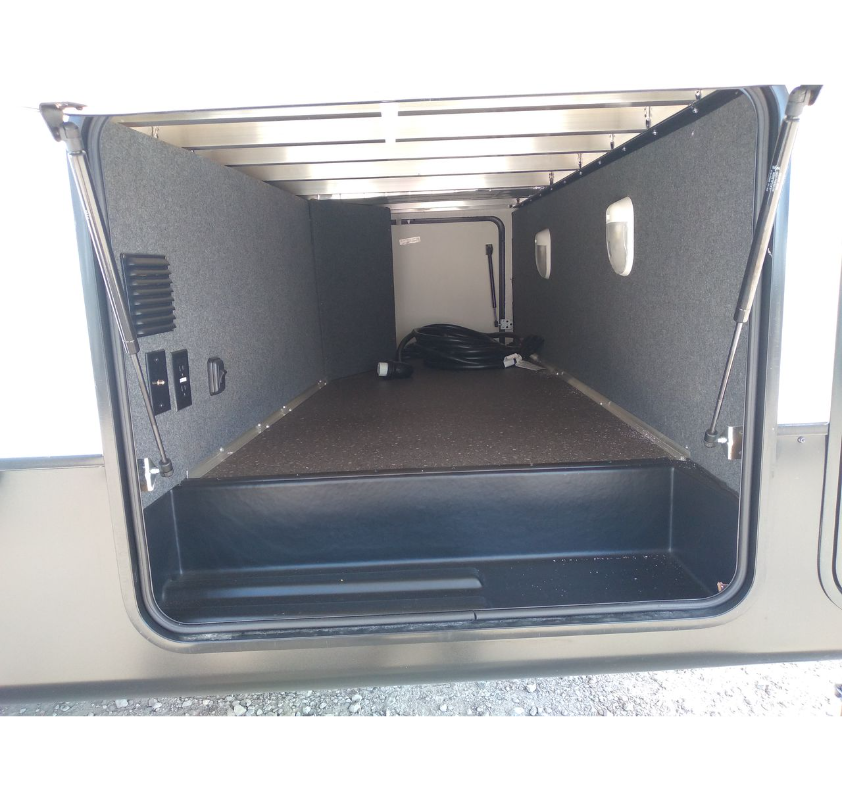
Travel Trailers: The larger dimensions of travel trailers usually translate to more storage space. These trailers often feature ample cabinets, closets, and storage compartments, allowing you to bring a wider variety of gear, equipment, and personal items. While smaller travel trailers won’t have much space, they’re still usually a better choice for a large family with more things to bring along.
5. Tow Vehicle Requirements:
Campers: If you choose a towable camper, you won’t need as big of a tow vehicle. An SUV can usually tow a small teardrop trailer or pop-up camper. However, truck campers usually require a larger pickup truck due to their design that attaches directly to a bed of a truck. The camper’s weight and dimensions will influence the specific truck requirements.
Travel Trailers: Travel trailers can be towed by a broader range of vehicles, including SUVs, half-ton trucks, and some larger crossover vehicles. The towing capacity and appropriate hitching system will vary based on the size and weight of the travel trailer.
By understanding these key differences, you can better evaluate whether a camper or a travel trailer aligns with your travel style, group size, and preferences. Each option offers distinct advantages that cater to various needs, ensuring you can embark on your journeys with the perfect RV companion.
Comparing Campers, Travel Trailers, Fifth Wheels, and Motorhomes
Travel trailers and campers are just two categories of RVs. If you’re looking at different options with more features, two significant contenders in this realm are fifth wheels and motorhomes. These options offer distinct advantages, designs, and functionalities that set them apart from campers and travel trailers. Let’s delve into how fifth wheels and motorhomes differentiate themselves from campers and travel trailers, allowing you to make an informed decision that aligns with your travel aspirations.
Fifth Wheels:
Fifth wheels are a unique category of RVs that require a special hitch installed in the bed of a pickup truck. This hitching mechanism provides enhanced stability during towing, making fifth wheels attractive for those seeking a smoother towing experience. Fifth wheels often boast more living space than traditional travel trailers due to their design extending over the truck bed. This design allows for additional slide-out rooms, creating a spacious, home-like interior. The hitching system also results in a tighter turning radius, allowing for greater maneuverability when navigating tight spaces. Fifth wheels are a popular choice for long-term travelers or those who prioritize ample living space while on the road.
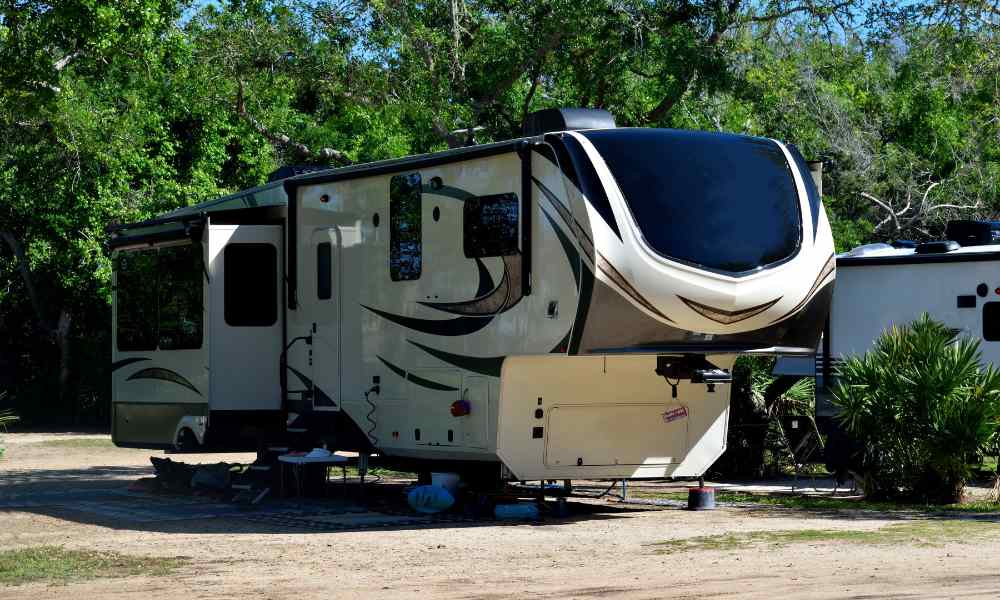
Motorhomes:
In contrast to both campers and travel trailers, motorhomes are self-contained units with their own engines. This all-in-one design seamlessly combines the living area with the driving space, eliminating the need to tow a separate vehicle. Motorhomes come in different classes—Class A, Class B, and Class C—each offering varying sizes, layouts, and amenities. Class A motorhomes are the largest and most luxurious, resembling a bus in appearance and offering expansive living spaces. Class B motorhomes, or camper vans, are compact yet versatile, ideal for couples or solo travelers seeking mobility. Class C motorhomes fall in between, often built on a van chassis with a distinctive cab-over design, providing additional sleeping or storage space. Motorhomes provide the convenience of having everything in one unit, making them a popular choice for those who want to seamlessly transition from driving to living without disconnecting or hitching. However, since you have an engine, maintenance costs will usually be higher for motorhomes.
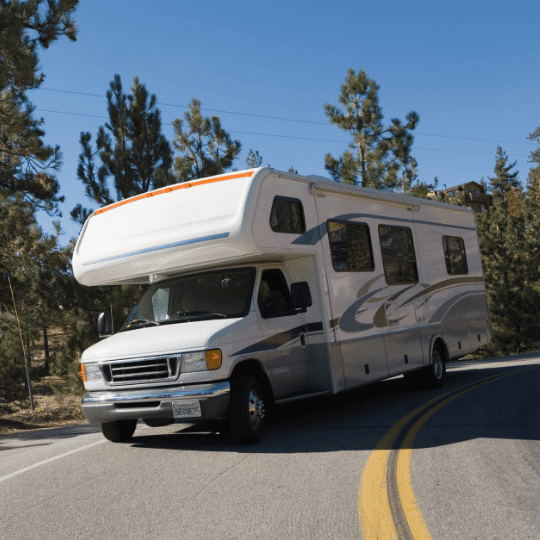
In Summary: Finding Your Perfect Match
The world of RVs offers various options, each catering to different preferences, group sizes, and travel styles. While campers and travel trailers provide a sense of home on wheels, fifth wheels offer enhanced stability and spacious interiors. At the same time, motorhomes bring together convenience and comfort in an all-in-one package. Understanding the distinctions among these options empowers you to select the perfect companion for your journeys. Whether you’re drawn to the compact mobility of campers, the spacious elegance of fifth wheels, the versatility of travel trailers, or the seamless convenience of motorhomes, each choice promises a unique adventure on the open road. The decision ultimately rests upon your priorities, travel aspirations, and the experiences you seek to create.
Leave a Reply Cancel reply

Camper Van vs RV: Which Is Better for My Upcoming Trip?
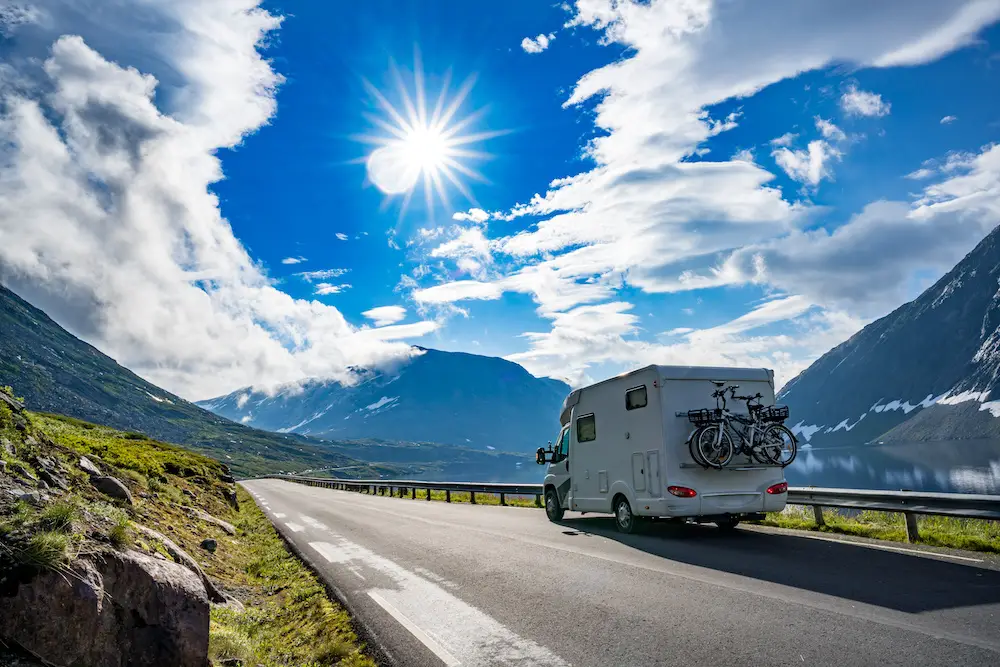
Published Date: January 3, 2022
Last Updated on November 29, 2022 by camper front
Knowing which to choose between a camper van vs RV means you can get on the road with a vehicle you can trust.
That said, both options differ considerably from each other and can give you different experiences while away from home.
Let’s explore the most important things that make camper vans and RVs unique to help you find the best option.
Table of Contents
What Are Camper Vans?
Camper van is a unique term because it’s typically used to describe two different types of abodes for travel.
Firstly, you have a standard camper van, which is essentially a smaller-sized RV with fewer amenities and can be driven independently.
They are typically slightly larger than a regular family-sized vehicle but still offer plenty of livable space.
Another vehicle often referred to as a camper van is a travel trailer that you hitch to the back of your regular car.
With similar benefits to an RV, a travel trailer is often preferred because they have better gas mileage and can be attached and detached to a vehicle.
You’ll find that both types of camper vans have many of the same benefits and disadvantages.
The Pros of Camper Vans
Let’s explore some of the most distinct advantages of a camper van or a travel trailer.
Accessibility
One of the most considerable benefits of camper vans is that they often offer more accessibility for a camping trip than RVs.
Not only will you feel more comfortable driving a smaller vehicle, but they can also camp in tighter spots.
Another massive feature of accessibility is the potential for visiting popular sites during your camping trip.
With an RV, you’d have to maneuver a large vehicle down small-town streets or busy city intersections.
On the other hand, camper vans are slightly larger than a standard family van, making them easier to drive around town than most RVs.
This benefit helps you save money on renting a vehicle or taxi rides to and from popular locations.
Easy to Drive
Another massive benefit of camper vans is how easy they are to drive.
If you’ve been on an RV trip in the past, typically, one person is responsible for the driving.
With a van, you and your passenger can easily switch and take turns driving.
There’s a peace of mind that comes with operating a livable moving vehicle that’s just as straightforward to drive as a regular car.
By the end of your trip, you’ll feel more rested than if only one person felt comfortable driving the RV.
Also, stealth camping has never been simpler than with a small campervan.
Efficient Temperature Controls
Undoubtedly, you’re going to want to customize the comfort of your space by using heating and cooling.
In a van, you’ll find that your area will reach the ideal temperature considerably faster than in an RV.
With the limited living space in camper van, you can also save an exceptional amount of power and gas while keeping the temperature controlled.
This benefit is particularly notable for winter campers, as you can maintain more heat in a camper van.
With the added efficiency, you’ll spend much less on gas, which is the next benefit to consider.
Fuel Efficiency
At the end of the day, the smaller size of a camper van makes it such an attractive option for campers.
When it comes to fuel efficiency, gas costs half of what you would typically put into an RV.
A fuel-efficient van can help you expand your budget for more sightseeing opportunities and other luxuries.
Fewer Maintenance Costs
Over time, there’s no doubt that your camper van is bound to run into some issues, as would any car.
The more miles you put on it, the more wear and tear its components will experience, such as the wheels and axles.
When you’re in a camper van, you’ll find repair costs are much, much lower than that of an RV.
In fact, even getting repairs for a camper van can be significantly easier than with an RV.
A regular mechanic can repair anything wrong with your van. Whereas with RVs, you may have to search for a specialist while on the road.
That said, it’s still a good idea to invest in RV insurance not only for your protection but the vehicle’s as well.
This point is especially important if you are taking an extended trip.
Regardless of the types of trailers you own, insurance is a must-have to avoid high maintenance costs.
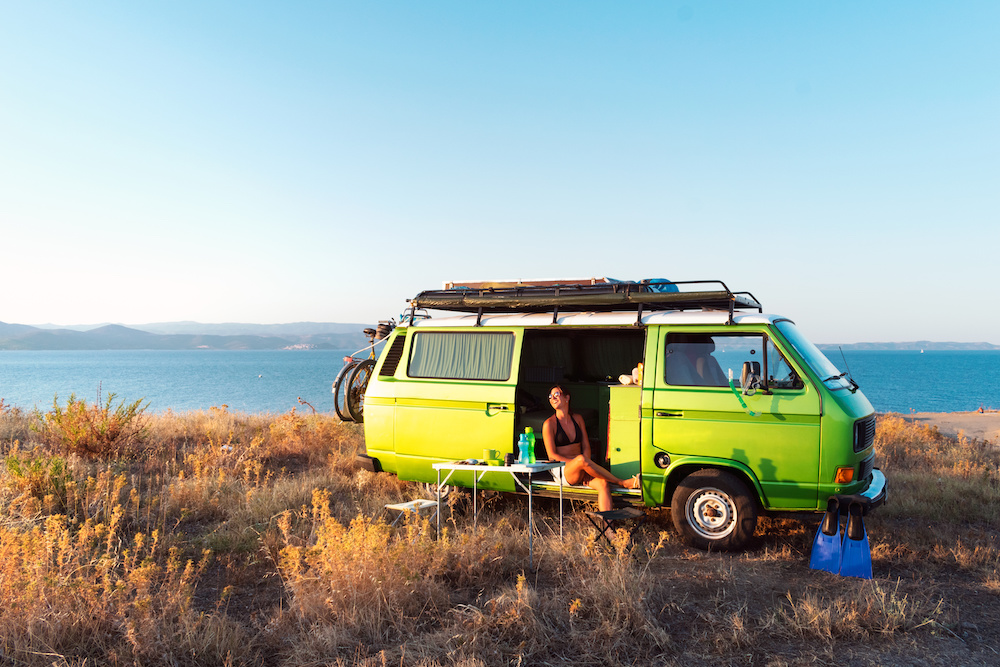
What Are RVs?
There’s no doubt that recreational vehicles are popular for various reasons.
Not only do they give your family tons of livable space, but they also transform an ordinary road trip into a luxury.
RVs are typically larger than camper vans, with some people living in them throughout the year.
The best way to understand the uniqueness of RVs is to consider them as if they were homes on wheels.
You’ll have access to the same luxuries you have in a house but in a convenient package that you can take anywhere.
Instead of opting for traditional camping, you can bring everything you need with you.
The Pros of RVs
Although there are dozens of benefits to camper vans, RVs have an assortment of fantastic benefits to consider.
Let’s dive into some of the most remarkable things these larger vehicles have compared to camper vans.
Luxurious Living
There’s no doubt that RVs are by far the luxurious standard for travelers who want a comfortable experience.
This point is particularly true for modern designs, as they often include dishwashers, laundry machines, full showers, and more.
Depending on what you think you’ll need for your trips, an RV can have an endless number of luxuries.
Some models have extensions that allow you to double your livable space for around 2-6 people.
Others boast queen-size beds, full living spaces, and even complete kitchen facilities.
In a nutshell, you’ll never feel like you’re unprepared in an RV compared to camper vans.
Incredible Space
For as challenging as an RV can be to drive, especially larger models, it can be well worth the stress.
The amount of livable space you have inside these vehicles is exceptional compared to camper vans.
As mentioned, many come with bedrooms, living rooms, dining rooms, and a separate module for driving.
You’ll easily be able to travel with a family of three or more without feeling like you’re living on top of each other.
Also, if you invest in a luxury RV with expandable sides, you’ll have even more space to use.
They are the perfect option for families with pets and children as well, offering plenty of indoor play space when parked.
Plenty of Storage
The additional storage space in an RV is another massive benefit if you know you need plenty of usable storage for camping equipment.
Whether you’re going on a long-distance shopping trip or simply overpack for your journeys, this feature is helpful.
You’ll have more than enough space for your essentials as well as any extras you pick up along the way.
RVs often come with storage under your living space and plenty of spots to keep your gear inside the vehicle.
Many also boast full-size kitchen and bathroom cabinets, helping you bring your luxuries on the road.
Although overpacking can be a hassle with an RV, you can guarantee you will never run out of things you need.
Cost-Effective Travel
Using an RV for your campervan trip might be more expensive than alternative camper vehicle options. Even so, it’s much cheaper than flying.
Considering you’ll have all of the modern luxuries of a hotel in the comfort of your vehicle, it’s an upgraded form of travel.
You’ll be able to save on hotel costs and flights, making gas a considerably easy thing to budget for.
The areas you can explore in an RV are exceptional, even as it’s a cumbersome vehicle to drive.
For instance, you can stay at national parks and different campgrounds around the nation.
Some places even allow RVs to camp on the beach, letting you wake up to the ocean every morning.
Reliability
There’s no doubt that having a reliable vehicle to use when on a long-distance trip is of the utmost importance.
You’ll want a vehicle that’s designed explicitly for miles-long excursions.
RVs have been around for many years and have experienced numerous upgrades over time.
They’re designed to withstand plenty of wear and tear and, in most instances, are more resilient than camper vans.
Although they can be costly to repair, you’re less likely to encounter serious issues while on the road.
Peace of mind comes with using a big RV compared to a smaller-sized camper van.
Camper Van vs RV: Which Is the Better Option?
Deciding between a camper van and an RV has everything to do with the type of trip you want to experience.
If you’re looking for something quick and efficient with fewer bells and whistles, camper vans are ideal.
In comparison, RVs allow you to experience the comforts of home, albeit in a larger package.
It’s also important to note your budget, as camper vans are often regarded as a less expensive option.
However, if you know you’re going to want modern luxuries, such as regular showers, camper vans aren’t the best.
You may find yourself paying for hotel rooms along the way to keep up with your basic needs.
It can be beneficial to list expectations for your upcoming trip to decide between the two.
You may be surprised by the vehicle that will best suit your family’s needs.
Weigh Your Options Carefully
There’s plenty to consider when deciding between a camper van vs RV.
As homes on wheels, RVs are prepared to take on any challenges the road may offer.
Also, they have plenty of comforts that vans simply cannot provide, making them a top-tier option for most people.
Treks with Beks

VANLIFE RESOURCES
Living in a travel trailer vs camper van (pros & cons).
When you start looking into nomadic living, there is one big choice. Travel trailer vs camper van?
By Sawyer Lane

Do you want something you pull behind your vehicle and can leave? Such as a travel trailer, pop-up camper, or even some models of truck campers which can easily be left at camper sites.
Do you want your home to be the vehicle? Such as an RV, School Bus, Van, or camper that cannot be detached.
If you’re not 100% sure, we are here to help!
Below is our detailed list of pros and cons. Some of the pros you will see are also listed on the cons list. There are two sides to every coin. This list will help you figure out what fits your lifestyle so you can make the best choice for you before you make the big purchase!
In This Post Of 3 Reasons To Live in a Travel Trailer vs Camper Van:
Pros to travel trailer vs camper van, you save your spot.
With a van you can obviously put items out such as a camp chair, a folding table, a canopy, or even a tent. But most people are nervous that with minimal stuff left out, it may get stolen and don’t do this. When you have something you can detach, you have a hard shell you can lock that saves your camping spot from anyone who might swoop in and take it while you are out for the day. Until you’ve lived it, you’ll have no idea how cutthroat certain camping areas can be when it comes to securing a spot. Also, a warning to vanlifers, I have been known in a pinch to move those miniature cones that people stick in the middle of the desert to “save their spot,” because at a certain point it’s BLM land, you didn’t purchase temporary real estate there and it’s the government’s (and the taxpayers’) property, so fuck your cone. Point being, be careful where you leave your stuff. People like me might move it and other people might steal it.
Once Parked, You have a Normal Vehicle
I wash windows on the road, and trust me: you won’t want to drive your whole van or bus around, parking lot to parking lot, looking for work. It’s already annoying in an F-150. But, most people don’t do trade work on the road, and having a vehicle that burns less fuel than your whole rig (Bekah drives a Kia Rondo that is great on gas as well as being a little champion) is a huge plus when you want to drive a few hours to see the National Park or waterfall that is out of your way.
More Room (vs a Camper Van)
Unless you have a school bus or a big RV, you’re going to have more room between your trailer and your vehicle (likely a large SUV or a pickup) than you would in a van. Half of the backseat of my truck is a coat closet, for example, and our mountain bikes live in the back of my truck under the home-made topper.
Pros to Camper Van Over Travel Trailer
You can stealth camp more easily.
Unless you have solar panels on top of your vehicle (and even then), it’s hard to judge if someone is sleeping in a van or if they parked it in that parking lot to stay at their friends’ place with a small driveway. Who’s to say?
Your Rig is Smaller
This one is pretty obvious, but the prospects of finding a spot to turn a trailer around versus finding a spot to turn a long-chassis van around are very different. We happen to travel with two vehicles, so we can park the truck and trailer and go “scout car” with our other vehicle, but most people don’t travel with that many wheels and would probably just keep driving if they passed a narrow dirt road that could end without a turnaround.
You Always have Everything
Our best example is the few times we have driven all the way to a national park only to realize that the Parks Pass was in the other vehicle. And, you know, jackets, phone chargers, towels, shoes, skateboards, the dog’s leash, things like that. If everything is in the van, everything is in the van.
Cons to Travel Trailer vs Camper Van
Fuel economy.
No matter what, you’re going to burn more fuel when you’re towing something. Light trailers and fuel efficient, turbocharged trucks are becoming more popular, but it’s not like driving a van (which isn’t like driving a little 4-cylinder either). Either way, fuel is going to become a constant expenditure when you’re on the road.
Finding Parking
Finding a place to accommodate a larger rig can be tough, and turning around can seem impossible sometimes. You should definitely find a way to practice with a small trailer if you’ve never towed anything before.
Maneuvering Small Streets
Driving a big trailer on little streets and busy highways can be very stressful. You have more room to live, but you have more bulk to drive around. You wouldn’t believe how tiny some lanes are. In some rural areas, I can drive the trailer ON the white line and still have my driver’s side wheel over the double-yellow. It’s not a relaxing country drive at that point, and our trailer is only 16’x7’. People with trailers that are bigger than ours (and people with large motor-in rigs) even have to pay attention to bridge heights and avoid parkways. Sometimes, being compact is handy.
Cons to Camper Van Over Travel Trailer
You always have everything.
You have to drive your whole house everywhere. Let’s say you forgot an ingredient in the middle of cooking dinner. We can drive our car back to the store while the other one keeps on cooking. In a van or bus, you have to pack the whole kitchen up or go without whatever you forgot.
Can't "Save" Spots
People might ignore or steal the items you used to “reserve” your camping spot, or you don’t reserve spots at all.
Your Whole Home Breaks Down
If you have any mechanical problems, you don’t have a way to go get parts unless you bring a motorcycle or moped. Our situation is a little different because we have two vehicles, but if something were to require attention on the trailer, you could take the truck to the RV center for parts.
Why we choose Travel Trailer vs Camper Van
In this long time debate we chose, drumroll please, trailer! We landed on trailer for three main reasons:
- When we started our journey, both mine and Bekah’s work were in separate places and we loved the idea of being able to leave our tiny house in the forest and have our cars to go to our prospective jobs.
- We wanted more space without having to commit to always being a giant vessel.
- We didn’t want our vehicle dying to mean our whole home dying. If our truck ever has issues in the future we can always attach the trailer to a new one!

Hi! I’m Bekah, but you can call me Beks, all my friends do! I travel full-time in a tiny home on wheels that my partner, Sawyer, and I built from a cargo trailer shell in 2019. We started out in beautiful Colorado and have been all over the United States over the years. This space is designed to inspire and guide the nature obsessed nomad, weekend warrior, and future roadlifer. I’m so excited you’re here!
WANT TO JOIN VANLIFE?
Get my incredible FREE guide to get yourself prepared for Vanlife!
Final Thoughts on Trailer vs Camper Van
Whatever you decide, you will be having such an amazing time on the road. Sometimes we are envious of people in their vans, and other times we wouldn’t trade our trailer for anything. Picture your lifestyle on the road and see what makes the most sense for you now. People upgrade their rigs all the time because their life circumstances change, so don’t stress too much about it.
Leave a comment below and let us know your thoughts, questions, and person experience in the van vs trailer debate.
Like this post? Pin it for later!

Our Favorite Fulltimer Life Essentials

Sea Eagle 380x Explorer Inflatable Kayak
We wanted a watercraft for a long time, but didn’t quite know what to pull the trigger on. We wanted something that was durable and folded up nice and small. After watching videos of a jeep driving over the kayak and hit it with a hammer, we knew it was the one for us!

ENO SingleNest® Hammock
If you don’t already have a hammock, you really need to get on it! The Eno is a lightweight, packable, and durable hammock perfect for anyone living on the road. We have a single nest because neither of us seem to want to be in the hammock at the same time, but they do make a Double Nest if you are looking to cuddle up with your significant other in it.

MAGZO Magnetic Screen Door
Listen, everyone with photos of their van door wide open has flies. Adding a screen door was an absolute game-changer for us, plus it is attached through velcro so that you can easily remove it when you are ready to take those idyllic photos. If you haven’t hit the road yet, just get one. If you already have, this is the answer to your fly problem, you’re welcome.
Be the First To Comment on Living in a Travel Trailer vs Camper Van (Pros & Cons)
Leave a comment cancel reply, more road life resources.

10+ Ecofriendly Products for Vanlife You Can’t Travel Without

Nomadic Camping: How to Find Free (and Legal) Spots to Park Your Van Overnight

Sunsets, Adventures, and Going with the Flow; the Ups and Downs of Vanlife
NOMADIC INTERVIEWS
RV vs Campervan: Understanding the Differences, Choosing the Right Option [Expert Guide]
Short answer: rv vs campervan.
RV stands for recreational vehicle and is a larger vehicle designed for full-time living. A campervan or camper van is a smaller vehicle, often converted from a van, that can be used for camping and short trips but may not have as many amenities as an RV.
How to Choose Between an RV and a Campervan for Your Next Adventure
Are you planning your next adventure, but confused between choosing an RV or a campervan? Don’t worry; we’re here to help you make the right decision. Both options have their own utilities and benefits, so it’s necessary to consider various factors before selecting one. Below we’ve outlined some factors that would help you make an informed decision.
Space and Storage:
The first thing to consider while making a selection is the amount of space you’ll require for your transportation and storage needs. RVs are typically sized from 20 to 45 feet in length, offering ample living quarters, extra storage compartments, and amenities like shower units, kitchens, bathrooms, and entertainment systems- perfect for long trips with large groups. However, RVs can be cumbersome to maneuver around narrow roads or packed parking lots.
On the contrary, campervans are compact vehicles that offer a comfortable living arrangement ideal for small families or couples who love adventures off-the-cuff. Campervans cater well towards budget travelers as they do not demand any extra expenses like campsites or caravan parks.
Gas mileage:
Transportation cost is another factor to consider between RVs versus campervan travel adventures since fuel efficiency will vary depending on size and weight of the vehicle. Generally speaking class B vans/campers/smaller motorhomes have better gas mileage compared with more extensive Class A motorhomes (RV). So if frequent stops at gas stations creates anxiety for you during road trips- then smaller campervans may be a better choice for longer excursions.
Campsite accessibility:
Another consideration when selecting between these two vehicles related with campground facilities available near-by your planned trip locations?. While both choices provide shelter wherever parking is permitted – keep in mind that most commercial campsites restrict larger Class-A motorhomes due to their size limitations at sites preventing easy ingress/egress or damaging fragile hookups such as water/electric intake/outlets during conjunction/disconnections. On the other hand, the smaller Class-B compact campervans thrive about camping since they can access any campground without worrying much.
Comfort & Amenities:
No matter if you plan to travel short distances or endure long excursions- comfort prevails during every road trip . Typically RV’s boast of luxurious amenities including living room couches, ample bed sizes, private full bathrooms and showers – this expands living space beyond doors towards larger groups taking their desired path towards nature’s beauty. Likewise, campervans are typically versatile providing customizations as per users’ requirements enabling couples to enjoy a cozy night on a plush comfortable bed or dining in with an adequate kitchenette setup inside the van.
After considering all these factors, what vehicle is right for your next adventure ? Ultimately, it comes down to your personal preference regarding your style of exploring Mother Nature. We hope our guide can help navigate which vehicle could be best suited for your upcoming road trips !
A Step-by-Step Guide to Comparing RVs and Campervans
Are you planning to go on a road trip or camping adventure? If so, one of the essential things you would require is an RV or campervan. These vehicles are ideal for those who want to experience the comfort and convenience of home while exploring nature’s hidden gems. However, finding the perfect recreational vehicle can be overwhelming, especially if you don’t know what to look for.
Comparing RVs and campervans can be an intricate process that involves looking at their features, functions, and prices. To avoid confusion and make an informed decision, we have compiled a step-by-step guide that will help make your search easier.
Step 1: Determine Your Budget
Before making any purchasing decisions on RVs or campervans, it is vital to determine your budget. The cost of these vehicles can range from affordable to high-end luxury models that come with all kinds of bells and whistles. Make financial calculations based on the amount of money you’re willing to spend.
Step 2: Analyze Your Needs
It’s important to consider what type of travel lifestyle you’re looking for when it comes to buying an RV or campervan . This includes the frequency in which you plan on taking trips as well as how long your trips typically last.
If there’s only two of you traveling then perhaps something like a Class B motorhome could be perfect for you; small enough to not feel too big but still equipped enough that they don’t feel cramped either.
However if space is great priority then a Class A might fit best; luxurious appointments including extra amenities such as full bathrooms with tubs/shower.
Step 3: Size Matters
RVs and campervans come in various sizes . Some are small enough for easy maneuverability in tight spots while others offer ample living space for large families or groups of friends traveling together.So choosing size according toy our need is important otherwise smaller but does not provide us sufficient space and big rigs restrict on the roads.
Step 4: Features and Amenities
One of the best things about RVs or campervans is that they come with a variety of features, amenities to make your travels comfortable. Make sure to consider what it is you need in terms of features. Some features may include full kitchen, toilets/showers, sleeping quarters and more.Don’t forget power, water tanks; solar/ generator will provide us source of staying off grid.
Step 5: Maintenance Requirements
Maintenance requirements can vary depending on the kind of RV or campervan you choose . It’s important to read up and prepare ahead for maintenance requirements such as oil changes, regular tire substitutions etc..
Step 6: Test Drive One
Once all initial research has been done it is important go give test drive before buying .Ensuring a test drive before making a final purchase helps ensure that your vehicle choice meet the criteria established earlier in step one to step five.
In conclusion, when comparing RVs or campervans for purchase there are many factors that should be considered including budget, lifestyle needs,size ,features & amenities,and even potential maintenance requirements. By following this simple guide, you should have enough information at your fingertips to help select an ideal recreational vehicle so that you’ll enjoy many spectacular journeys with family or friends!
Common Questions About RV vs Campervans Answered
The age-old question of whether to buy an RV or a Campervan can be confusing and frustrating, especially if you’re a new adventurer. In this article, we’ll explore some common questions about RVs versus campervans to help make your choice easier.
What is an RV?
RV stands for Recreational Vehicle. It is essentially a mobile home fitted with essential amenities like a kitchen, bathroom, bedroom and living room. RVs are available in different sizes ranging from 20 feet-long Class B camper vans to 45 feet-long Class A buses.
What is a campervan?
A campervan refers to any kind of vehicle that’s been converted into a mini-camper. Often the interior is stripped out from the rear seats back and then rebuilt with insulated walls, flooring and fitting it out into small sleeping quarters as well as basic cooking facilities. It could be anything from an old VW vanagon to a large Mercedes Sprinter Van.
Which Is More Expensive – An RV or Campervan?
Cost can vary greatly among various makes and models of each type of vehicle so generalisations need to be taken into account when considering cost between both options:
Generally speaking, purchasing an RV will usually turn out much more expensive than buying a campervan because you pay for all of the extra space that comes along with it. What’s more, maintenance costs can be quite high if something goes wrong with an RV because they are very complex machines over campervans which tend to have relatively simplistic systems..
On the other hand converting your own campervan using technology such as solar panels & composting toilets can offer great savings whilst being self-sufficient! This saving means there are several low-priced used vehicles available on the market that you could convert yourself at ease.
How Easy Are They To Drive
If size concerns you when deciding whether to purchase an RV or Campervan,then Campervans are known for being smaller and more compact; therefore, they are easier to drive than most RVs. However, the larger a campervan is, will affect this factor too.
RVs are considerably larger vehicles when compared to campervans and typically come with longer turning radiuses and require greater care when maneuvering. That said though, it mostly depends on what you’re comfortable driving.
What Is Better On Gas – An RV or Campervan?
RVs usually consume much more gas than campervans because they are much heavier-weighted machines. Depending on the class of RV that you purchase – Class A motorhomes being heaviest in particular — expect to get around 7-8 miles-per-gallon (mpg) whereas campervans can be oh-so-efficient at getting around 20mpg.
Which is More Comfortable to Sleep In: An RV or Campervan?
RVs offer a great deal of comfort in regards to sleeping as there’s often room for multiple inhabitants and adjustable beds that can be set up as per your requirements. Here, comes the versatility of an RV mean that you could have all sorts of different arrangements available from king size bedrooms areas with wardrobes down to custom bunk areas for kids.
However in comparison, campervans often have compact sleeping spaces which make them ideal for solo travelers or couples who don’t need too much sleeping space. Though worth noting here however is customization here has become a big trend where people convert vans into living essences which means there's plenty of opportunities and ideas out there so every travellers needs are met.
So Which Is Best: An RV or Campervan?
If money is not an issue then buying anas purchasing an RV offers plenty of storage space and home comforts that you�d find akin to living such as satellite TV units, outdoor showers and washer-dryers. However if you are someone wanting to be cost effective, custom modification allows more flexibility in affordability and functionality with this being the main draw for campervans . Additionally, A lot comes down to personal preference so make sure you look up a few rentals online or watch some videos beforehand to determine for yourself.
In conclusion, Both an RV or campervan can offer great opportunities out on your adventures ! Depending on your budget, travel plan intentions and personal requirements / preferences choosing one over the other becomes easier when weighing up pros/cons.
Top 5 Facts You Need to Know About RVs and Campervans
The world of RVs and campervans can be a bit overwhelming for beginners or those who are only familiar with traditional modes of transportation. However, there are certain facts that everyone interested in RVs and campervans should know to make informed decisions when purchasing or renting one. In this article, we’ve compiled the top five things you need to know about RVs and campervans.
1) There’s an RV or Campervan for Every Lifestyle Whether you prefer luxury, adventure or simplicity, there’s an RV or campervan out there that suits your lifestyle. From compact van conversions perfect for weekends away to spacious motorhomes with all amenities included, the range of options is vast. Additionally, there are models specifically designed for families with children, retirees traveling full-time and even eco-conscious travelers. Whatever your preferences may be, do some research before investing in this type of vehicle.
2) Regular Maintenance is Essential Regular maintenance is essential when it comes to keeping your RV or campervan running smoothly . Like any vehicle, they require periodic oil changes and tune-ups in order to ensure optimal performance during each trip. This includes regular inspections of all mechanical components such as wheels, brakes, air conditioning systems etc., as well as ensuring safety features like smoke detectors work efficiently.
3) Storage Can Be Challenging When owning an RV or campervan, storage can often be a challenge – from keeping your personal belongings organized while on the road to finding suitable storage space when not in use. Luckily however many campsites offer secure storage facilities making it easier than ever before now to store them when not in use if you live somewhere urban where there’s no place easily available.
4) You Have Your Own Mobile Accommodation Perhaps one of the best aspects of owning an RV or camper van is having your own mobile accommodation wherever you go – all over country/world! With kitchen appliances like cookers/ovens that are built-in, such vehicles come with many comfort features so you don’t have to worry about the expense and hassle of finding/paying for a place to stay . All you need is enough space and maybe an electrical hookup.
5) These Vehicles Can Hold Their Value Finally, it’s worth noting that RVs and campervans can hold their value well over time. This is especially true when properly maintained with regular servicing by qualified RV/campervan specialists. As the popularity of outdoor travel increases day by day, these vehicles remain in high demand, enabling owners to resell them easily in case of changing lifestyles or financial situations.
In conclusion, RVs and campervans offer unlimited opportunities for adventure – whether full-time or just for the long weekends! Just remember to do your research before buying if they suit your lifestyle needs – this list will greatly ease up any confusions buyers might have beforehand! Happy Campers!
The Pros and Cons of Owning an RV vs a Campervan
If you’re a lover of the great outdoors, then you’ve probably thought about owning an RV or campervan at some point in your life. These vehicles provide owners with the freedom to explore, have endless adventures and enjoy the beauty of nature without adhering to strict schedules or relying on hotels. However, as much as these vehicles are similar, they do have some differences that make each unique in terms of convenience and comfort. Here’s a detailed look at the pros and cons of owning an RV vs a campervan.
The Pros of Owning an RV:
1. Space: One major benefit that comes with owning an RV is the ample space it provides. RVs come in various sizes, ranging from large motorhomes to smaller travel trailers, but whatever their size may be, they all offer adequate living space for families or groups of friends. An RV is great if you want plenty of room to move around and can accommodate big groups better.
2. Comfort and convenience: When it comes to comfortability, nothing beats an RV. The larger size means there’s more room for comfortable seating options such as sofas and recliners which can make long road trips feel like luxurious journeys rather than just transportation methods.
3. Amenities: Modern-day RVs come equipped with most amenities you would find in your home such as a refrigerator, microwave oven, TV set among others making camping trips more bearable especially during rough weather conditions.
The Cons of Owning an RV:
1. Cost: As expected having all that extra space in a vehicle will come with additional costs when driving fuel consumption wise or maintenance services like tires and features updates since large floorplans with multiple rooms come at a premium price especially when purchasing new ones.
2. Maneuverability: Driving such big rigs on crowded highways or through narrow streets becomes increasingly difficult especially around residential neighborhoods because if left unattended they might block traffic leading to fines by local law enforcement officers.
The Pros of Owning a Campervan:
1. Affordability: If you’re looking to take your adventures on the road without breaking the bank, then a campervan could be the right choice for you since they are generally cheaper than traditional RVs because they are smaller so what money saved from getting this option may lead to upgrades in technology like solar power and an internet-enabled dashboard.
2. Maneuverability: Another significant benefit of owning a campervan is its maneuverability, which comes as an excellent advantage for anyone who loves driving narrow and winding roads and parking almost anywhere without causing disturbances or inconveniencing other drivers.
3. Convenience: A campervan provides one with all basic camping essentials such as camping chairs, tables among others packed inside hence packing can be done hastily compared to RVs where everything must be accounted for before leaving.
The Cons of Owning a Campervan:
1. Limited Space: As much as space was counted as an advantage in RVs, in campervans it’s limited making comfortable living arrangements difficult especially if traveling with young children or friends/family members that snore their way through the night haha.
2. Basic Amenities: Campervans are designed to offer essential amenities only for survival purposes like stove tops/sinks thus not providing luxury mode comfort options seen in an RV environment such as state-of-the-art appliances, entertainment systems among others.
In summary here’s what I would say about making the choice between an RV vs. a Campervan: If your dream vacation includes luxury accommodations kitchen facilities and large groups then go with an RV however if adventure is more important than comfort though staying within budgetary constraints then a campervan will provide adequate settings at motion value while still facilitating travelers’ needs.
Whichever you choose – have fun!
An Insider’s Look at the Differences Between Driving an RV vs a Campervan
As a seasoned road warrior, I’ve had the pleasure of driving both RVs and campervans. They may seem similar at first glance, but there are key differences between the two that can greatly affect your travel experience . Here’s an insider’s look at what it’s like to drive these behemoths on the open road .
First off, let’s define our terms. An RV generally refers to a larger vehicle that is specifically designed for long-term living on the road. They come equipped with all the amenities of home, including a bathroom/shower, kitchen appliances (a stove or oven), complete with comfy sleeping quarters, and ample storage space for extended trips . A campervan, on the other hand is typically smaller than an RV that has been adapted into a miniature living space, housing only the essentials—usually just bedding and basic electronics—in order to make camper life functional without going overboard.
Now let’s dive in.
One of the biggest differences between driving an RV vs a campervan is size. Simply put, RVs are giant compared to campervans—not just longer but wider as well! Plus, they’re also taller (with height restrictions!) which can create issues if you need to enter city centers or navigate narrow roads. Conversely, Campervans allow you more flexibility when trying out different routes or even pulling up alongside curbs for loading and unloading purposes.
Another distinguishing factor worth noting is weight: Camping vehicles are much lighter overall than their “RV” cousins since they carry fewer supplies and take up less space—the latter being particularly important when it comes time for parking.
Driving-wise: When you’re behind the wheel of an RV it’s entirely a different story – with so many bells and whistles onboard (between custom material finishes as well as luxury cabinetry). These massive machines also require some serious maneuvering skills especially in tight spots; because having rearview mirrors completely blocked by the rest of the RV makes driving in reverse difficult. Compare this setup to a campervan , which is often toughened up through additional roof racks or storage space outside but still maintains manageable dimensions so that parking and getting around town don’t pose too much difficulty.
If you’re looking for ultimate comfort on the road , an RV might be your go-to option. With much larger and spacious interiors however comes difficulty when trying to drive through smaller towns or cities with narrow streets. A campervan boasts a more intimate yet efficient living area with less living space but more flexibility in finding camping spaces.
In conclusion, while both types of camper vehicles can make for a great adventure, it all depends on what you’re looking for in an ideal travel experience. If luxury and maximum living space is important to you, I’d recommend going with an RV—just be prepared for the challenges that come along with driving one on transit roads ! On the other hand if being nimble and flexible are more your style, then perhaps a campervan might be your best bet!
Table with useful data:
Information from an expert.
As an expert on the subject, I can confidently say that there are several differences between RVs and campervans . RVs tend to be larger and come equipped with more amenities, such as full-sized kitchens and bathrooms. They’re also designed for long-term travel and living, making them a great choice for retired couples or families on extended vacations. Campervans, on the other hand, are smaller and more nimble, making them better suited for weekend getaways or quick road trips . They’re often more affordable than RVs and can be easier to park and maneuver in tight spaces. Ultimately, the decision between an RV or a campervan comes down to your specific needs and preferences.
Historical fact:
The first recreational vehicle (RV) was built in 1910 by Pierce-Arrow Motor Car Company, while the first campervan or Volkswagen Type 2 was developed in 1950s by Westfalia-Werke.
Related Posts
Short answer: Campervan rentals in Salt Lake City allow travelers to explore Utah's unique landscapes…
Short answer: Campervan rental in Michigan allows travelers to experience the state's scenic beauty with…

5 Tips for Choosing the Perfect Campervan Awning [Plus a Personal Story]
Short answer: A campervan awning is an accessory that provides shade and shelter outside the vehicle. It attaches to the side of a campervan and…
Terms and Conditions - Privacy Policy
A guide to the 8 types of RV explained, from Class A to camper vans
- RV sales have been increasing as people have started looking for ways to travel during the summer while still social distancing.
- There are several RV and RV trailer types available on the market.
- For those looking to purchase or rent an RV for summer trips, here's a guide explaining the different RV class and trailer types.
- Visit Business Insider's homepage for more stories .

RVs and RV trailers are no longer just for older folks looking for post-retirement travel plans or suburban families looking for a summer getaway.
RV sales started skyrocketing when states started their first rounds of lifting stay-at-home orders. And now, RV interests have been hitting new customer segments, such as millennials looking to fulfill their "digital nomad" dreams.
But for first-time home on wheels buyers and renters, the RV and RV trailer market may seem daunting.
Each RV and trailer type differs from the other in size, floor plan, weight, and design to fit the needs of different customers. For example, large toy hauler trailers allow families to bring both their children and their ATVs and kayaks on the trip. But other trailer types, such as the teardrop, may not even include an interior kitchen due to its smaller size.
Whether you're looking to purchase your first RV, or you've been browsing RV rental platforms Outdoorsy and RVshare for a weekend RV getaway here's a list of different RV and trailers, explained:
Class A: the largest RV.
Class A RVs are the largest of the three RV classes.
According to Outdoorsy , Class As are typically built on a diesel or gas-powered vehicle, commercial truck, or commercial bus chassis. This expansive size allows its interior to have the same amenities as any traditional foundation-based home, although this often means it can be the most expensive RV type.
Because of this, the Class As are a popular choice for people who want a luxuriously large RV for full-time living on the road, according to General RV .
Class B: the smallest RV.
The Class B is the smallest motorhome of all three classes.
This segment is commonly otherwise known as a camper van or a converted van. It's also currently popular among many millennials looking to pursue #VanLife , and recently, many van conversion companies have seen a skyrocketing request in builds .
Because Class Bs are often small, the vehicles typically don't include the same spacious amenities as a Class A. However, it's still possible to have the kitchen, bathroom, bedroom, and dining area basics with the right floor plan by being creative and integrating multi-purpose furniture, such as a dining table that can be flipped into a sleeping space.
Related stories
Class B's are also easier and cheaper to operate and don't require any kind of special driver's license.
Nowadays, many Class B RVs in the US are built on Ford Transits, Mercedes-Benz Sprinters, and Ram Promasters.
Class C: the in-between RV size.
As counterintuitive as it is, the Class C RV is smaller than a Class A, but bigger than a Class B.
Class Cs are known as "versatile" RVs that have more space for amenities and beds with its average length sitting between 20 to 31 feet, according to Outdoorsy . The class can also often be identified by the over-cab sleeping area, according to Expedition Motor Homes .
Class C RVs are often built on the chassis of pickup trucks or vans, making it more fuel-efficient and less expensive than the Class A.
Pop-up camper: the camping tent on wheels.
Pop-up campers are towable units that can be expanded by unfolding its sides, which are often made of canvas, according to RVshare . This makes it similar to a more structured, above-ground camping tent that's more affordable than other RV or trailers, according to Outdoorsy .
And because the pop-up campers have lightweight foldable components, they can often be easily towed.
Pop up campers typically range between eight feet to 16 feet, although this size expands when the roof is popped up and unfolded, according to Popup Advice .
Travel Trailer: the most popular trailer.
The travel trailer category is relatively broad, but this versatility means it can fit many sizes, floor plans, amenities, and budget requirements that customers may have. According to Thor Industries , it's also the most popular towable with a length between 13 to 40 feet.
Travel trailers often require a pickup truck, SUV, or van with a hitch to be towed, according to Outdoorsy .
Fifth Wheel Trailer: the largest trailer.
Fifth wheels are the largest RV trailer segment available and can often be identified by its raised extension like that of an over-cab in the Class C RV segment. This extension then hangs over and attaches to the vehicle that is towing it, which is often a pickup truck, according to Thor Industries .
Fifth wheels average between 25 to 40 feet. Due to this size, fifth wheels often have plenty of space for rooms and amenities. This also makes it a good trailer for those who want to travel with a larger group of people or folks who plan on camping at a single site for a longer time.
Teadrop Trailer: the tiny rounded trailer.
Teardrop trailers fall on the lighter and smaller end of the RV trailer spectrum, according to Camp Addict . Because of this, the pint-sized trailers can often be easily towed, although the interiors won't be as decked out with amenities as a Class A RV.
To accommodate this, teardrop makers have to be creative, either by offering a larger trailer size and floor plan, or using pull-out units and tables — such as a pull-out kitchen — to utilize the exterior space of the trailer.
Toy Haulers: the trailer that has room for extra outdoor or water toys.
Toy haulers are built like a home on wheels with a large garage to store outdoor gear and toys like motorbikes, snowmobiles, or kayaks.
However, it's not technically its own trailer segment. Toy haulers — which are generally 21 to 40 feet long — often come in the form of a travel trailer, fifth wheel, or one of the motorhomes, according to Thor Industries .
Watch: How long will social distancing last? It's complicated.
- Main content

Motorhome Vs Travel Trailer: Pros and Cons
By: Author Zachary Friedman
Posted on Last updated: March 7, 2024
Categories Motorhomes and RVs
Home » Camping » Motorhomes and RVs » Motorhome Vs Travel Trailer: Pros and Cons
RVs come in a wide range of designs. In this guide, I’ll outline the differences and list the pros and cons of camping in a motorhome vs travel trailer. I’ll cover comfort, space, amenities, ease of driving, price, maintenance, fuel efficiency, and much more. I’ll also talk a bit about the different classes of motorhomes and types of travel trailers available.
Generally, motorhomes are easier to drive and easier to set up. They offer more luxurious amenities. Motorhomes also allow you to tow a trailer. Travel trailers are cheaper and lower maintenance.
Motorhomes are the better choice for luxury travelers, full-time RV living, those who need to tow a trailer, and frequent campers. Travel trailers are the better choice for those on a tight budget, those who already own a tow vehicle, off-road campers, and those who only camp occasionally.
Over the past 10 years, I have camped both types of RVs extensively. I prefer motorhomes because you can pass between the cab and living space. It’s convenient. In this guide, I’ll share my experience.

Motorhome Pros
- Easier to drive
- The amenities are accessible while you drive
- Motorhomes are more luxurious
- More storage space
- Setting up and breaking down camp is faster and easier
- You can tow a trailer
- Passengers can ride in the living space
- Motorhomes are better for camping with kids and pets
- More comfortable in poor weather
Motorhome Cons
- Motorhomes are more expensive
- Motorhomes require more maintenance
- Can be less spacious
- It’s hard to drive around for sightseeing unless you bring a tow vehicle
- Less fuel efficient
- Motorhomes depreciate faster
Travel Trailer Pros
- Travel trailers are cheaper
- Less maintenance is required
- Can be more spacious
- You can unhook it and have a separate vehicle to drive around camp
- More fuel efficient
- Trailers don’t depreciate as fast
- More versatile
- Better for off-road camping
Travel Trailer Cons
- Harder to drive
- Less comfortable during travel days
- Lower quality fittings and fixtures
- Less storage space
- Setting up and breaking down camp is more time-consuming
- Harder to park
- Passengers can’t ride in the trailer
- Not less convenient for traveling with kids
- You have to go outside to pass between the cab and living space
Motorhome Classes

A motorhome is an RV with both a living space and an engine. It offers both transportation and accommodation in the same vehicle. There is a steering wheel and gas pedal as well as a bed, kitchen, and bathroom built in. You can walk between the cab and the living space.
Motorhomes come in three classes: Class A, Class B, and Class C.
- Class A motorhomes: Class As are the largest and most luxurious type of motorhome. They measure anywhere from 25 to 45 feet long. They are built on heavy-duty commercial truck chassis. They are basically a bus.
- Class B motorhomes : Class B RVs are the smallest of the three motorhome classes. They usually measure between 18 to 24 feet long. These motorhomes are built into a van. They are sometimes called camper vans.
- Class C motorhomes: Class C RVs are kind of a cross between class As and Bs. They range from 20 to 35 feet in length. These RVs are built on a cutaway van chassis with a fiberglass or aluminum box built on the back. Class C RVs are recognizable by their cab-over bed.
Motorhomes offer a wide range of amenities. Most motorhomes come with multiple sleeping spaces, a full kitchen, a full bathroom, an entertainment system, and some built-in storage space. Most motorhomes can accommodate 4-8 people.
Some popular motorhome manufacturers include Winnebago, Thor, Fleetwood, Tiffin, Newmar, Coachmen, and Four Winds.
For more in-depth info, check out my guide to Class B Vs Class C motorhomes and Class A Vs Class C motorhomes .
What is a Travel Trailer?

A travel trailer is a towable RV. Travel trailers attach to a tow vehicle with a ball hitch. Travel trailers can measure anywhere from 10-40 feet in length. They weigh between 1,000 and 12,000 pounds, depending on the size.
Travel trailers come in a wide range of shapes, sizes, and designs Different models offer different amenities and features. Some common types of trailers available include teardrop trailers, pop-up trailers, fifth-wheel trailers, toy haulers, and off-road trailers. Travel trailers are also known as caravans, campers, or towable RVs.
Unlike motorhomes, travel trailers need to be pulled by a tow vehicle. They don’t have their own motor. Larger trailers require a full-sized pickup truck, van, or SUV to tow them. Smaller trailers can be pulled with a compact truck, SUV, or even a sedan in some cases.
When you reach the campground or RV park, you can unhitch the trailer. This allows you to use the tow vehicle to go sightseeing or run errands without the RV.
Travel trailers come with a range of amenities. Smaller models may only come with a sleeping space. Mid size models may have a kitchenette and a wet bath. Larger models come with full-size beds, a fully equipped kitchen, a full bathroom, a living space, a dining space, an entertainment system, outdoor amenities, storage space, and more.
Small travel trailers trailer accommodate 2-4 people. Larger trailers can accommodate 6-10 people.
Motorhomes Vs Travel Trailer s

Ease of Driving
Motorhomes are easier to drive than travel trailers. The driving experience is similar to driving a large truck or van. If you’ve driven a moving van, you can drive a motorhome.
Motorhomes are easier to drive for a few reasons. First, they are shorter than a travel trailer and tow vehicle combo. It’s easier to maneuver a shorter vehicle. Motorhomes also don’t require towing (unless you bring a boat or tow vehicle). This makes them easier to back up. You don’t have to worry about trailer sway. Turning is easier as well. If you don’t have experience with driving with a trailer, a motorhome is easier to drive.
Travel trailers can be a bit harder to drive because they require towing. There is a learning curve to towing. You have to learn how to turn correctly so you don’t cut a corner. You have to learn how to balance the trailer so it doesn’t sway. Wind can also cause sway. A sway bar can help. Backing is also more difficult with a trailer. It’s kind of counterintuitive.

Some people find driving with a travel trailer to be easier. The reason is that the driving experience is more familiar. You’re driving a regular pickup or SUV. Motorhomes can have different control placements. Particularly class A motorhomes. Many people also find 5th wheels to be easier to maneuver than standard travel trailers. Personally, I find that driving a motorhome is easier.
Of course, the size of the motorhome or travel trailer also plays a big role in how difficult it is to drive. Driving a class B camper van is the same as driving a standard van or SUV. Driving a class A motorhome is like driving a bus. Towing a small teardrop trailer is much easier than towing a 40 foot fifth wheel.
One of the main reasons I prefer motorhomes is because they are easier to drive. I really don’t like driving with a trailer.
Winner: Motorhomes are often easier to drive than travel trailers.

Travel Days
Travel days in a motorhome are much more comfortable and convenient. The reason is that motorhomes allow passengers to move freely in the living space and access the amenities while on the move. The bathroom, kitchen, beds, living area, dining area, and entertainment systems can all be used while the driver is driving.
This makes the journey much more enjoyable for everyone. If someone has to use the bathroom, they don’t have to wait until the driver pulls over. They can just get up and go. If someone wants to grab a drink or a snack, they can go to the fridge. The passengers can chat with the driver or bring them a snack. This makes motorhomes the best choice for long road trips.

Travel days with a travel trailer are a bit less convenient. Everyone has to ride in the tow vehicle. In most jurisdictions, it’s illegal to ride in a trailer while it is being towed. Even if it is allowed, it’s best not to have passengers in the trailer while driving because it’s dangerous.
This means the amenities in the trailer are not accessible during travel days. If someone needs snacks, wants to rest, or needs to use the bathroom, you will have to pull over and find a place to park. This means you’ll have to stop more frequently, which makes travel times longer. It’s also a hassle to find a place to park a large trailer.
Winner: Travel days are more comfortable and convenient with a motorhome.
Interior Living Space
Both motorhomes and travel trailers come in a wide range of sizes. There are compact teardrop trailers and Class B motorhomes that can only fit 1-2 people. There are also 40 foot fifth-wheel trailers and Class A motorhomes that can accommodate 6-10 people.
Travel trailers are usually more spacious than comparably sized motorhomes. This is because they don’t have a cab and motor taking up space. The entire interior space can be used as a living space.
Large travel trailers offer the most spacious interiors of all RVs. They come with separate living, dining, and sleeping areas, as well as full-size kitchens and full bathrooms. These trailers feel like an apartment on wheels.
Fifth-wheel trailers have high ceilings and multi-level floor plans. There is a room over the truck bed. This is usually a private bedroom. Large trailers also offer slide-outs to increase the interior space. This makes trailers ideal for large families.

Motorhomes are a bit smaller inside. Depending on the class and design, the cab and motor could take up around 5 feet of space. Motorhomes often feel a bit less spacious than travel trailers for this reason. They offer the same amenities but feel a bit more cramped.
Large class A motorhomes can be roomy. They often feature multiple slide-outs. This significantly increases the interior space. Class A motorhomes usually have a separate living area, kitchen, and bedroom.
There are also small teardrop trailers and pop-up trailers and class B motorhomes. These RVs usually only have a bed and kitchenette. Some have a bathroom while others don’t.
Winner: A large travel trailer is more spacious than a large motorhome. Both are available in a range of sizes.
Features and Amenities
Motorhomes and travel trailers offer similar amenities. The amenities vary based on the size and class of the RV.
Both types of RVs have come with kitchens that include a refrigerator, stove, sink, countertop space, and cabinetry. Larger models may include an oven, microwave, and dishwasher.
As for the sleeping space, motorhomes and travel trailers offer a queen or king sized bed. Smaller models may only have a convertible dinette or sofa. Larger RVs have a large permanent sleeping space in addition to convertible spaces.
Most RVs come with a bathroom with with a toilet, sink, and shower. Some smaller models, like Class B motorhomes or teardrop trailers, may not have a bathroom. Some just have a wet bath.

Many larger RVs come with outdoor amenities such as a retractable awning, an outdoor kitchen, and external storage compartments. Larger RVs also come with some type of entertainment system including TVs and surround sound. These features are common on both motorhomes and travel trailers.
Class A motorhomes often come with a built in generator. Large models may have a washer and dryer. These features are not common in travel trailers.
I enjoy all of the features and amenities of motorhomes. It’s nice having a home away from home. Having a full kitchen is really important for me.
Winner: Both a motorhome and a travel trailer offer the same amenities. The amenities offered will vary depending on the size of the RV.
Luxury and Comfort
Motorhomes are more luxurious than travel trailers. Class A motorhomes are the most luxurious type of RVs. They usually feature a higher-end fit and finish. They use premium materials like granite or quartz countertops, hardwood cabinetry, tile flooring, and leather upholstery. They are often equipped with top-of-the-line appliances, mattresses, and entertainment systems. They may also come with luxury features like heated floors, jetted bathtubs, and even on-board washer and dryers.

Travel trailers usually are usually built from more budget-friendly materials. The fit and finish may not feel quite as luxurious. The appliances and furnishings may be more basic. Cheaper materials may be used for the flooring, countertops, and upholstery. The light fixtures and faucets may be lower-end.
It’s important to note that there are exceptions. Fifth-wheels can be just as luxurious as class A motorhomes. Class C motorhomes often have a similar build quality to travel trailers.
Winner: In general, motorhomes are more luxurious than travel trailers.
Storage Space
Motorhomes offer a good amount of storage space. Class A motorhomes have a ‘basement’ storage area. This is a large compartment under the living area. This space is perfect for stowing bulky items like outdoor furniture, bicycles, firewood, a generator, etc. You access the basement storage through hatches in the sides of the RV. Class C motorhomes have smaller exterior compartments.
Inside a motorhome, you’ll find cabinets and closets for storing clothes, food, and other essentials. There may also be some hidden storage compartments, such as under the bed.
With a motorhome, you can also tow a trailer. This can add more storage capacity. You could tow a large cargo trailer and carry whatever you need.
Travel trailers often have less built-in storage space. There are cabinets and closets inside but there are usually fewer exterior compartments.
One advantage of travel trailers is that you can use the vehicle for storage space. If you’re towing with a pickup truck, the truck bed is free. You could also mount a roof rack on your vehicle for more space.
Smaller RVs, such as Class B motorhomes or teardrop trailers, don’t offer much storage space. You will have to be more selective about what you pack if you use a small RV. Some models are compatible with roof racks. These can expand the storage space.
Winner: Motorhomes usually offer more storage space than travel trailers.
Getting Around While Camping
One of the biggest advantages of travel trailers is that you have a separate vehicle to drive around. Once you’ve set up camp, you can unhitch your trailer from your vehicle. This leaves you with a regular pickup truck or SUV to drive around when you go sightseeing or run errands. This makes it much easier to explore.
With a motorhome, you’re stuck with a large vehicle. Finding a place to park a motorhome is a challenge due to its large size. It’s also more stressful to drive a large vehicle through cities or in tight spaces. You might not want to go out exploring as often.
To solve this problem, many motorhome owners tow a smaller vehicle behind the motorhome. This tow vehicle is often referred to as a “toad”. You can leave the motorhome parked at the campsite and use the smaller vehicle for sightseeing or running errands.
There are drawbacks to this. Towing a vehicle behind a motorhome makes the motorhome a bit harder to drive. Also, not all vehicles can be towed due to the design of their transmission. Towing can damage some vehicles.
This is one thing I don’t like about motorhomes. It’s a hassle to go sightseeing. I bring an e-bike with me for transportation.
Winner: It’s easier to get around camp with a travel trailer because you have a separate vehicle to drive around.
Motorhomes are more expensive than travel trailers. A small Class B or C motorhome may start at around $60,000. Mid-range models go for $80,000-$150,000. High-end Class A motorhomes cost $250,000 to $1 million or more.
Travel trailers are more affordable. Small travel trailers, such as pop-up campers and teardrop trailers, start at around $12,000. Mid-range models go for $40,000-$80,000. Larger, more luxurious models such as fifth wheels, can cost $100,000-$150,000 or more.
Motorhomes are more expensive because they are more complex. They have an engine and drivetrain. They are motor vehicles. This increases the manufacturing cost substantially.

If you go with a travel trailer, it’s important to factor in the cost of a tow vehicle. A vehicle that is suitable for towing, such as a heavy-duty pickup truck or large SUV, can cost $40,000-$80,000 or more. There are smaller and more affordable vehicles that can tow smaller trailers. Of course, you can always buy used to save some money.
If you’re on a tight budget, a great way to save money on an RV is to buy used. RVs depreciate quickly.
Winner: Travel trailers are cheaper than motorhomes.
Maintenance
Both motorhomes and travel trailers require regular maintenance.
Motorhomes require more maintenance than travel trailers. This is because a motorhome has a motor and drivetrain components that require regular maintenance. They are vehicles. On a motorhome, you’ll have to regularly change the oil, air filters, belts, etc. If you tow a vehicle with your motorhome, you’ll have to maintain that vehicle as well.

Because they don’t have an engine, travel trailers are lower maintenance. There is still maintenance you’ll have to do. You’ll have to maintain the brakes, wheels, tires, and lights. You’ll have to regularly maintain the HVAC, plumbing, electrical systems, and appliances. You’ll have to inspect the roof and seals to prevent water damage and leaks. These are maintenance jobs that all RVs require.
Winner: Travel trailers require less maintenance than motorhomes.

Gas Mileage
Motorhomes get worse gas mileage than a truck towing a travel trailer. On average, Class A motorhomes get 6 to 10 miles per gallon. Smaller class B and C motorhomes can get around 10-12 mpg. Diesel motorhomes can get better gas mileage than gas models.
The weight and size of a travel trailer significantly reduces the gas mileage of the tow vehicle. A big truck towing a large travel trailer or 5th wheel may only get 8-10 mpg. A fuel-efficient tow vehicle with a lightweight travel trailer may get 12 to 15 mpg. You’ll get a bit better gas mileage if you tow with a diesel truck rather than a gas truck.
If you want better fuel efficiency, you’re best bet is to use a small, lightweight, and aerodynamic trailer such as a teardrop trailer or pop up trailer. Pull the trailer with a fuel-efficient vehicle, like a hybrid SUV. You could achieve over 25 mpg this way.
Fuel efficiency plays a major role in the cost of ownership of your RV. Imagine you’re taking a 1,000 mile trip. If you drive a motorhome that gets 10 mpg, you’d need 100 gallons of fuel. At $3.50 per gallon, that’s $350. If you use a travel trailer and your tow vehicle gets 15 mpg, you’d only need 67 gallons of fuel. This would cost you $235 at $3.50 per gallon. You would save $115 on this 1,000-mile trip alone. Over the life of the RV, you could save thousands of dollars in fuel.
Winner: It’s hard to pick a winner in this category because fuel efficiency varies so much. In most cases, you can get better fuel efficiency when towing a travel trailer.
Campsite Set-up and Breakdown With an RV or Travel Trailer
Setting up a motorhome when you reach your campsite is faster and easier than setting up a travel trailer. Most large motorhomes come with an automatic leveling system. If your motorhome doesn’t have automatic leveling, you’ll have to do it manually.
Once your motorhome is leveled, you’ll hook up to water, sewer, and electricity if the site has them. Next, you’ll open your slide-outs. If you’re traveling with a towed vehicle, you’ll also need to unhitch it and park it. The breakdown process is pretty much the same in reverse.

Setting up a travel trailer is often a bit more time-consuming. First, you’ll have to park the trailer. This can be a challenge if you have a large trailer or if you’re an inexperienced driver. Backing a large trailer into a tight campsite is difficult.
Next, you need to unhitch the trailer from the tow vehicle and stabilize it with jacks. Most trailers require manual leveling. Finally, you can hook up the utilities and extend the slide outs.
Breaking down the campsite is pretty much the same in reverse. You’ll also have to hook the trailer back up to your tow vehicle. Unhooking and hooking the trailer is a step you don’t need to deal with when you drive a motorhome.
Setting up and taking down camp is my least favorite part of camping. I love being able to pull up to camp in my motorhome and just start cooking a meal.
Winner: Motorhomes make setting up and breaking down camp a bit easier.
Motorhomes are easier to park than travel trailers. This is mostly due to their shorter length. They require fewer parking spaces. A Class B or a small class C motorhome can fit in a standard parking space. Class As and larger class Cs take up multiple parking spaces. Motorhomes are also easier to back up because they don’t have a trailer.

Travel trailers are harder to park. The combined length of a trailer and tow vehicle make it hard to find a spot that is large enough. You’ll need multiple parking spaces. The trailer also makes backing up more difficult. Backing into a tight parking space with a trailer requires some skill.
There are some major drawbacks to driving an RV that is hard to park. First, you’ll waste more time just looking for parking. Driving an RV that is difficult to park also makes it harder to be spontaneous. You need to plan stops more carefully. Having to find parking for a large RV can be anxiety-inducing. You can’t just pull over and grab a coffee. You have to consider where you’re going to park.
I prefer smaller motorhomes because they are easy to park. I spend some time in cities. It’s much less stressful parking a small rig.
Winner: Motorhomes are often easier to park than travel trailers.
Off-Road Driving With a Travel Trailer Vs Motorhome
Travel trailers can perform better off-road than motorhomes. There are trailers that are specifically designed for off-road use. These are usually called off-road trailers or overlanding trailers.
These off-road trailers feature a reinforced chassis, higher ground clearance, heavy-duty off-road tires, and sometimes even independent suspension. These features make off-road trailers capable of negotiating surprisingly rough terrain.

You can tow these trailers with a 4×4 off-road capable tow vehicle, such as a Jeep, 4Runner or a 4×4 pickup. A capable off-road vehicle paired with an overlanding trailer can handle surprisingly rugged terrain.
Of course, not all travel trailers are suitable for off-road travel. A 40 foot fifth wheel or travel trailer won’t perform any better than a large motorhome off-road. These vehicles aren’t designed for off-road use. They can handle some dirt and gravel roads.
Motorhomes are less suited for off-road use. Their size makes navigating tight, uneven areas challenging. They can handle some smooth dirt and gravel roads but that’s about it.
There are some Class B camper vans that are designed for off-road use. These motorhomes might come with knobby tires, off-road suspension, a lift, and 4 wheel drive. There are also larger off-road RVs such as the EarthRoamer. These are extremely capable overlanding vehicles but they are expensive.
If you’re planning on using your RV for off-road travel, look for a model with large freshwater, greywater, and blackwater tanks. These allow you to stay out longer without having to refill or dump tanks.
Over the past year, I have gotten into off-road camping. I would like to upgrade to an off-road capable camper van.
Winner: An off-road travel trailer is the better choice if you plan to camp off-road. There are 4×4 off-road motorhomes available as well.
Riding in the RV
When you drive a motorhome, everyone rides in the RV. This is extremely convenient. Everyone has access to the bathroom, kitchen, living area, and sleeping areas.
When you use a travel trailer, everyone has to ride in the tow vehicle. In most jurisdictions, it’s illegal for passengers to ride in the trailer. These laws are in place for safety reasons. This is less convenient. You have to pull over anytime someone needs to use the bathroom.
There are some exceptions. In some states, it is legal for passengers to ride in a fifth-wheel trailer. Even when it’s legal for passengers to ride in the trailer, it’s best not to let them. It is very dangerous in the event of an accident.
Winner: With a motorhome, passengers can ride in the RV.
Motorhomes allow you to tow. For example, you could tow a car. You could tow a boat for fishing, sailing, or watersports. You could also tow a cargo trailer packed with outdoor gear like kayaks, surfboards, dirt bikes, ATVs, or a golf cart.
Motorhomes also have a heavy towing capacity. Smaller motorhomes usually have a towing capacity of 5,000-8,000 lbs. Large diesel class A and super C motorhomes can tow 10,000-20,000 lbs. There are heavy-duty super C class motorhomes that can tow up to 40,000 pounds. These are like semis.

When you use a travel trailer, you can’t tow anything else. You’re already towing the trailer. Towing a second trailer (known as triple towing) is possible but it is difficult and illegal in many places. This means you can’t bring a boat or other toys with you.
When towing a travel trailer, you can use the truck bed for hauling recreational gear like dirt bikes, smaller ATVs, kayaks, etc. You can also use a roof rack on your vehicle to haul large items.
Another option is to use a toy hauler trailer. These are trailers that have a garage built in. Toy hauler class A motorhomes are also available.
Winner: Motorhomes allow you to tow a trailer.
Camping With Kids
Motorhomes are more convenient for families with kids. This is because kids can use the bathroom, get up and stretch their legs, play games, or grab a snack without needing to pull over. This can make long drives much more pleasant for both parents and children. Kids don’t get as tired and restless while riding in a motorhome because they’re not all stowed up for the entire journey.
The downside is safety. Riding in a motorhome is not as safe as riding in a regular vehicle. Many motorhomes don’t have seat belts in the living space. Sometimes there are seatbelts built into a dinette or a couch. These aren’t as secure as the seatbelts you’d find in a car.
There also aren’t airbags in the living space of most motorhomes. Most class A motorhomes don’t even have airbags in the cab. Motorhomes also aren’t crash tested.
You may be able to use car seats to improve safety. If you’re planning to travel with small kids, make sure the motorhome is compatible with car seats.
In a moving motorhome, there’s also a risk of injury from falls or loose items. Particularly during unexpected stops or during an accident.
Travel trailers are safer when on the road. Everyone must ride in the tow vehicle. Everyone will wear a seatbelt. There are airbags. -The vehicle is crash tested. This makes it much safer.
Of course, all of the amenities of the travel trailer are inaccessible while driving. If your kids need to use the bathroom or grab a snack, you’ll need to pull over. This is a major inconvenience.
Winner: Motorhomes are more convenient for families with kids. Travel trailers are safer.
Camping With Pets
Motorhomes are more comfortable for pets during travel. Pets can either roam freely or stay in a crate inside the motorhome. This can make the trip less stressful for both you and your pets.
You can also easily care for your pets while you’re traveling. If your pets need food or water, you can bring them some or just leave food and water out for them. It’s also easy to keep the motorhome a comfortable temperature for your pets.
In addition, motorhomes have more space for pet supplies. You can store large bags of dog food or dog crates in the basement storage area. It’s easy to carry enough supplies for your whole trip. You’ll also have space for your pet’s favorite bed, toys, and treats.

When you use a travel trailer, pets should ride in the vehicle with the rest of the family. You can carry your pets in a crate or allow them to roam freely in the trailer if you choose. This can be convenient. It is legal in most states for pets to ride in a travel trailer.
It’s not recommended to let your pet ride in the trailer. The reason is that travel trailers can get ery hot or very cold depending on the weather. It’s hard to regulate the temperature in the trailer during a long travel day. Second, in the event of an accident or quick stop, pets in the trailer could be injured. Of course, they can also damage to the trailer. If your dog gets stressed, it could start chewing on the upholstery.
Winner: Motorhomes are more convenient for pet owners.
RV Depreciation
Motorhomes depreciate faster than travel trailers. This is because motorhomes have a motor and mechanical parts. These parts wear out over time. The general rule of thumb is that a new motorhome can depreciate anywhere from 20% to 30% the moment it’s driven off the lot. It will depreciate 6% to 10% each year.
Travel trailers depreciate more slowly because they don’t have an engine or mechanical parts that wear out with mileage. Of course, travel trailers do still depreciate. A new travel trailer depreciates 15% to 20% when you drive it off the lot. After this, the trailer will depreciate by around 5% per year.
The exact depreciation rate depends on the type of RV, how well you treat it, and where you live. Larger and more expensive RVs depreciate faster than smaller RVs. This is because there is less demand for large luxury motorhomes. After around 5-8 years, depreciation slows down.
Depreciation matters because it affects the resale value of your RV. A faster depreciation rate means that when you decide to sell your motorhome or travel trailer, you won’t get back as much of the initial purchase price. If you don’t plan to keep your RV very long, you’ll want to consider depreciation.
Depreciation can be a good thing if you plan to buy a used RV. The fast depreciation means you can often find great deals on used models.
Winner: Travel trailers depreciate faster than motorhomes.
RV Insurance
Both motorhomes and travel trailers require insurance. The cost of RV insurance depends on the size of the rig and its value.
Motorhomes are more expensive to insure than travel trailers. There are a couple of reasons for this. First, motorhomes are more expensive. Second, motorhomes are more complex. They have their own motor. This drives up insurance costs. If your motorhome gets totaled, it will cost more for the insurance company to replace it. Premiums are higher.
The average annual insurance cost for motorhomes ranges from around $1,000-$2,000 per year. , Insurance cost can vary widely based on the size of the motorhome, its age, how often it’s used, and its value. A million dollar class A motorhome will be much more expensive to insure than a $50,000 class C RV.
Travel trailers are less expensive to insure. This is because they are simpler and less valuable. In addition, they do not require their own motor vehicle liability insurance. The tow vehicle insurance covers that.
On average, travel trailer insurance costs $200-$1000 per year. This varies based on the trailer’s size, age, value, and use.
Winner: Travel trailers are cheaper to insure than motorhomes.
At some point, your RV will break down and need some repairs. You’ll also need to get some routine maintenance done from time to time.
With travel trailers, one of the key advantages is that they are separate from the tow vehicle. If your trailer breaks down, you can leave it at the repair shop and stay in a hotel or your vehicle. If your tow vehicle needs repairs, you can park your travel trailer at a campsite and stay in it until your vehicle is repaired. This makes repairs a bit more convenient.

The logistics of motorhome repairs are a bit more challenging. If your motorhome needs to be repaired, you will have to find alternative accommodation and transportation. Motorhomes can also be more expensive to repair. You need to go to a specialty shop that can accommodate large vehicles.
Winner : Repairs are a bit less of a hassle when you use a travel trailer.
Versatility and Flexibility
Travel trailers can be more versatile. The main reason is that you can disconnect the tow vehicle at camp and use the vehicle for excursions like sightseeing, buying groceries, or even off-roading. You can set up your campsite and still have the freedom to explore.
The tow vehicle can be used when you’re not camping. For example, you can use it for hauling cargo, commuting, or towing other trailers. You can use the tow vehicle as your daily driver.
Motorhomes aren’t quite as versatile. They are only useful for camping. If you want to explore the local area, you’ll need to tow a separate vehicle.
One area where a motorhome offers more flexibility is towing. You can bring a boat or recreational equipment. You could also live out of your motorhome.
Winner: A travel trailer and tow vehicle the more versatile.
Poor Weather
Motorhomes are more comfortable for camping in poor weather. This is because you can pass between the cab and the living area. You don’t have to go outside. For example, if you arrive at camp and it’s rainy and cold, you can walk from the cab to the living space, cook yourself a meal, bathe, and go to bed. You never have to set foot outside.
When you use a trailer, you have to go outside to move between the truck and the trailer. This is annoying if it’s cold and rainy.
Winner: Motorhomes are more comfortable for camping in poor weather.
Day Tripping
Trailers are better for day-tripping because you always have a regular vehicle with you. Once you park the travel trailer at the campsite, you have a normal vehicle to drive around.
Day tripping in a motorhome is a hassle. It’s a big vehicle to drive around and park. You would have to hook up and unhook every day.
If you want to day trip with a motorhome, you’ll want to tow a vehicle.
This is one thing I don’t like about motorhomes. Sometimes, it’s a hassle to drive it around sightseeing.
Winner: Day tripping is easier with a travel trailer.

Who Should Choose a Motorhome?
- Those who value comfort and luxury and lots of amenities
- Those who value the convenience of being able to pass between the cab and living space
- Frequent travelers
- Those who need lots of storage space
- Living full-time
- Those who don’t already own a vehicle capable of towing or don’t have use for one
- Those who value ease of driving
- People traveling with pets or kids
Who Should Choose a Travel Trailer?
- Those who are on a tight budget
- Those who already own a truck capable of towing
- Off-Road campers
- Those who value the versatility of being ale to leave the trailer at camp
- Those who only take the occasional camping trip

What’s Better a Motorhome or a Travel Trailer?
Neither is really better. Motorhomes are better for full-time living. They offer more storage space. They also offer the convenience being able to pass between the cab and living space. They are also more luxurious. Motorhomes are more expensive.
Travel trailers offer flexibility and affordability. They’re separate from your vehicle. You can leave the trailer at camp and use your truck to explore. They do require a capable towing vehicle. Maneuvering them can also be challenging.

My Experience
Personally, I prefer the experience of motorhomes. Having the ability to pass between the driving and living areas and have passengers in the living area while traveling greatly increases comfort and convenience for everyone.
I have experienced being both the passenger and driver. As a passenger, it’s so nice being able to get up and stretch my legs or use the bathroom while traveling. This makes travel days much less tiring.
As a driver, I find motorhomes a little easier to drive and park. It’s also nice to have the ability to tow a boat with a motorhome.
There are cases where I would prefer to use a travel trailer. For example, I have recently started doing more off-road camping. Towing a small off-road travel trailer with a 4×4 vehicle would be a great way to explore more remote areas.
Final Thoughts
Both RV options offer benefits and drawbacks. Motorhomes offer a luxurious, all-in-one camping solution. They are comfortable and convenient but they are expensive vehicles.
Travel trailers offer flexibility and can often be a more affordable choice. Trailers can make driving and maneuvering a bit more difficult. You also can’t tow a boat.
Whichever type of RV you choose, I hope this guide has helped you in making your decision.
Do you camp in a motorhome or travel trailer? Share your experience in the comments below!
Pin it for later!

More Camping Guides from Where The Road Forks
- Class B Vs Class C Motorhomes
- Truck Campers Vs Camper Vans
- Truck Campers Vs Travel Trailers
- Pros and Cons of Van Life
- 5th Wheel Vs Travel Trailer
- Sleeping in a Car Vs Tent
- Rooftop Tents Vs Ground Tents
Zachary Friedman is an accomplished travel writer and professional blogger. Since 2011, he has traveled to 66 countries and 6 continents. He founded ‘Where The Road Forks’ in 2017 to provide readers with information and insights based on his travel and outdoor recreation experience and expertise. Zachary is also an avid cyclist and hiker. Living as a digital nomad, Zachary balances his professional life with his passions for hiking, camping, cycling, and worldwide exploration. For a deeper dive into his journey and background, visit the About page. For inquiries and collaborations, please reach out through the Contact page. You can also follow him on Facebook.
Sharing is caring!
Sign me up for the newsletter!
Camping Trailer vs. Travel Trailer: Understanding the Differences
By TAXA Habitat Specialists \ April 21, 2023
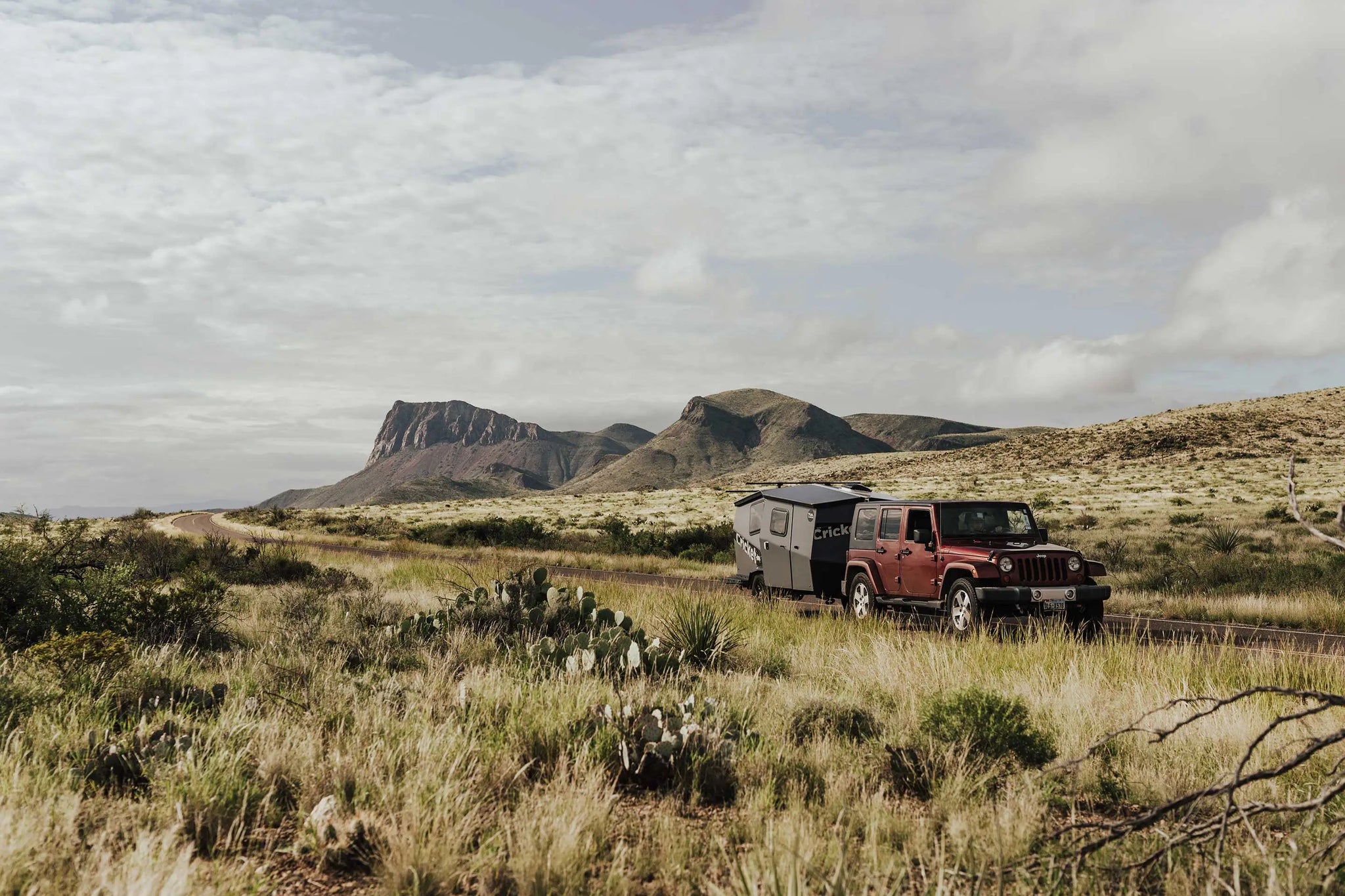
While some might call this a game of semantics, comparing the camping trailer and travel trailer categories might provide clarity when selecting a vehicle for your next adventure. The differences are subtle — but they do exist.
First, what is a trailer (vs. a motorhome)?
Before we look at the more specific differences between different types of trailers, what actually defines a trailer? The generally-accepted criteria for this is that they aren’t powered by an engine and aren’t self-propelled (and therefore “trail” a tow vehicle). This is different from motorhomes and RVs, which do have engines and can be driven on their own. However, trailers often have much more flexibility and can be more cost-efficient, which has resulted in a boom in popularity.
Camper vs. travel trailer
When we look at the trailer category, there are two primary terms you’ll see: Camping trailers (campers) and travel trailers. Engineers craft camping trailers specifically for the camping experience. Many trailers, regardless of naming specifics, possess the capability to drive on rough terrain, withstand harsh elements , and store belongings in tight spaces. However, camping trailers are uniquely crafted to excel at these tasks and are kings of efficiency and practicality. Many call camping trailers “adventure vehicles,” or as we at TAXA like to say, mobile human habitats purposefully designed to inspire the journey towards and into nature. These trailers engage with the natural world instead of running from it.
On the other hand, travel trailers are built with comfort and often luxury in mind. However, many require external hookups for things like water and electricity, as they’re expected to be used at established campsites with these in place. They are typically larger, with more amenities that lend themselves to someone living within the trailer for extended periods. This is in contrast to campers, where lots of time is spent outside and the trailer is primarily used for sleeping and eating, rather than the majority of your time.
Some would say there is some crossover territory between camping and travel trailers. However, in general, the intention of a travel trailer is to provide a living space that more closely resembles what you probably have back home. Rather than being immersed in the wild, the travel trailer serves up modern living in a mobile environment.
Feature differences
Camping Trailers: Typically smaller and lighter than travel trailers, campers also usually possess a more rugged build for camping terrain and adventures ( such as overlanding ). These trailers embrace the fact that many people camping may not have access to civilization (at least as they know it) while using them. Consequently, engineers design most camping trailers with solutions for electricity, water, and storage for days on end. In essence, camping trailers provide the necessities, oftentimes elegantly, but do not burden campers with luxury.
Travel Trailers: Rather than durability or efficiency, travel trailers pride themselves on convenience. Most require an RV hookup and take up more space than a camping trailer. Of course, these differences usually mean a more robust power system, more storage, and larger bedrooms. Many also possess well-equipped kitchens , living areas, and bathrooms. All of this extra space and comfort does come with an increased price tag, however.
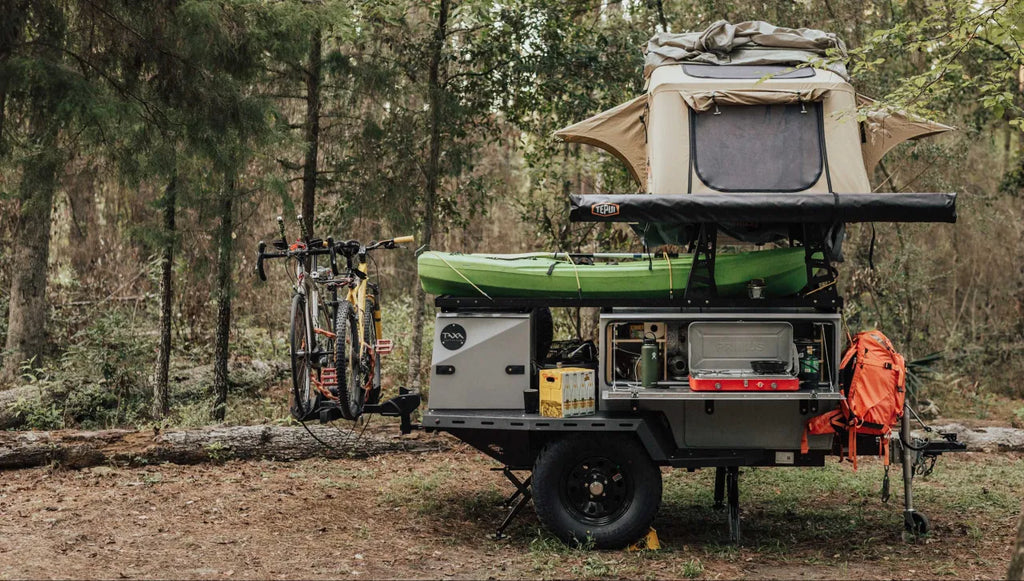
Other comparisons & differences
Travel trailers and campers aren’t the only types of similar vehicles that get confused. With all the slight variations and different names, it can be difficult to keep everything straight, so we’ve summarized a few more common comparisons below:
5th wheel vs. travel trailer
5th wheels are often a similar size to travel trailers (larger than campers and other smaller trailers), but the primary difference between these is in how they connect to the tow vehicle. Travel trailers connect via a bumper-level hitch, while 5th wheels connect to a hitch that is inside the bed of a truck. This means that 5th wheels can also only be towed by a pickup truck, not other vehicles that most other trailer categories can use .
Pop-up vs. travel trailer
On the other side of the spectrum from these larger trailers and RVs, pop-up campers are typically the smallest category of trailers. They have designs that collapse and “pop up” for storage and use. This means they can be towed by a wider variety of vehicles, but also have less storage and living space (unless you have a hybrid pop-up camper like our Mantis and Cricket habitats).
Toy hauler vs. travel trailer
As the name implies, a toy hauler’s primary purpose is to store and transport things like motorcycles, ATVs, jet skis, and more. While some have living space and amenities like a small kitchen, this is secondary to the function of storage. Because they can come in a wide range of shapes and sizes, this purpose is what sets them apart from travel trailers and campers.

Finding the perfect trailer for your adventures
To summarize, travel trailers insulate campers from the wild while camping trailers immerse them in it. Neither choice is right or wrong — however, comparing these two might shed some light on how each category fits what you’re looking for in your next vehicle.
At TAXA Outdoors, we provide adventure vehicles specifically for those wanting to journey into the outdoors. Our trailers can be important tools that enable survival and enjoyment while keeping the focus of your journey outwards.
Whether you’re looking to rent for a week or purchase for the long haul, TAXA Outdoors partners with an extensive network of high-quality dealers across the country. To connect with a dealer that can help find the perfect vehicle for you, use our Find a Dealer tool . Or, to find the right TAXA habitat for your journey, talk to one of our specialists who can point you in the right direction.

Every product is independently selected by editors. Things you buy through our links may earn Vox Media a commission.
From Tiny Trailers to Huge RVs, a Definitive Guide to Every Type of Camper
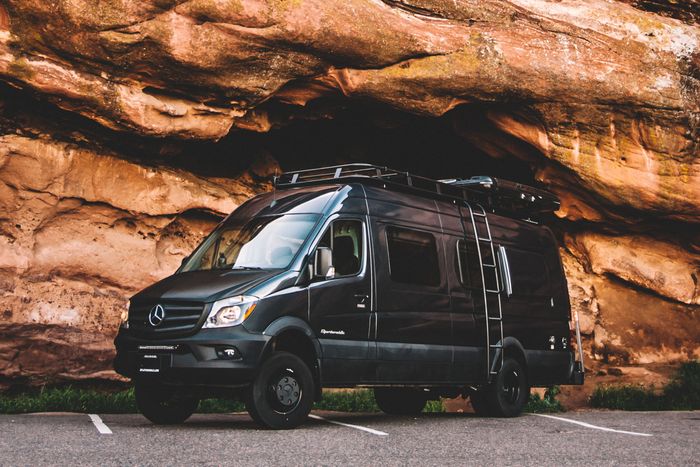
This story was originally published by Curbed before it joined New York Magazine. You can visit the Curbed archive at archive.curbed.com to read all stories published before October 2020.
There’s a lot to love about campers and RVs — that’s why we started a community group just for camper addicts. But even the most enthusiastic camper aficionado can get confused: What makes a Class C different from other RVs? Why is a fifth wheel trailer called, well, a fifth wheel? And are camper vans considered an RV or…something else?
Whether you’re looking to buy a new camper or just want to level up your camper vocabulary, this guide is a good place to start.
In the Recreational Vehicle (RV) world, you’re either towing something, or you’re not. It sounds simple, but that’s the first main distinction. If you’re not towing a trailer, then the vehicle and the living space are on the same chassis and you can always access the interior of your camper when you’re driving.
If you’re towing something, you’re likely pulling some sort of trailer. How much that trailer weighs and how you actually pull it depends on a few factors, and that’s what we break down in this guide. From Class A RVs to the tiniest featherweight trailer , here’s every kind of RV you can find on the road.
Class A RVs: The Biggest Beasts on the Road
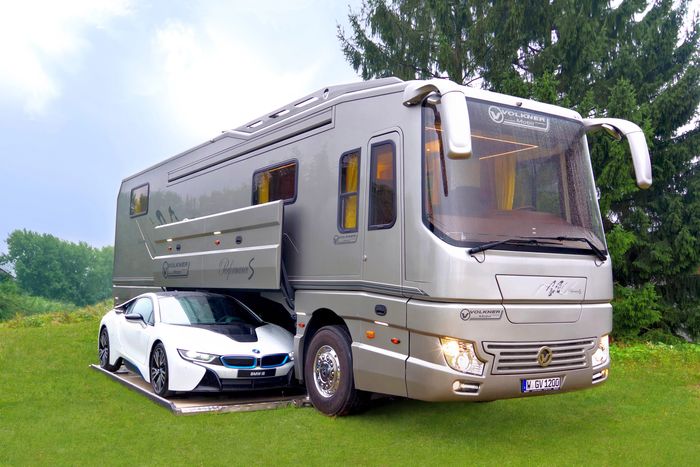
Size: 26 to 45 feet
Weight: 13,000 to 30,000 pounds
Details: The biggest motorized RVs on the market, Class As are like giant homes on wheels. They can be relatively simple or come with all sorts of bells and whistles , including over-the-top amenities like king-size beds, washer and dryers, and mobile garages that can hold a sports car . You get a lot of space with a Class A, and potentially some serious luxury. Another benefit is that you can usually tow a car behind a Class A. But Class As can also be very expensive, have low fuel efficiency, and are limited on where they can travel due to their size and hookup needs.
Class C RVs: A Mid-Size Option
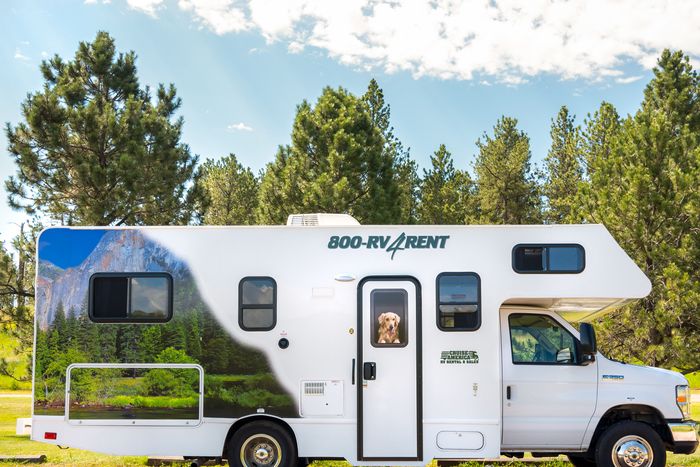
Size: 20 to 30 feet
Weight: 10,000 to 13,000 pounds
Details: Not quite as big as a Class A, but not as small as a Class B. Yeah, we know that’s confusing. Sleeping quarters in a Class C are often over the cab with another area in the back, and you might find slide outs similar to those common in larger Class As. Class C RVs usually have a separate bathroom area, whereas a Class B camper van might not. Class Cs work well for people who want something smaller and less expensive than a Class A, but think a camper van is too small. Note that Class C RVs usually aren’t big enough to tow another vehicle.
Class B RVs: Van Life and So Much More
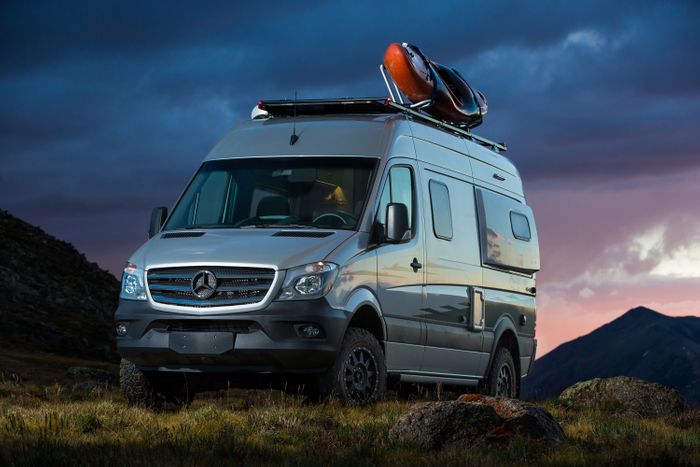
Size: 17 to 23 feet
Weight: 4,000 to 9,000 pounds
Details: Often called camper vans, Class Bs are a mid-size option that are much smaller than the big Class A RVs. Common van bases include the Mercedes Sprinter, Ford Transit, and Ram Promaster , and these small but mighty campers can be basic — think bed and storage — or have extras like bathrooms, dining areas, and room to sleep six . The biggest drawback is that you don’t get as much space or amenities compared to Class As and Cs, but there are also benefits to the Class B; some come in a four-wheel-drive option , get good fuel economy, can fit in many parking spots, can stay off the grid , and are easy to drive.
Travel Trailer: Big, Small, and Everything in Between
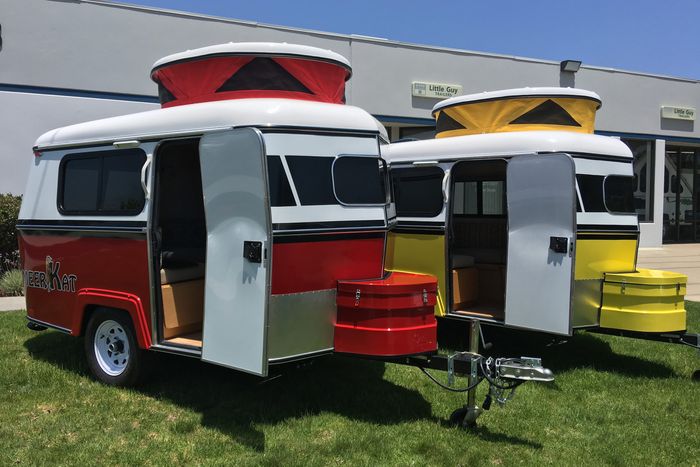
Size: 10 feet to 40 feet
Weight: 1,100 to 12,000 pounds
Details: There’s probably no greater range of campers in a single category than the travel trailer. Bumper pull travel trailers connect to a standard trailer hitch, and they can range from lightweight to fairly heavy. This means that the smallest travel trailers can be pulled by a small SUV, while others might require a large truck. Travel trailers are good for campers who want to unhitch and store the camper more easily when not in use, and a plethora of options means that there is something for everyone. Just how diverse is the travel trailer category? The 10-foot Happier Camper is a travel trailer, and so is the 33-foot Classic Airstream , a trailer that’s more than three times as large. You’ll also see convertible trailers , teardrops , and trailers with vintage style .
Pop-up Trailer: Compact and Easy to Store
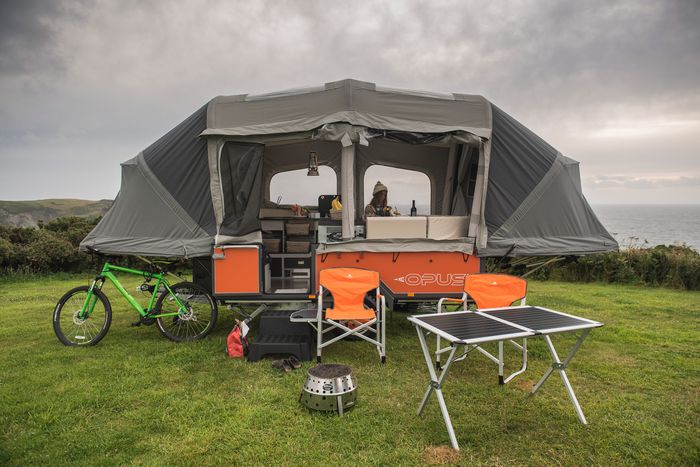
Size: 8 feet to 16 feet
Weight: 700 pounds to 4,000 pounds
Details: Also called a folding trailer, the pop-up trailer is a lightweight camper that folds into itself for easier storage and towing. Think of pop-up trailers as an alternative to a tent, since you get a similar open-air feeling , with a living area in the center and two sleeping areas on either side. Pop-up trailers are great if you don’t mind fewer amenities, can’t tow a lot of weight, and your main goal is to avoid sleeping on the ground. Many are also reasonably priced. The downside? Folding trailers aren’t as well insulated for weather — think of them as three-season camping tents.
Fifth Wheel: The Largest Trailer You Can Buy
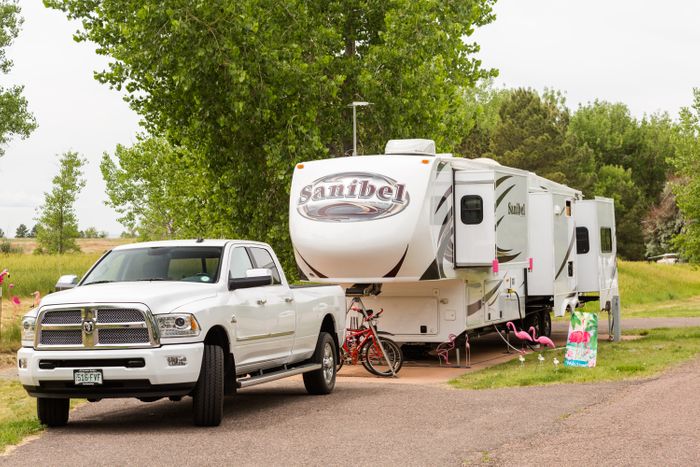
Size: 22 to 40 feet
Weight: 7,000 to 20,000 pounds
Details: Fifth wheel trailers are the largest trailers you can tow behind a vehicle. They are called “fifth wheel” because the front of the trailer extends over the bed of the truck. The truck bed contains the hitching mechanism — a u-shaped coupling component — which can make fifth wheels easier to tow than some other travel trailers since it’s easier to turn. Fifth wheels offer all the space and comforts of a Class A RV — including slide outs, bathrooms, and even multiple bedrooms — but they also require a pickup truck with a specifically fitted hitch. This type of RV is best for someone who wants all the amenities of a large Class A, but wants to tow it and then store it when not in use.
Truck Campers: From Weekend Campers to Expedition-Ready Vehicles
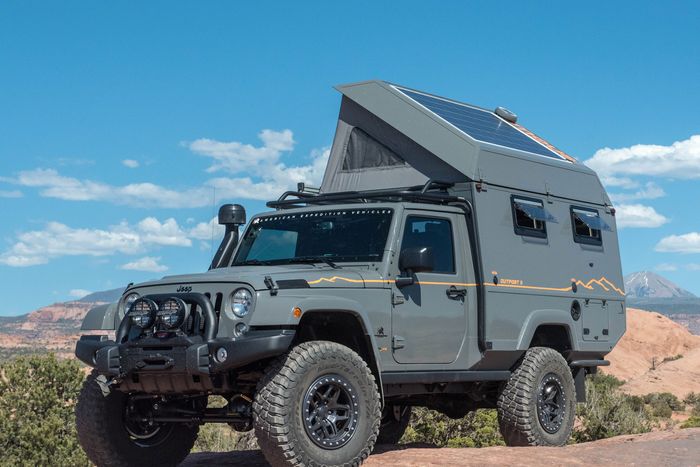
Size: A few feet longer than your truck
Weight: 1,000 to 5,000 pounds
Details: Truck campers like the one pictured above are best for traveling off-the-grid for weeks, months, or even years. This isn’t a camper meant for a large family; it works best for one, two, or a maximum of three people. Four-wheel-drive capabilities and burly suspension mean that these campers can go anywhere but have limited storage and only the most basic amenities. There are also truck campers with more amenities meant for regular campground stays; these often use a rear door and can include an overhead sleeping cabin. Options for truck campers include long and short beds, hard-side and pop up, as well as slide outs.
- corner shop
Most Viewed Stories
- The Eavesdropper Goes to Woody Allen’s New Movie
- Welcome to Williamsburg’s Wellness Corridor
- The Look Book Goes to the Best Baguette in New York Competition
- This Week’s Worth-It New York City Apartment Listings
- ‘Please Don’t Hang Out Here’
Editor’s Picks

Most Popular
What is your email.
This email will be used to sign into all New York sites. By submitting your email, you agree to our Terms and Privacy Policy and to receive email correspondence from us.
Sign In To Continue Reading
Create your free account.
Password must be at least 8 characters and contain:
- Lower case letters (a-z)
- Upper case letters (A-Z)
- Numbers (0-9)
- Special Characters (!@#$%^&*)
As part of your account, you’ll receive occasional updates and offers from New York , which you can opt out of anytime.
- Everything Else
- Unusual Off-Road
- Portable Power
- Latest Videos
- Body/Chassis
- Transmission/Drivetrain
- Wheels & Tires

- 4WD & Trucks
- Overlanding
- How To & Tech

Best Jeep Accessories of 2024
Are electric 4wd vehicles ready for serious overlanding, dodge ram off roading tips, how good is a rivian off road, how good is the 2022 toyota tacoma trd pro, 5 reasons to invest in a small portable power station, budget-friendly camping in a mini camper, the best camping accessories of 2024, 4 reasons a pop up cabover camper is right for you, top overlanding routes in the u.s.: unforgettable adventures for off-road explorers, campluxe cabovers first impressions: luxury camping in your truck bed, allpowers s2000 portable station review, overland vehicle systems sidewinder roof top tent review, transforming space: the ultimate mercedes sprinter 170 extended van conversion, eezi-awn jazz roof top tent review, payload vs. towing capacity: what can your truck handle, breaking down the myths and misconceptions about all-terrain tires, how tire size and fitment can enhance off-roading performance, choosing the right overlanding tires, exploring the benefits of all-terrain truck tires, campervan vs. camping trailer: which is best for you.
Image Credit: BTR Outfitters
Choosing the right gear for outdoor adventures is crucial. When it comes to big-ticket items like a campervan or a camping trailer, the decision can significantly impact your experience. Both options present a unique way to explore the outdoors yet cater to different preferences regarding comfort, convenience, and cost.
A campervan is a compact home on wheels, offering a blend of mobility and essential amenities. Conversely, a camping trailer provides a detachable dwelling, allowing more flexibility in setting up your camp. Your choice between a campervan and a camping trailer will hinge on various factors, including your travel style, budget, and the level of comfort you desire.
In this piece, we will delve into the specifics of campervans and camping trailers, aiming to provide a clear comparison to help you make an informed decision. From cost and convenience to maneuverability and living space, we’ll dissect the core aspects of each option in the campervan vs camping trailer debate.
Table of Contents
What is a campervan, what is a camping trailer, pros and cons of a campervan, pros and cons of a camping trailer.
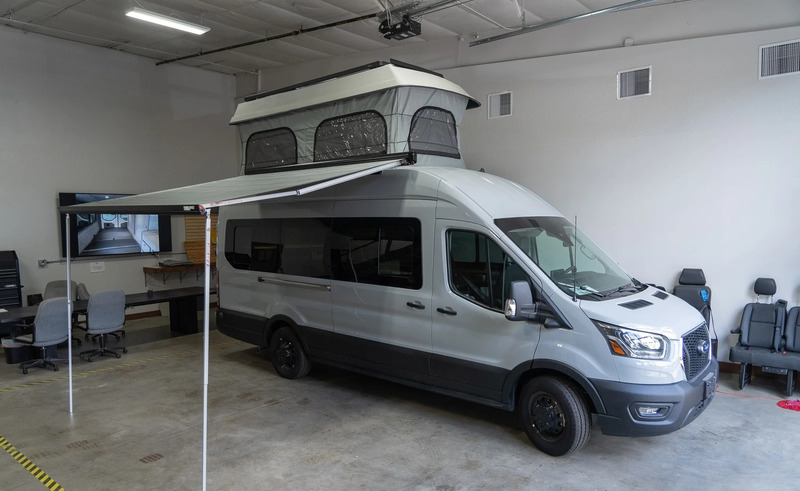
A campervan is a compact, mobile home on wheels designed for adventure enthusiasts. Exploring the campervan market unveils a realm of possibilities, each model designed to cater to adventurers’ diverse needs, ensuring a suitable option for every travel style and requirement.
There is a prime example when it comes to campervans: the Ford Transit 250 HR Campervan by BTR Outfitters . Its high roof and 10-speed transmission embody the spirit of adventure. Therefore, it is our choice when we want to talk about campervans.
The Ford Transit 250 HR Campervan stands out with its sleeping capacity for up to six individuals. It has a functional kitchen featuring a Ruvati 15X15 sink and induction cooktop, ensuring comfortable living on the road.
Although the market offers a variety of campervans, each with unique features, the Ford Transit 250 HR Campervan showcases a blend of comfort, convenience, and capability, making it a noteworthy option for outdoor enthusiasts.
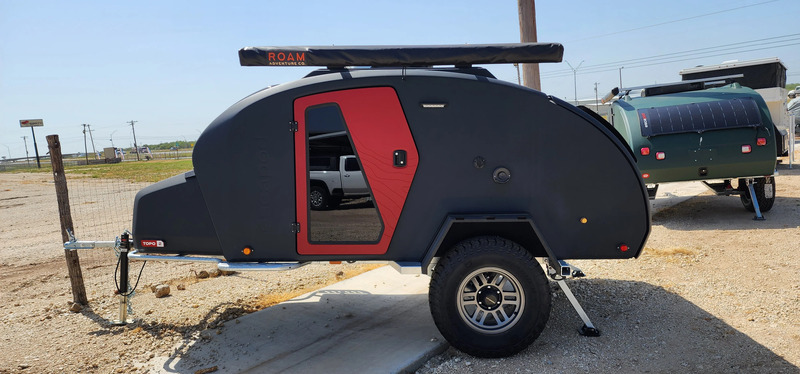
Camping trailers embody the spirit of adventure with the promise of mobile convenience. Unlike campervans, they are towed, offering a detachable base camp. They come in various shapes and sizes, each tailored to specific needs. Among them, teardrop trailers like the Escapod TOPO 2 have garnered a loyal following for their compact yet amenity-rich design.
The TOPO2 boasts a rugged exterior with a single-piece composite fiberglass body, ready for challenging terrains. Its proprietary Freeride Suspension System ensures smooth handling over rocky trails, showcasing its off-road readiness.
Inside, a heated mudroom at each entry keeps the interiors pristine. The sleeping quarters with a queen-sized 6″ memory foam mattress under a vast stargazer window invite a restful slumber after a long day of exploration.
The TOPO2’s galley rivals home kitchens with a full-size sink, ENO 2-burner cooktop stove, and space for a cooler or fridge/freezer upgrade. An integrated outdoor shower adds a touch of luxury, blurring the line between rugged and refined in camping trailers.
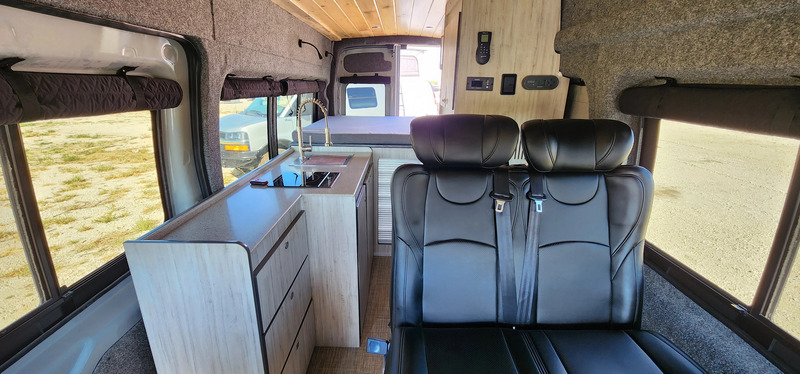
Campervans embody convenience and mobility, offering a stealthy approach to camping. Their compact design provides better gas mileage compared to larger RVs, making long-distance adventures more economical. Additionally, the ease of parking and maneuvering campervans, especially in urban settings, is an undeniable advantage. The absence of a towing aspect alleviates the common anxiety many face with trailers.
However, campervans present a scenario where a trip to the store means taking your home along, a factor that could be inconvenient. The living space is also notably smaller, providing a cozy but confined dwelling. Additionally, the initial cost of acquiring a campervan can be higher compared to travel trailers, making it a significant investment.
Despite these drawbacks, campervans exude a level of versatility that’s appealing. They blend the essentials of comfortable living with the mobility desired by avid travelers. The design of a campervan ensures that all basic amenities are within arm’s reach, promoting a simplistic yet fulfilling outdoor experience.
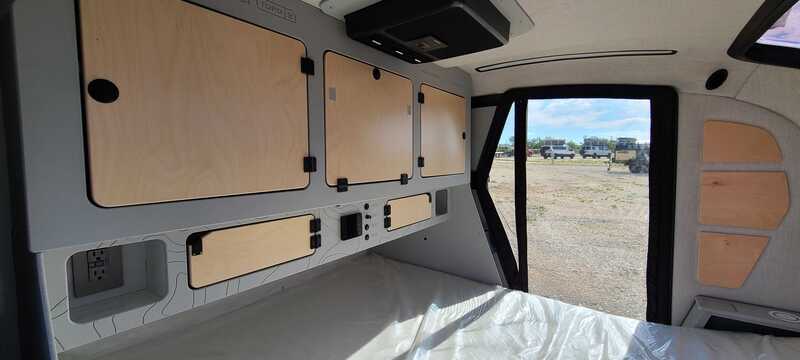
Travel trailers bring forth a sense of homely comfort in the wilderness. They are often more affordable than campervans, which is a notable advantage for budget-conscious adventurers. The separation of living space and vehicle allows for a fixed campsite, providing the freedom to explore without packing up your home. This feature also gives a semblance of having two separate spaces, which is beneficial when a moment of solitude is needed.
On the downside, the task of hauling a trailer is not everyone’s cup of tea. It requires a vehicle with adequate towing capacity, which could mean an additional investment if one doesn’t own a suitable car. Moreover, backing up with a trailer is often tricky, requiring a level of skill and patience to master. The necessity of a secure storage space when the trailer is not in use is another factor to consider.
The maintenance aspect of travel trailers is less demanding since there’s no engine involved. This factor contributes to the economic appeal of camping trailers. Getting insurance for travel trailers is also generally easier and cheaper, adding to their economic allure.
What is the hardest part of camping in a campervan?
The challenge of camping in a campervan often revolves around managing the limited space efficiently. Additionally, maneuvering a campervan in tight spots or crowded campsites can be a bit tricky.
Is it hard to tow a camping trailer?
Towing a camping trailer can be intimidating for novices, especially when it comes to backing up or maneuvering in tight spaces. However, with adequate practice and the right equipment, towing a camping trailer can become a manageable task. The level of difficulty largely depends on the size of the trailer and the towing vehicle’s capabilities.
What is the price range for campervans and camping trailers?
The price range for campervans and camping trailers can vary significantly based on their size, brand, and the amenities they offer. Campervans typically range from around $20,000 to over $100,000. On the other hand, camping trailers can be a more economical choice, with prices ranging from around $10,000 to over $50,000. The cost can increase with the inclusion of additional features or upgrades.
Heads up: Clicking on our affiliate links and exploring our sponsored content helps us at no extra cost to you, and we only recommend gear we’re absolutely crazy about!
- Escapod Topo2 Review
- Three Types of Camper Vans – Which One is For You?
- BTR Outfitters
- buyer's guide
- overlanding
Related Articles
Latest articles.

© Copyright - 4wdtalk 2020 - 2024 | Privacy Policy | Terms and Conditions
ABOUT | PRESS | FAQs | CONTACT | VIDEOS | GALLERIES

- SOUTH AFRICA
- ZAMBIA-VICTORIA FALLS
- PHILIPPINES
- NEW ZEALAND
- SARDINIA PAGE
- THINGS I LOVE!
- Work With Me
The Difference Between a Camper Trailer, Caravan or Camper Van For Your Amazing Road Trip!

Contents - Open To Read
Dreaming about an amazing road trip? Why don’t trying using an RV rental vehicle (“Recreational Vehicle)? And what exactly is the difference between Caravans and Campervans? I only mentioned the 2 most common categories but there are solutions for everyone’s needs and budgets!
Before choosing one over the other, you will need to do a bit of planning and research, of course, to make sure everything is right to go, but let me tell you, I tried this option (in my case a Campervan) and it is so worth it that I didn’t want to get off it!
To come to a decision, You’ll have to ask yourself a few questions first:
What does my budget look like?
What’s the best time of the year to go?
What is my travel style?
Do I want to rent or buying one?
However, one of the major questions you should be asking yourself is whether you will be taking a camper trailer, caravan, motorhome or camper van on your road trip … knowing what the difference between them is and the Pros & Cons of each one!

One word: FREEDOM! How cool is to have a place you can call home while on the road?! It can’t get any better than this!
Your mode of transportation is the most important decision you’ll make. You have the option to buy a second-hand transport or rent one directly just for the days you need it so that you won’t have issues on where to park it, repairs and so much more.
HOW TO RENT AN RV: CAMPER TRAILER, CARAVAN, MOTORHOME OR CAMPER VAN:
After reading this article you will have a better understanding of the main differences between a camper trailer, caravan, Campervan, and motorhomes so after you have made up your mind, check out the best website to rent one!
I highly recommend this website as it provides rentals of different RV’s all over the world and the prices are very competitive, the 24-hour assistance is also a must for safe travels and the reviews are very positive.
Click on the Outdoorsy banner below to know more or click in here to go to their home page and see all the options and rental conditions.

WHAT IS A CAMPER TRAILER

Image source: Gumtree
We’ll start with the easiest one: the camper trailer. You would choose a camper trailer if you’re looking at a tighter budget for your road trip .
A camper trailer is a separate unit that you’ll attach to your car and depending on the model you choose, it can have different features, but all in all, it will grant you a bed to sleep, storage, an outside kitchen (sometimes inside on most expensive ones), and everything you need to move around. Perfect for camping & adventure and for people with a cheaper budget that don’t mind being a bit flexible and creative 🙂
Do you want to see an example of what a camper trailer looks like? watch this interesting video! Disclaimer: this is a rather high-end camper trailer with more amenities than the basic ones.
PROS OF A CAMPER TRAILER:
A camper trailer can be considerably cheaper than a caravan or a camper van . Also, camper trailers are generally a lot smaller and easier to transport than the other two options. This takes away any worries that your gas mileage will decrease, because of the extra weight of the trailer.
Perhaps one of the best parts of having a camper trailer is the ability to be surrounded by the open air . Camper trailers typically have canvas roofing and sides, so more of fresh air from the outside will come in.
CONS OF A CAMPER TRAILER:
Some of the cons are obviously the lesser space inside , compared to a Caravan/Campervan. But yet again, if this doesn’t bother you, and you have a tight budget it might be the perfect solution for you!
Also, you have to be careful while driving , turning around with your car etc, in order to avoid any damage to the camper trailer.
WHAT IS A CARAVAN
Now, if you’re looking for a little bit more than a camper trailer, you should look into getting a caravan for your next road trip .
Caravans are towed along behind your car, so you can just hook them up and go. Caravans also give you more luxury than a camper trailer. Usually, they will come with separate rooms for a bedroom, bathroom…maybe even a small cooker or kitchen unit.
However, caravans will be a bit more on the expensive side compared with the camper trailers.
Plus, it may require a larger vehicle to be able to tow the extra weight. That potentially means higher gas costs and less road efficiency. Take your budget into account before you go for the caravan option.
WHAT IS A CAMPER VAN
The next step up from a caravan is to go for a camper van, or an RV as it’s otherwise known.
This is going to give you the most luxury and security on your road trip. You’ll be able to just hop from the front seat back into the kitchen/dining area and head on back to the separate bedroom and bathroom.
However, as can be expected, this is going to be the most expensive option out of the three, in terms of up-front costs and gas mileage.
Camper trailers and caravans are generally a bit easier on your budget . But if you have the budget for it, buying a campervan and reselling it after your trip, could be a perfect choice for you.
Whether you choose a camper trailer, caravan, or campervan for your next road trip, you will definitely have an incredible time. The world has so much for you to discover and you will not be disappointed!
PROS AND CONS OF CAMPER TRAILER & CARAVANS VS CAMPERS AND MOTORHOMES:
So, now that you have an idea of what’s the difference between the Camper trailers/Caravans (they are separate from the car) and the Campers/Motorhomes (they are basically one unit), let’s see the main pros and cons of these solutions.
I found an amazingly instructive video where they are explained in detailed, helping you in your decision making when it comes to rend or buy your “house on the road” 😉
This is a basic video for the entry level of campers and caravans but I found it extremely useful so I’ll hare it with you in here!
As you could gather from this video, the choice of renting/buying a Caravan or a Camper Van goes down to how you are going to use it, your budget and your style of travel . They are all great solution to have your own “home” with you while traveling so … check them out and try the experience at least once in your life!
SAVE IT FOR LATER… PIN IT!

Thanks for sharing pros and cons of Tent Camping,Camper trailer and Caravan.This is good info. I really appreciate your research. I love these ideas. Thank you so much.
Thanks Bailey, glad you found the info useful! 🙂
I’m glad you mention that amper trailers are easier to transport and to store. My parents want to try the camping lifestyle and the want to buy an RV. I will recommend they get something small, that way their trips will easy without so much load.
Oh, your parents are so cool Eli! I also have this almost “obsession” to try the camping lifestyle and I hope your parents will fulfill their dream! Small is good, as long as they have everything they need, just traveling with the essentials is actually the very idea of this very nice lifestyle!
Leave a Comment Cancel reply

Travel Trailer vs Class C Motorhome 17 Pros and Cons Comparison
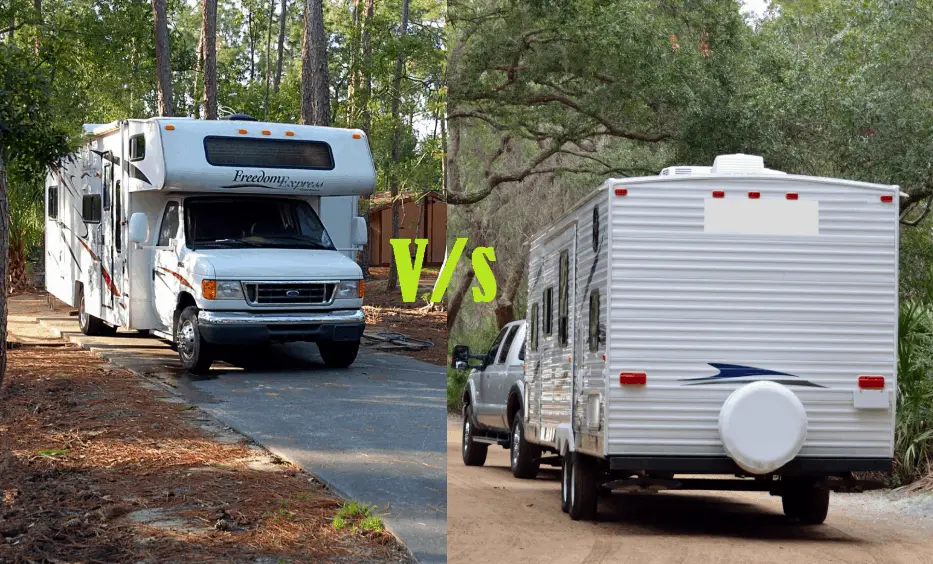
- BUYERS GUIDE
G. Yoganand
In this article, lets check out the differences between travel trailer vs class c RV.
Deciding between different rv’s can be confusing. Isnt it?
But, you can make it very much easy for you, If you compare the options in terms of all your priorities. Many people are stuck on a decision to make between a travel trailer or a class c rv or other motorhome.
Can it be simplified in terms of all the differences? Well, read on to understand the comparison between travel trailer and class c rv.
Here is a summary of all that you should know before choosing between the two.
1. Cost Comparison – travel trailer are less costly
Travel trailer or class c rv or any other motorhome generally comes at thousands of dollars. And, when you pay such a big amount, comparison between various peers is bound to happen.
Paying big amount upfront for your camper needs to be one of the main factor for you, unless you are a millionaire.
Travel trailer is seen to be cheaper, at least most of the travel trailer would normally come at a price that is lesser than class c rv. This is average price comparison as otherwise you would also find travel trailers that can be more costly also.
But, it totally depends on what kind of travel trailer you are buying.
A lot depends on the size of the trailer you are looking for, what kind of amenities you want, the layout and also the construction type.
If you start looking for travel trailers in market, you would see that mostly the prices start with as low as $7000 and go upto as high as $70000.
A travel trailer at $70000 would be a matter of much thought though. Anyways, overall average price of travel trailer is seen to be mostly between $15000 to $25000. By saying this, i mean the most popular travel trailers come at a price that lies in this range.
Class C RV upfront cost is on higher side and they normally start at $50,000, which is almost equivalent to the highest model travel trailer you would get in market.
Class c motorhomes are better in terms luxury, when you compare them with travel trailers and thus, obviously are priced higher. Also, you don’t pull them behind your car. On an average most popular class c rv prices remain in the range of $60,000 to $85,000.
These motorhomes are priced based on amenities, size, floor plans and also, the manufacturing brand If you are looking to pack the recreation vehicle with things like dinner table, bed, refrigerator, sofa, bathroom then the prices would be higher and then, there is almost no comparison between the travel trailer and class c rv.
Thus, the price comparison between class c motorhome and travel trailer camper is clear and you should have a clear idea of what you are looking for.
With a budget of 20,000 or less will mean looking for a new class c rv is not a correct thing unless you are going for used one(that’s a completely different point).
2. Better Driving experience with Motorhome
Driving a camper or a motorhome is a experience that you wouldn’t get going around in car or big SUV. Going around in big rv definitely means you should be much more careful.
A big vehicle of a length of 30 feet not only demands for great care while driving, but also you should be comfortable driving it. Thus, it is a factor of lot of importance to not take into consideration.
Here are some top short Class C Motohormes .
Driving, when you have something towed behind using hitches can be tough in comparison to a big rv, but its totally subjective, some people find big rvs difficult to drive on road while some see a hitched travel trailer a total headache.
The best way to decide which one suits you will be taking a test ride, it could be a new one; if the dealer has such a facility or trying some one else’s travel trailer or class c rv.
If you have been driving any of these previously, then you yourself should be in a good position to understand your level of comfort driving them. Braking can be tough when you have travel trailer behind your car and will need learning as you continue to drive it.
There are quite a lot of factors to be vary of, when you have a hitched trailer behind the car. Backing a travel trailer also needs special attention, initially it may be the difficult part to deal with.
But, with practice you should be able to master it though. It would need proper use of mirrors, spotters to be able to do it like a pro. A class c rv backing may not be as difficult as travel trailer though. In comparison to a small car, it obviously will be fearful for new rvers. But, shouldn’t be an issue once you get good hands on.
A travel trailer can come good on narrow roads as compared to class c rv, which will be much wider.
Also, a class c motorhome can give you much better view , though windshields which may not be possible with travel trailer as you will be sitting in car; which will have lesser windshields.
You don’t get access to living area while you are driving in a travel trailer, where as class c motorhome makes it possible.
3. Towing efforts with travel trailer
Remember a buying travel trailer means you consider lots of factor associated with the towing which is not the case with class c rv or any other motorhome.
That’s the main difference between the two. Can this itself can be factor with greater significance to decide between the 2 and go for a motorhome? Getting a new travel trailer needs you to be sure that the car you already have is capable to pulling the trailer with ease. A matching need to be developed between the car and the trailer.
Getting hitches connected to car, making sure that the connection is perfect every time you head out for camping can be lot for someone with less patience.
With class c rv or any other motorhome for instance its just about taking the RV on road and driving. The set up with trailer can be time consuming and sometimes pretty much a headache.
Safety can also be a concern while you tow the trailer, your car or other vehicle may not always be the perfect fit for towing and that’s when the safety can be a concern.
Although you will get the list of cars good for towing a travel trailer also your car manufacturer stating the same in manual may not always mean you are good to go.
A travel trailer when bought will have certain weight but when you start packing things in it, its weight may go out of limitation for your car. Thus towing a travel trailer not only needs special consideration but also a safety check needed.
Using brakes on travel trailer towed car is also a thing of special practice and you need to be a well trained if not pro.
Thus a fact itself that you need to tow behind car is a greater factor for many to chose for class c rv or any other motorhome in the range. However if you are okay with towing or if you had experience of doing it previously tat you should be better off.
4. Travel trailer Needs less Maintenance
Maintaining a car itself can be a task that many people find tedious. If you are of that nature than owning a rv or travel trailer can get tough for you.
A travel trailer when compared to class c RV for maintenance does not vary much and both need similar kind of schedule to follow. A class RV maintenance will be more costly as compared to a travel trailer, it will also need good storage in garage with a bigger space.
A travel trailer since smaller in size needs a smaller space and a maintenance can be easy as compared to class c rv or any other motorhome.
In case of class C rv you need to be careful about the appliances in it during winters, a class c rv comes at a high cost you cant afford to take things for granted. A travel trailer with minimum amenities will need less attention in comparison to a motorhome.
Read : How to keep travel trailer warm in winter
Having said that a motorhome is generally built heavily with a quality that can be much better that travel trailer and this means the RV or motorhome could be better off handling harsh conditions.
A travel trailer for instance can be protected by a cover which may not really be the case with a big RV. You would need a better garage, that is high in length and bigger n size.
5. Class C RV Has More Space
A motorhome when you compare the overall space you get for driving, living etc is larger as compared to a average travel trailer.
With a motorhome or class c rv you have a cabin that’s much above the road, it gives a perfect view while traveling. Which is not the case with travel trailer when you are sitting in your car.
With a modest price tag a trailer can give you space that will be compact, utilized in a manner to put it stuff as compact as possible as minimum as it gets.
A class C rv will give you a living area that’s larger, a bathroom with a shower that will good enough depending on the length you chose.
Overall with class C rv you have the luxury of space that is not possible with tow-able trailer. Having a bigger space in your camper or RV can be of much more importance when you are camping with kids.
For a couple a travel trailer could be a good fit if you are ready to live with the shortcomings. It all depends from person to person and the priorities. A large travel trailer can also be good for space, but may come with a price tag that almost similar to a motorhome.
Storage space with motorhome is also more and that can e of much more priority for many, Camping is all about packing things for the stay, but imagine you had less space that could fit in all things.
If you are kind of person who just packs things without giving many thoughts or if you are big family that needs lots of packing then go for a storage that meets your requirements. its as simple as that.
6. Less Depreciation in Travel Trailer
Depreciation of RV is something that many people hate. A costly vehicle loosing its value over a period of time hurts a lot. The moment you buy a brand new motorhome it starts to loose its original value.
Depreciation comparison between travel trailer and class c rv or any other motorhome like class B or class A can be a significant factor that can make chose travel trailer. Specially if you are among those who believe in selling old stuff for a good return or renew your RV after certain usage.
A travel trailer find itself with a depreciation little lesser as compared to class c RV. Class A motorhome or class c RV depreciation is directly proportional to the year of manufacturing.
For example, a 2014 model class C rv will loose more on its value as compared to a 2016 model. A year of manufacturing makes a lot of difference and so does the miles on odometer. A travel trailer does not have a odometer and that can be an advantage for it. It solely depends on the year on manufacturing and its condition.
Read : Travel trailer essentials
Maintaining the RV is of great importance if you want to prevent the depreciation percentage to certain extend.
But, unfortunately even with best of best maintenance you cannot prevent the going down of worth of your RV.
If we were to compare solely based on numbers the depreciation of travel trailer and class c rv remains almost similar for 5-8 years (could be between 40-50%) but as you go beyond 10 years a class c rv losses its sheen more as compared to travel trailer.
Class C rv or even other motorhomes loose close to 85% of their value where as a good maintained travel trailer can still hold close to 30% of its value that is losses 10-15 % less than class C rv or class A RV.
Having a look at these average numbers it is upto you if you really care about these 10-20 % after 10 years.
I think most wouldn’t care and the decision on class C against travel trailer should be taken considering the resale value factor with minimum importance.
7. Class C RV has better longevity
When you pay thousands of dollars for a rv or a travel trailer you obviously expect it last for as long as possible. Average life of a rv depends on lots of factors and is not tied with it when you buy it.
You will get warranty for various parts, but to expect a definite life for the trailer or class c rv will be foolish.
A rv or a travel trailer needs scheduled maintenance a good care is needed to keep it going for you.
Imagine you very a very good care taker of your rv then you can expect a good built travel trailer to last as minimum as 12-15 years. The most important part of the travel that you need to be specially careful about is the trailer roof.
Travel trailer roofs are subjected to leakage if sufficient care is not taken. Motorhomes on the other hand can be live a little longer, they are built solid, more capable and thus can last for 20 years or more on an average. It also depends on how many miles the rv ran.
A class A or C may give you more than 200 thousands of miles which may take you around 20-22 years to do. Comparing life of a travel trailer and class c rv solely for the purpose of deciding between two could be a thought for future too ahead.
Also, the life of trailer or the class c rv is very much dependent of many factors which can be controlled by the owner. It depends on how you store the rv when not in use, scheduled maintenance, usage frequency and so on.
8. Travel trailer puts pressure on car mpg
Getting a rv for thousands of dollar is matter of significant investment. Once you get a rv its not only about paying for the upfront cost, with the rv comes other costs.
There are lots of other things you end up spending before you go on that first camping experience. One of the other costs that you have with a rv is the fuel cost.
In fact, it is one of the major spending that a rver has to do to goa around in it. Many a times full time rver complain about the money they have to put in fuel costs. Considering this its important to do sufficient study on how many miles you can get with your class c rv or a trailer.
Getting best fuel economy for rv can be a significant cost saving factor. GA mileage is a parameter that can depend on lots of factors like the age of motorhome, the condition of you rv or trailer, the weight you carry on with in also on where you are driving the rv.
It also depends on the speed with which you drive the rv. On an average a class c RV can give you a gas mileage of around 10-12 miles per gallon (mpg).
It also depends on the wind conditions like a windy day will reduce the mileage may be by 1-2 miles depending on how the construction of the rv is to facilitate the wind resistance.
The wind condition is in fact more of a factor that affects the mileage that the weight of the RV. Pulling a travel trailer on an average also should give a mpg of around 10 miles per gallon.
Read : Truck Camper Or Travel Trailer
Here again, it depends on the frontal area of the trailer being towed. A good wind resistance handling by trailer will increase the mileage by 2-3 miles per gallon.
Also, the speed with which the trailer is being pulled matters. Imagine a speed of around 60 miles per hour, a weight of around 9000 pounds, length of travel trailer around 25 feet gives a mileage of around 8-9 miles per Jagiellon.
9. Travel trailers are available in abundance
Travel trailer are available in plenty in market as compared to class c RV or other motorhomes and thus there is a great chance that you will find a one that best suits your needs.
It is not that you wont get a class c rv as per your needs but you may have to hunt longer to get the one that best suits your needs. Buying second hand is also a option and when you compare the second hand selling market of travel trailer with class c motorhomes you will have lots of options with travel trailers.
In the year 2017 more than 5 lac RV’s were sold in united states which was less than 3 lacs in 2013, that means a growth of more that 100%.
With so many RV’s selling each year the availability of second hand has also increased and because there is so much growth the manufacturers have also spun into action.
Most of the RV’s sold include travel trailers and this number is also greater than the class c rv types. Travel trailer being less in cost are more popular and thus their selling is also larger.
Some of the travel trailer brands that sell most include keystone rv, jayco, rockwood, dutchmen, Airstream . Class C RV manufacturing brands that sell highest includes Winnebago, coachmen, tioga, four winds, jayco , gulf stream, itasca and many more.
10. Class C RV is much bigger
Rv’ or motorhomes have lengths that can intimidating. A length of more that 15 feet itself can be a tough one for a new driver who haven’t had the opportunity to drive such vehicles previously.
When you compare travel trailer length with a class c motorhome both have big lengths but class c motorhome are on an average about 50% more in lengths as compare to travel trailers.
Travel trailers are seen to be having average Lengths of around 20 feet where as class c motorhomes are seen having a average length of 28 feet. You will find variety of lengths but the most popular are seen with these lengths. A class c rv have lengths that start from anywhere from 22-25 feet.
Their counterparts class B rv are seen having average lengths of around 20 feet. Where as class A motorhome are among the lengthiest and they can be as lengthy as 45 feet or even more sometimes.
Understanding the length of RV or a travel trailer is important because you should be comfortable with their length, also you will have to think about the garage for storage at home.
Also, campsites or national parks have length restriction and you may want to have a length that fits in your favorite or close-by nation park of campsite.
Having a lengthy travel trailer can be a hard one to tow and you should check on the length so as to make sure you are not buying a one that will be too much to tow. Also a large length for a travel trailer would also mean more weight which should be within limits for your car to handle during towing.
11. Class C RV are heavier than travel trailers
Rvs of any kind are heaviest that run on roads. They weigh thousands of pounds. A more weight obviously means a reduced mileage.
With advances in manufacturing technology there has been reduction in with over the years. Yet the pounds haven’t come down to that level. Thus its important for you to compare the weight of rv that you intend to buy.
A class C rv is among the heaviest ones only to lag behind class A motrhomes that are heaviest of them all.
A class C RVs weight on an average is seen in between 10000 to 15000 pounds. Travel trailer on the other hand have weight that is much less in comparison to class c rv’s, a 18-20 feet travel trailer can be around 2000 pounds heavy.
It is important that your trailer is as light as possible, since you will be towing it with your car or SUV. And a car or mini truck will have its own capacity to pull and thus checking on the weight of trailer should be your first priority.
Its not only trailer weight but also the overall weight that you should check. A packing for camping can quickly get heavy exceed the limits of your towing vehicle.
Its also necessary that you are aware of overall weight with full gas tank. Having long trailer can give you good space but the pulling vehicle will be under pressure. There are also laws that prevent from pulling certain weight (you need to check that with the states towing laws).
12. Better Construction in Class C RV
Class C rv or any other motorhome are generally better made as compared to towable travel trailers. Their Construction quality is good and is more durable.
Saying these it does not mean all the class C rv construction will be of better quality. It depends on the brand, manufacturing year model. Obviously when you pay 2 to 3 times more you are bound to get it for a better quality.
Inexpensive travel trailer are made up of corrugated aluminium where as class C rv are costly made up of fiberglass or smooth aluminium.
Many a times understating the construction material of rv becomes a tough because all of them almost similar. But it is essential to understand the material type and their pros and cons.
13. More Set up at campground needed for travel trailers
With class C rv or any other sophisticated motorhome you get automatic leveling and thus the manual setup at campground efforts are reduced. This however may not be true with all models though.
Old models may not have automatic leveling. Travel trailer need little more efforts when it comes to doing the basic setup at campgrounds.
On-boarding the generator and doing other stabilization, disconnecting the travel trailer from the towing car are needed in travel trailer where as with class c motorhomes you may sit within without doing much of setup and start the camping. That’s the difference. No matter what RV you own but do not make these setup mistakes at the campground .
14. With travel trailer you get less Amenities
With class C motorhome you get amenities that are just the kind of luxury you would expect in a hotel.
Many thins fitted in so well and compact that may not be the case with travel trailer. A motorhome gives you the luxury of dinning within. Cooking inside, having air conditioner may not be possible with all travel trailers.
Most of the class C rv will have shower, toilet within. Where as travel trailer mostly may or may not have shower and toilet.
15. Additional Cost is more with travel trailers
A travel trailer need to hitched behind a car and for that you will have to spent anything from around $50-$800 also a regular maintenance may be needed for the hitched connection and even replacement of equipment.
This additional cost is not involved in case of motorhomes. Both the travel trailer and class c rv incur almost similar overnight parking costs which could be around $10-$50 per night.
Indoor or outdoor storage costs are also similar for both. An indoor storage costs around $50-$500 where as outdoor storage cost of renting could be anything between $40-$100 on an average.
16. Need of Car at camping
A big class C rv can be a good thing to have but imagine you need a car at the campsite may to go to a near by place where taking the big RV is difficult.
Read : Read Before towing behind a class C RV
When you go with travel trailer you already have car that come very handy. With big rv you then end up renting a car or tow a car behind your motorhome (which again will be differentiating factor), that’s the difference and advantage you have with travel trailer.
17. Insurance Cost
The bigger your RV larger is the amount you pay for the insurance. A travel trailer costs much less for insurance as compared to a class C or class A motorhome.
Insuring a travel trailer can be confusing as there are lots of factor that come into picture. A trailer can be insured right from $200 that can be as high as 8000.
Where as class C rv insurance can cost you anything between $800 to 10000. The more luxury you have the more you pay per year for the insurance.
Want to try before you finalize on travel trailer or class c? You can rent a RV on outdoorsy or rvshare and then decide.
In Conclusion
Travel trailer is less expensive but you also need a car or truck to tow them. You will have to deal with all the things related to towing but you get a separate car to drive, if needed.
Class C motorhome on the other hand is costly but it will give you better living space and facilities to enjoy. Choosing between the two comes down to your budget, weather you are comfortable in towing and also, the style of life you desire in an RV.
You Might Also Like
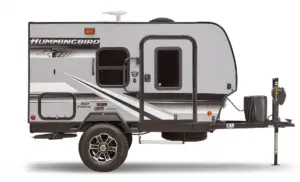
10 Best UltraLight Travel Trailers Under 1800 lbs and 2000 lbs
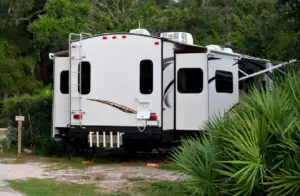
10 Best Small Travel Trailers With Slide Out

Truck camper vs travel trailer – which one to go for?
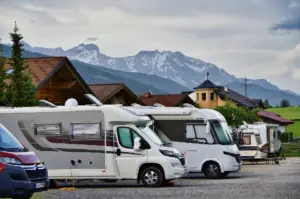
Top 12 Best Small Motorhomes Under 25 Feet Length
I Tested RV vs Van Life: Which One is Better?
Ah, whether it’s a travel trailer or a small E250 converted van , living on a set of wheels is freeing. After living full time van life for nearly two years, I am now living “RV life” in an RV fifth-wheel trailer and I must admit…it’s quite comfortable. But is it worth the extra cost and overhead? Read on for my full review of RV vs van life so far.
But first….
What's the Difference Between an RV and a Camper Van?
Technically, a camper van is a type of RV–but we tend to think of big rigs when hearing “RV” and small campervan conversions when we hear “camper van”. A camper van is classified as a Class B RV. The big fifth wheels and motorhomes fall under Class A or Class C RVs. Yeah, the classification system is a little confusing…
Class A RVs
Think big Winnebago RVs, often the most expensive and luxurious, can usually sleep up to 8 people and may even be built on a commercial truck chassis.
Class B RVs
The littlest guys out there! Think Mercedes Sprinter, Promaster, Ford Transit, Ford Econoline, Chevy Astro camper vans. They typically sleep a maximum of two people and are built on a cargo van or passenger van chassis.
Class C RVs
The in-betweeners, think Minnie Winnie by Winnebago, built on a van or car cutaway chassis and not quite as much room as Class A, but definitely more spacious than a Class B RV.
What Is RV Life Like?
Compared to van life, RV life is a dream! I have a flushing toilet, functioning shower, hot running water, heat, AC–and a big screen smart TV?! Oh yeah baby, this is bougie RV life.
BUT… the fifth wheel trailer I’m living in is stationary and connected to shore power. So I have all the “big city” amenities (i.e. electricity and sewer connections) without the hassles of trying to drive and maneuver the RV. Or dealing with insanely expensive fuel costs (pulling a class A trailer will significantly drop your gas mileage-shocking!).
It’s actually an AirBnB rental that I’ve been living in for a month in order to live with my long-distance boyfriend. This RV was half the rental price of any other AirBnB in the southern California area. I was excited to try living in a bigger tiny home on wheels.
Perks of RV Life vs Van Life
Feel "at home" and outdoors at the same time.
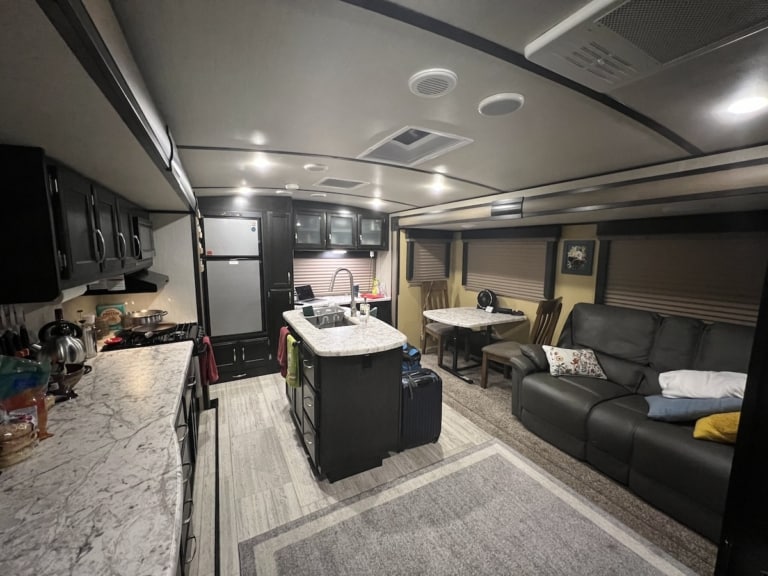
With infinite more space to walk around and all of the normal amenities of a house (including a “regular” coffee maker and RV fridge ), it’s easy to feel at-home in an RV travel trailer. The Grand A Design “Imagine” RV trailer I’m staying in even came pre-packed with utensils, spice rack, linens…it’s truly a hotel on wheels.
Compared to living in a van, I was mostly going to the bathroom, cooking and dish-washing outside. I was simply spending a lot more time outside since my living space was so small.
Enjoy lots of living space
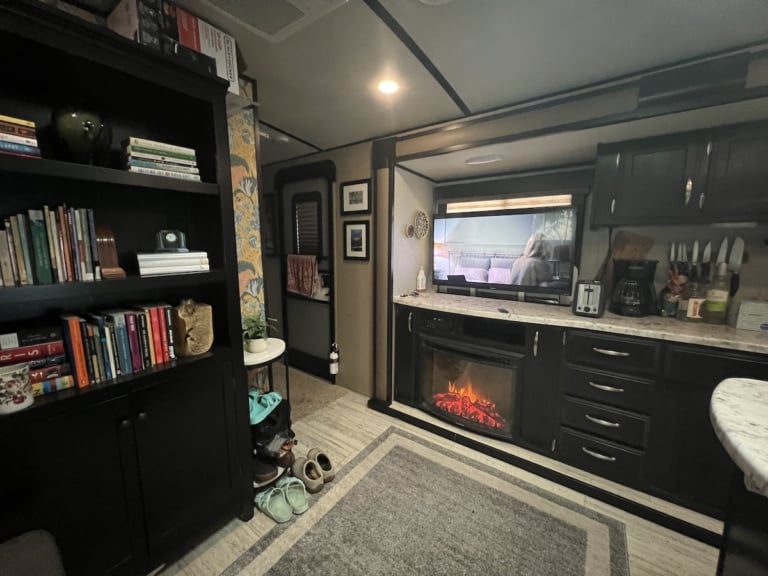
Many RVs can sleep up to eight people! This can make RVs a really affordable summer rental option for road trips, where up to eight people can split costs. Or if you are traveling as a family, an easy way to save money on overnight lodging.
What’s more, RVs have a decent amount of space for pets like cats and dogs to wander around in. So you don’t have to leave your furry cat friends or dog friends behind! Since RVs are temperature-regulated, you can even feel safe leaving your pets in the RV alone for small amounts of time.
Unlike RV living, most camper vans can only fit a maximum of two people comfortably. If the van is actually built to fit a family, you can except that much less camper van storage space .
Have more workspace options
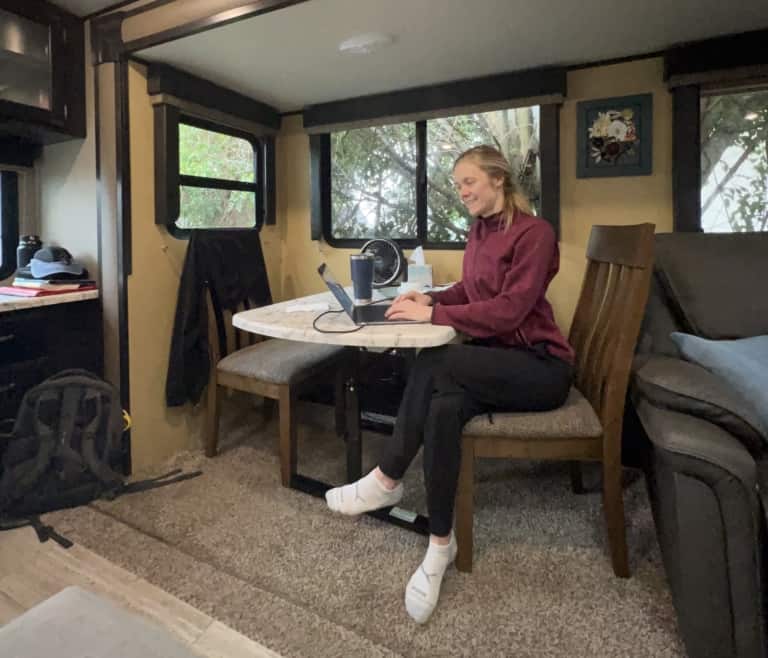
If you plan to work remotely from your motorhome, rest easy knowing you’ll have lots of workspace options.
I have multiple tabletops and seats to work on my laptop from in the RV, never mind a thermostat for temperature control and unlimited shade. When living in my van, my only work space options were sitting on my bed or sitting outside. Having to constantly adjust my seating due to bad ergonomics or sun glare and weather elements, I struggled to be productive.
Having multiple work spaces in “RV life” is a huge plus. Never mind that I can simply charge my laptop and electronic devices straight from the RV’s outlets that are connected to shore power. Whereas in the van, I would have to rotate my portable solar panels throughout the day to keep my Jackery battery powered.
Don't have to clean as frequently
Unlike my van’s mini sink, the RV boasts a regular-size sink so I can let dishes collect throughout the day (or even two days). When I was a van lifer, I could barely go one day without doing dishes simply because of its tiny space. Van life chores had to be a part of my daily routine.
While the camper van’s small space forced me to keep up with dishes, it was also exhausting. On days that I wanted to do long drives, go on long hikes, or go exploring, I dreaded the thought of cooking on top of that. It would often result in me spending money on empty calories at a fast food joint.
Get shower and toilet access
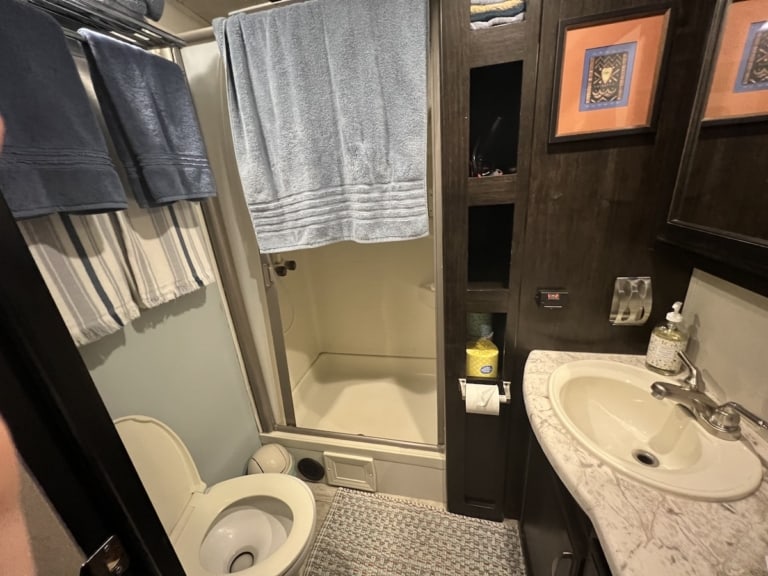
Most RV travelers get the luxury of a full bathroom built-in to their rig. This is one of the best RV life pros that gives travel trailers that homey touch. You won’t have to buy a nationwide gym membership for showers, or worry about emptying a portable toilet every other day.
However you will still have to find designated dump stations to dump grey and black water. But that’s low overhead compared to either finding soft ground to go to the bathroom outdoors, or peeing in a jug, or frequently having to empty a small portable toilet! Yum!
Save money and time on grocery runs
In the RV, I have an almost full-size fridge so I can stock up on perishables and groceries for more than a few days at a time. It’s SO nice not running out of fresh food every few days! I can meal prep and it ultimately saves me less drives to the store and less temptation for drive-thru windows.
In the camper van I was using a basic cooler to store perishables which often led to waterlogged food, buying ice every few days, and dumping the cooler. It added a lot of overhead so I tried to avoid perishable foods or use them up quickly.
Pitfalls of RV Life Compared to Van Life
Can't just get up and go.
It takes a good chunk of time to get a fifth wheel RV prepped for driving. You may have to disconnect the RV from shore power, empty grey and black water tanks, disconnect sewer hookups, bring in RV slide-outs, hitch the trailer to your vehicle, secure all items inside the RV, every time you want to drive away….
Whereas in a camper van, you just have to secure any loose items inside before driving away. There isn’t as much pressure to have your exact overnight camping spot figured out because your van can fit nearly anywhere and handle rougher roads.
Driving is slow and parking is limited
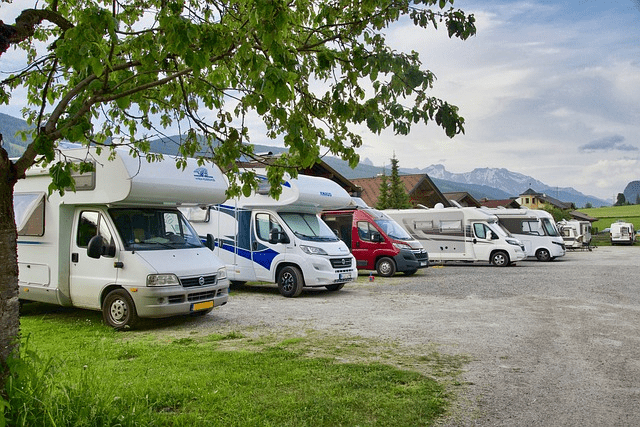
Driving an RV or pulling a travel trailer is going to be a slow and cautious process at all times. Be ready to spend a lot of time in the far-right “slow” lane on highways! Be prepared for frequent and expensive fuel pitstops. RVs are not known for their great fuel economy.
Plan on drives taking twice as long as they would in a car. What’s more, some of the most beautiful national parks are built around winding, narrow roads. Not great news for big city RVs…
You will still have the option of boondocking in the parking lots of stores that allow overnight parking . But a big RV is a lot more noticeable than a campervan conversion, so you may struggle to find a remote parking spot and can’t overstay your welcome.
Snag the camp spot of your dreams
Stealth camping is a lot more difficult.
Most RVs won’t be able to handle the poorly-maintained, washboard dirt roads that make up most of our BLM land. During my travels, I’ve noticed that there will be a cluster of RVs at the entrance of any given BLM back road, because that’s the only place they can fit!
The lack of ability to really get far out in nature to camp is one of the biggest pitfalls of RV life, in my opinion. Being miles out on a secluded public lands road is so peaceful, freeing, and empowering. I would not want to be stuck camping with a bunch of random neighbors right next door…
Most van life vans (even if they aren’t 4×4 ) can make it down lots of BLM backroads. And in the event you do get stuck, it’ll be a lot easier to find a tow vehicle for your van than for a big RV. Instead of paying for a designated camp spot in an RV park or campground, you can use loads of free van life apps to find free BLM camp spots!
The RV lifestyle is simply more expensive
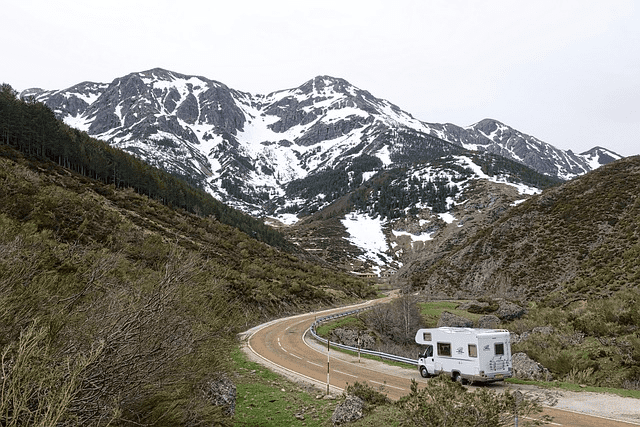
When it comes to van life vs RV life costs, RV life is more expensive from nearly every aspect. RV life costs more in terms of:
vehicle purchase
vehicle insurance
vehicle maintenance
fuel efficiency
(probably) boondocking
Van life costs typically range between $800 – $2,000 per month for most van lifers. According to Nomads in Nature , RV life generally costs between $1,600 – $5,000 per month. Class B camper van living is the most cost-effective RV option for those on a tight budget.
Since an RV is a bigger, more expensive rig (with probably more amenities) than a camper van, you’ll pay more in RV insurance vs van life insurance . And if your RV needs maintenance, you’ll have to find a specialized auto shop that can fit your RV in their car port and has knowledge around motorhomes.
Whether you are towing a fifth wheel trailer or driving a motorized RV, neither are the most fuel efficient vehicles. Towing a fifth wheel RV will require a rugged vehicle with good horse power and suspension. If you don’t have the right vehicle, you could risk failed brake systems, overheated transmission or broken suspension.
Since maneuvering RVs or travel trailers around is a hassle, most RV owners opt to stay at one location for weeks or even months at a time. Which is a great way to really familiarize yourself with the area, but can become expensive if you’re staying at a paid campground or RV park.
The average RV park costs between $30-$50 per night, with national parks charging upwards of $60 per night! If you stay at an RV park for one month, you could be paying up to $1,500/mo! That’s more than I have ever paid for rent.
Van Life vs RV Life: The Final Verdict
For me, fifth wheel RV life was perfect for an extended trip, but I choose van life for my current life path.
But it’s different for everyone. It all comes down to what your needs are. Figuring out:
How many people are you traveling with?
How long will you be on the road?
What’s your budget?
Are you wanting to explore new locations every few days, or stay posted up for weeks at a time?
Do you feel comfortable driving a large RV and learning how to maintain it?
Do you WANT to feel like you’re living brick and mortar life or do you want to be more out in the elements?
A great way to help yourself make the decision is by using a platform like Outdoorsy to get an RV rental or van rental and test out each. Even just a weekend trip in these rigs can build your confidence in making the final call.
I hope this breakdown of RV life pros vs van life pros helps set you in the right direction for your own road trip adventure!
Save on Pinterest
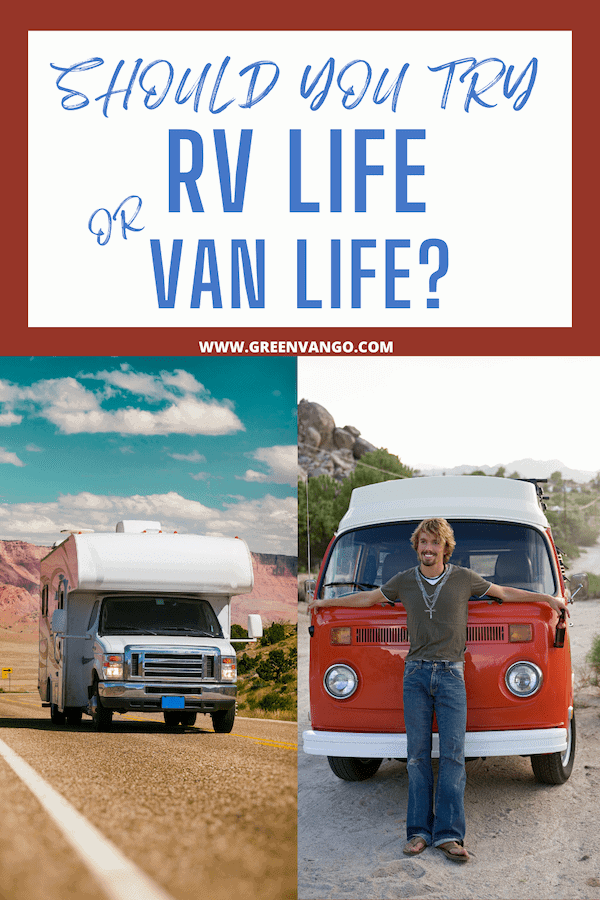
Leave a Comment Cancel reply
Save my name, email, and website in this browser for the next time I comment.
I agree that my submitted data is being collected and stored . *

RV vs. Travel Trailer: Which Is Better?
By: Author Brennan Valeski
Posted on Last updated: August 8, 2021
Categories Auto & RV , RV Living , Travel Trailer
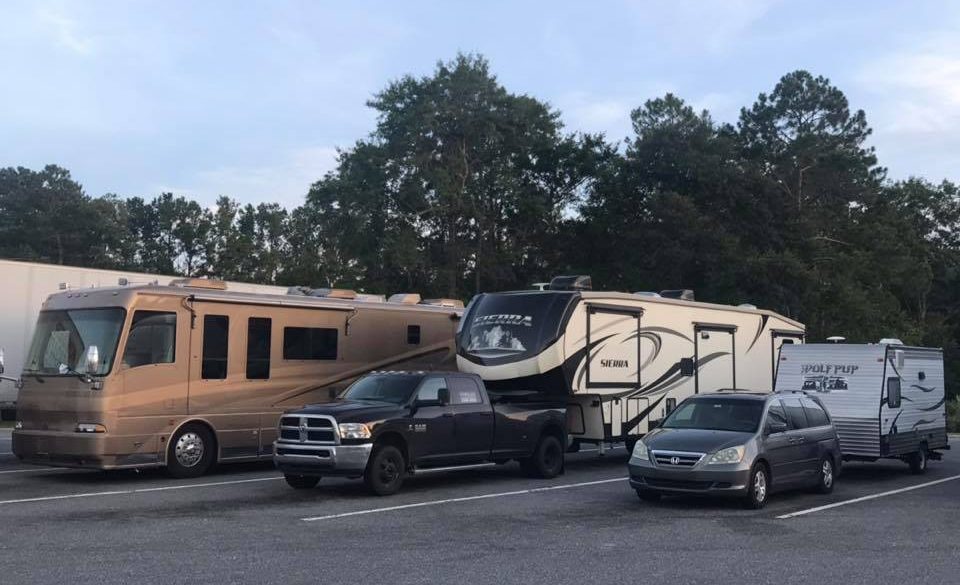
Is it better to drive a motorhome RV, or to tow a travel trailer that hitches to your existing vehicle? It’s a very important question for anyone looking to become an RVer and travel to various campgrounds and camping trips.
For most people, a travel trailer will be a better option. Unless if you plan to stay in one location with a large Class A bus style motorhome, or want the mobility of a shorter campervan, the ability to have a separate camper allows you to save on money, headaches, and maintenance.
Here are a few of the pros and cons and things to consider with an RV vs. travel trailer:
When to Go for a Large Motorhome Class A RV
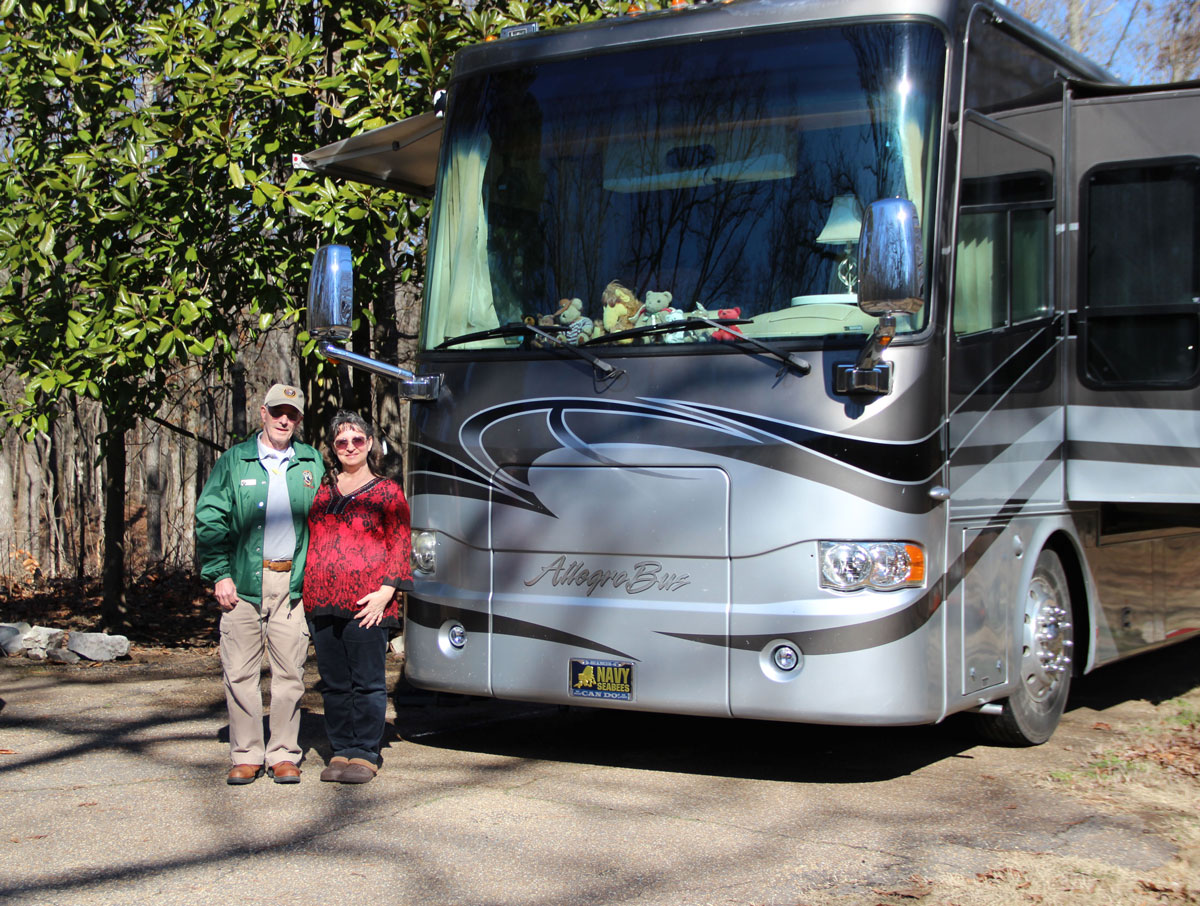
For the retirement age folks and older crowd out there, there’s a lot of them that only drive to one location. This may be an RV park or campground, and once they get there, they tend to stay and don’t leave the RV park for a long period of time.
In this case, a large motorhome makes sense since you won’t be moving around too much. You can take advantage of the luxurious cabin and not need to worry as much about the length of your RV since it’ll be more like your home on wheels that’s parked in one spot.
Once You’re at a Location, What Do You Do With Your Rig?
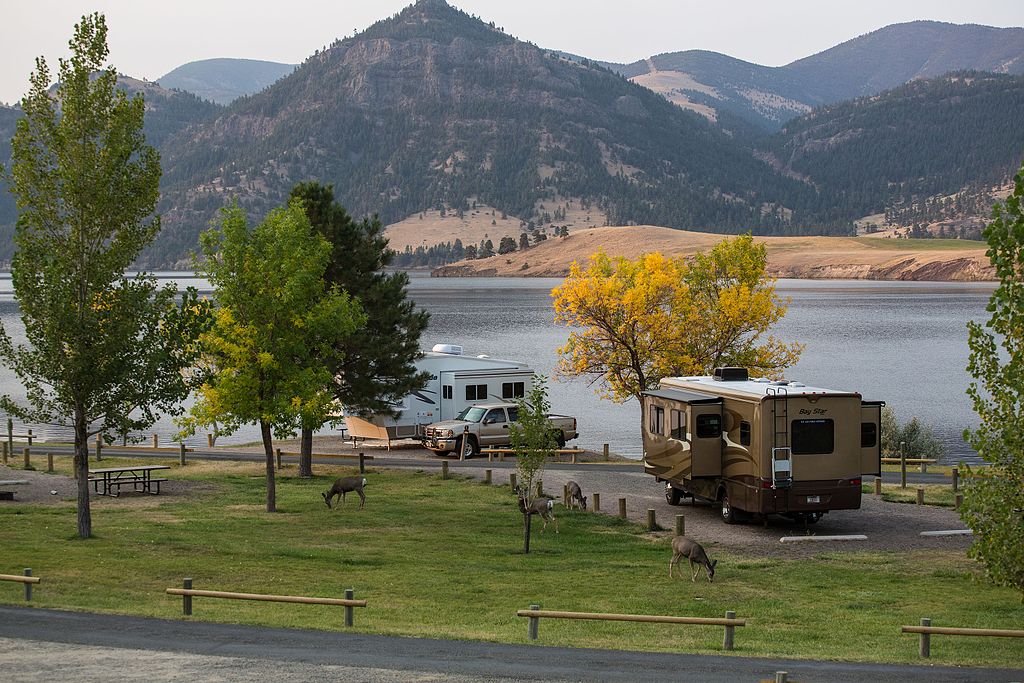
Many people have the idea that they’re going to get a full-on RV with a vehicle and home all in one piece. What happens when you need to go get groceries? What if you want to get a pizza? Or to go hiking?
If your vehicle is a bus, you have to take the entire thing with you wherever you go. Not to mention that once you get to an RV park or campground, you hook everything up.
This includes connecting the water and sewer hoses, hooking up electrical wires, and doing your leveling job. This is about a 15 to 30-minute set-up or tear-down each time. That means it’s a lot more work every time you want to go somewhere, and something you really don’t want to do constantly.
Funny enough, most people that have full-on RVs will end up towing a tiny vehicle behind it for this exact reason.
Generally, Travel Trailers Do Not Break Down
There’s typically not something too complicated that breaks on a travel trailer.
Your tow vehicle is a normal vehicle that you can take anywhere to get serviced and worked on.
This is not the case with a $300,000 motorhome that needs to get repaired at a specialized place. Many times they’re diesel engines and specialized vehicles.
Getting it repaired is going to cost a lot more and be more difficult to find a place to get it serviced.
RVs Do Not Have to Be Unhitched
This is a major benefit to driving a motorhome RV. If you’re an old-timer and you pull into a campsite, you connect all the hoses and wires and use the self-leveling functions, there’s not much else to do.
Whereas with a travel trailer, you have to back it in, unhitch it, and there’s a bit of work to it. If you’re 70 or 80 years old, then it makes sense to not put yourself through such strenuous labor.
You Can Use Your Tow Vehicle When You’re Not RVing
With a travel trailer, you spend however much on your tow vehicle. Let’s say about $45,000 for an average truck and then about $30,000 on a large travel trailer. This adds up to about $75,000 all in.
When you’re doing your usual day-to-day stuff, you still have a truck or tow vehicle to use as a regular mode of transportation. Then, the travel trailer just goes to the storage park or sits on your property.
With an RV, the least expensive ones will be about $100,000. However, it’s sole purpose is as an RV.
It’s less expensive to have a travel trailer and a tow vehicle, and you have something that you can use when you’re not traveling.
RVs Are Easier to Drive
With one large unit, they’re easier to drive since you don’t have to worry about sway and towing. No hitching up, all you have to do is hop in the driver’s seat and you’re off to your next destination.
There’s More of a Range of Travel Trailers to Choose From
With travel trailers, you have more of a range of sizes to choose from. For the most part, driving RVs have a few set sizes and lengths for a Class A, Class B, and Class C, without too much in between.
In comparison, you can go from extremely large and long travel trailers, all the way down to the small sizes that you can tow with a minivan. These price ranges go from $5,000 to $10,000 for tiny travel trailers, and all the way up to $30,000 or $65,000 massive 40-foot trailers with double slides.
Go for a Conversion Van or Class B RV for Something in Between
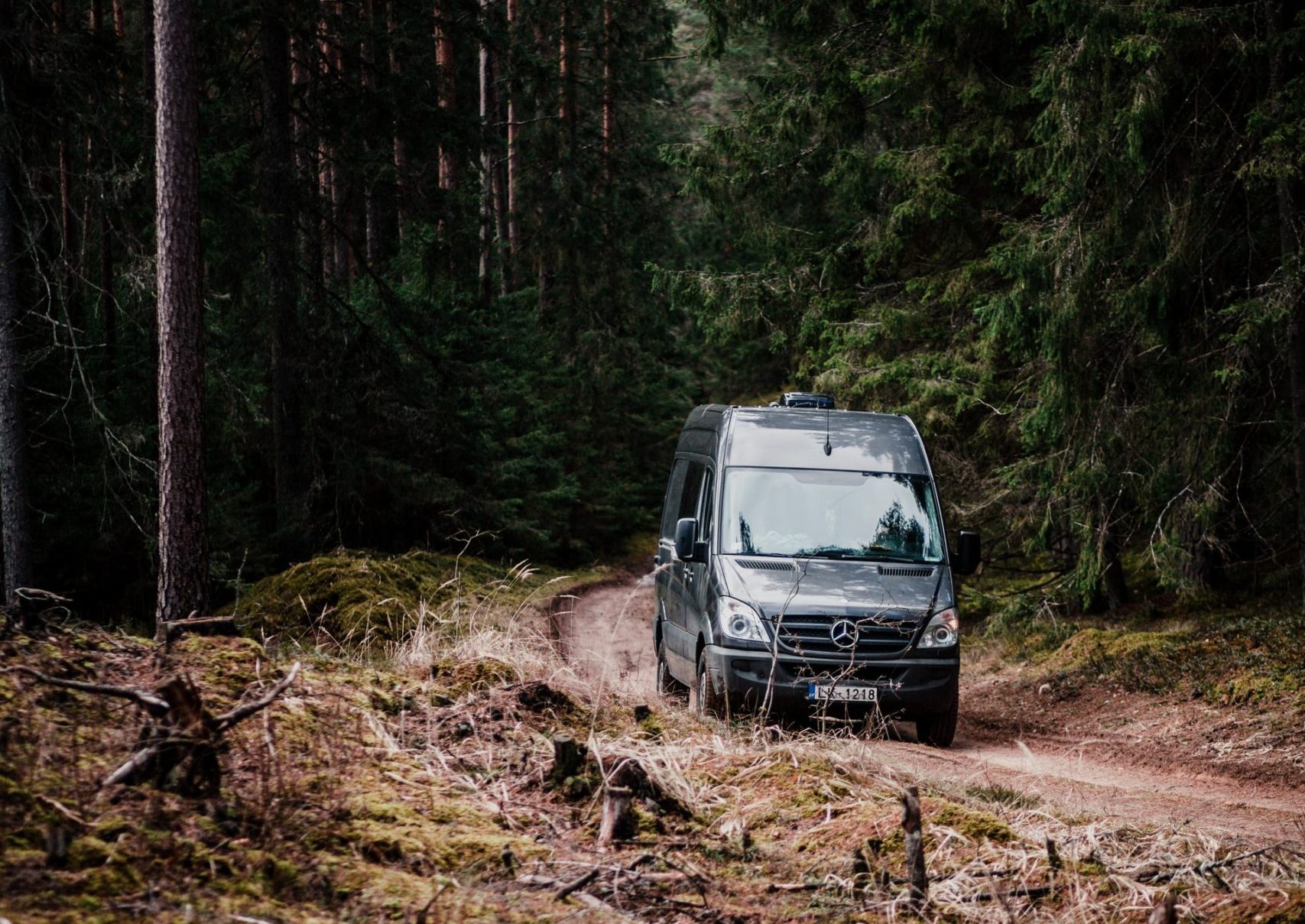
With the popularity of van life, conversion vans and different variations of Class B RVs have come to the forefront of the RV world. Campers and aspiring travelers can take advantage of the smaller size, common and easy to work on engine chassis, and that your home and RV are all in one.
Typically a campervan will cost more than the average travel trailer. On the other hand, you don’t have the cost of a tow vehicle if you don’t already own a capable one.
The main thing to keep in mind between an RV vs travel trailer is that you don’t get away from two vehicles. A lot of people think to get the RV and then they’ll have the vehicle and the living in one unit.
In the real world, that only works if you’re older and plan on going to specific places. If you’re not going to go anywhere once you’ve gotten to where you’re going, then an RV may make sense. Otherwise, travel trailers are the way to go.
The 8 Reasons a Sprinter Campervan Is Better Than an RV
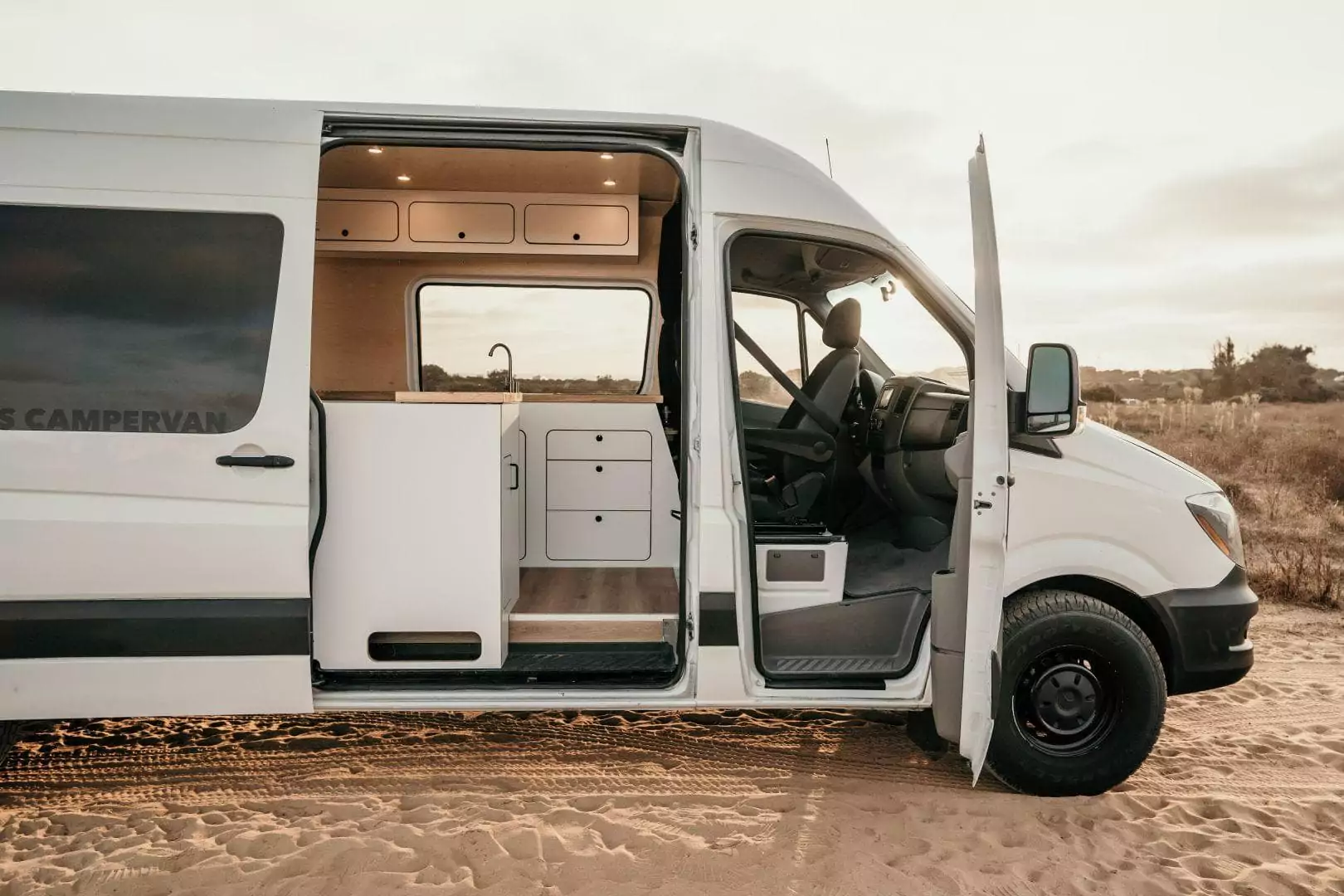
If you’re interested in off-grid Sprinter campervans and learning why they’re a much better travel…
If you’re interested in off-grid Sprinter campervans and learning why they’re a much better travel alternative than their clunky RV counterpart, you’ve come to the right place.
Warning: this article may encourage the impulsive purchase of a used cargo van.
RVs have been America’s most popular extended-travel vehicle for over 100 years. That is until the campervan made its grand re-entrance (thanks to social media) less than a decade ago. The campervan is the cooler, more talented, better-looking cousin of the RV. Today, we’re going to give you 8 reasons that prove our point.
#1: Size Really Does Matter After All…
If you had to break down the difference between a campervan and full-size RV into one word, it would be size. The implications of this are far-reaching (which we will cover shortly). Campervan conversions are typically performed on RAM, Ford, and Mercedes cargo van chassis. Short wheelbase campervan chassis range 18’ to 19’ bumper-to-bumper, while long-wheelbase chassis range from 20’ to 22’. Class A and Class C RVs range from 29’ to 41’ in length, on average. Check out this article for more information about prepping for the minimalist lifestyle .
Let’s not forget about width, which also significantly impacts drivability and convenience. You can expect a standard full-size RV to be a full 2 to 3 feet wider than a campervan. Good luck keeping that bad boy in between the lines on those long road trips. You can find a full size-breakdown summary chart below.
Please note the campervan size data is referring to RAM, Ford, and Mercedes full-size, high-roof cargo van chassis.

#2: Fuel Consumption
Whether you’re more concerned about the carbon footprint or fuel costs, campervans are significantly more fuel efficient than their RV counterparts. Vehicle weight, model-year, chassis aerodynamics, and engine-type all play a role in determining a rig’s fuel economy.
We prefer diesel over gas engines, given the longevity and better fuel economy; however, there are perks to having a gas vehicle. Some of those perks include a lower cost per gallon and reducing the risk of blowing up a diesel engine by pumping it full of gasoline (yes, we’ve experienced this).
Campervans will get anywhere from 20 to 28 mpg on the highway, while their gas-guzzling RV counterparts boast an impressive 8 to 12 mpg on the highway. It’s simple – save the planet (and your wallet), drive a campervan.

#3: Self Sustained & Off-Grid Sprinter Campervan Electrical System
This might be one of the most misunderstood differences between a campervan and its Class-A & C RV counterparts. VanCraft’s ‘no-compromise’ Sprinter campervan has an off-grid solar electrical system, which means you never have to plug it in to recharge. Instead, it harnesses the power of the sun, via solar panel, and directs that energy to a hefty battery bank, which stores and delivers consistent and sustainable power to the cabin appliances.
If you’re the type of traveler who enjoys the flexibility of going wherever you want, whenever you want, then an off-grid campervan might be for you. Not only does an off-grid electrical system allow you to avoid costly campsite fees, but it also allows you to wake up to some of the world’s most epic views. The far-reaching implications of this are largely underappreciated, but hopefully, these photos give you a good idea of why this is such a nice feature.
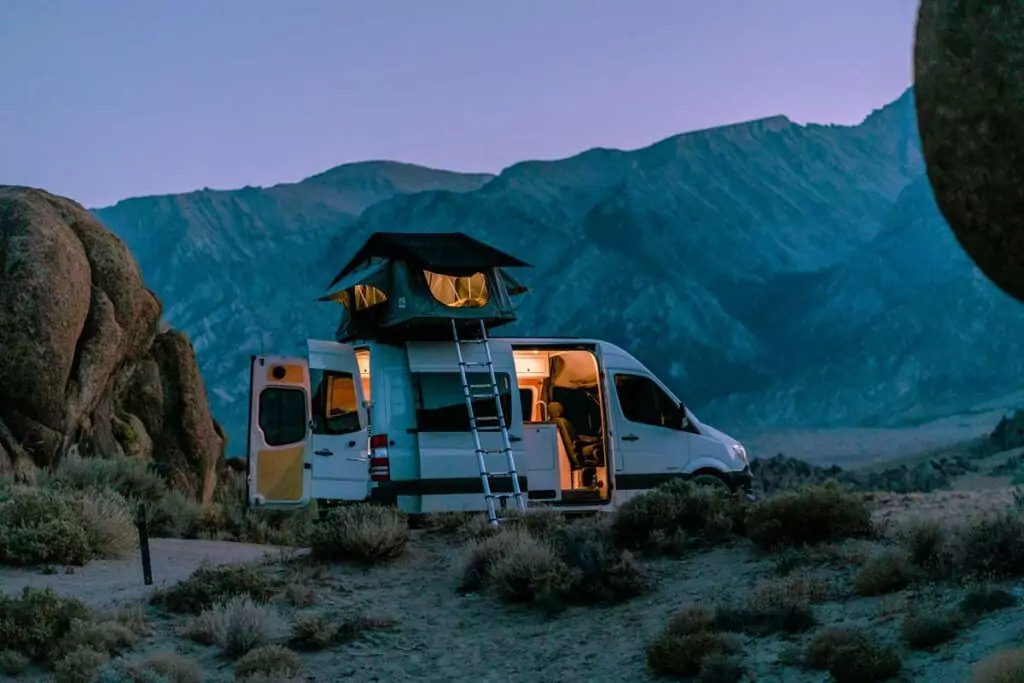
#4: Get Off The Beaten Path
Picture this; you’ve just finished a long day of skiing at Mammoth Mountain, and you want nothing more than to go relax in a natural hot spring until your body fully thaws out. So, you hop in your campervan, which is conveniently parked at the base of the gondola station (now THAT’S ski-in/ski-out) and head to Travertine hot springs , which is just outside of town. You get to the final mile-stretch of unmaintained, mountainous dirt roads and realize that your cabin-on-wheels is climbing through the snowy mud effortlessly, albeit a bumpy ride. Unfortunately, RV travelers are confined to the limitations of moderate, wide paved roads.
Higher rear axle clearance, lighter load, and 4×4 configurations open up a whole new world of exploration opportunities for campervan travelers. Yes, there are some sacrifices you have to make along the way, but they are well worth it.
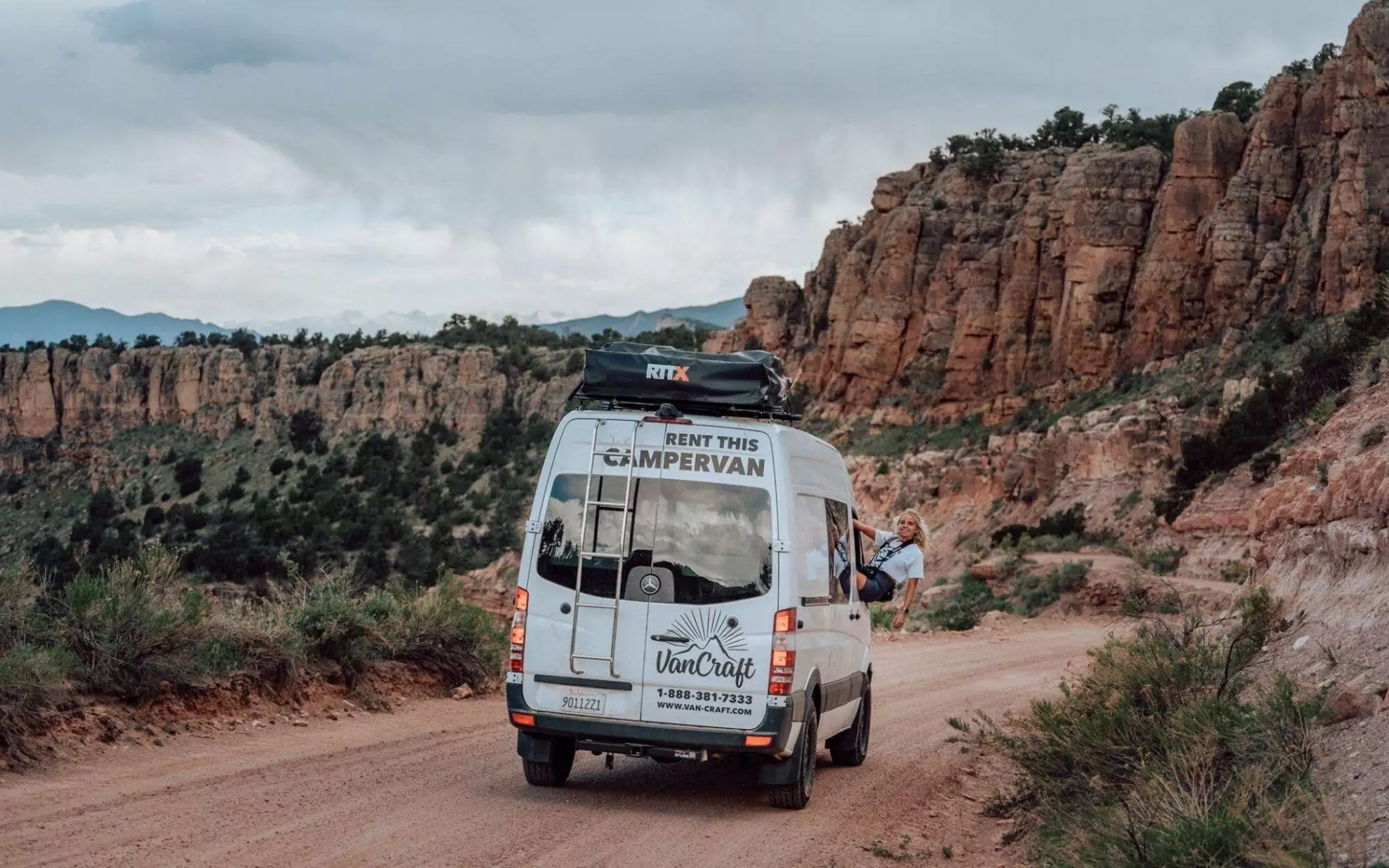
#5: Simply Functional
Speaking of sacrifices, did we mention campervans typically only have 30-40% the square footage of their RV counterparts. That means campervan manufacturers are forced to be very creative with their use of space.
Campervans challenge the traditional RV layout by embracing simplicity and functionality. Instead of bulky holding tanks, smaller water storage alternatives are used to cut down on weight and waste. Instead of an integrated full-size bathroom, a smaller portable toilet can be stowed inside the cabin, in case of an emergency. Indoor showers are replaced with outdoor showers, which opens up the cabin and reduces the risk of interior condensation. Aside from losing your bathroom and some square footage, a campervan offers much of the same functionality as a full-size RV, just on a smaller, more efficient scale. Below is an illustration of our long wheelbase Sprinter campervan layout.
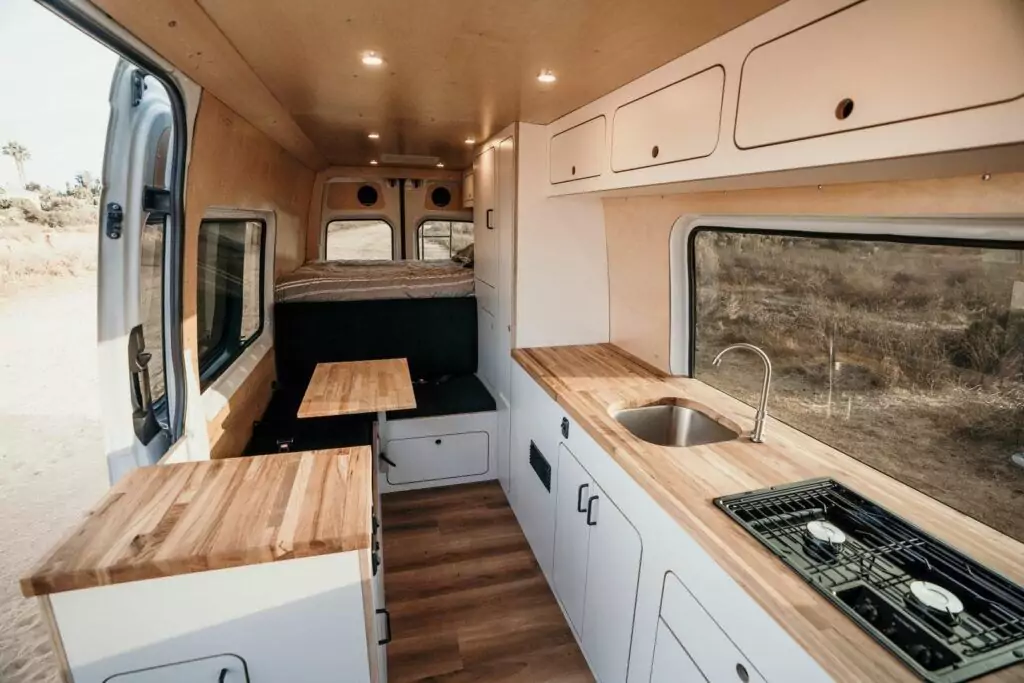
#6: Conveniently Stealthy
It’s a plumber, it’s a carpenter, it’s my delivery dude! No, wait… it’s a fully off-grid, custom Sprinter campervan. There’s no mistaking an RV for anything other than a house built on an extended truck frame. On the other hand, a campervan can easily be mistaken for a commercial cargo vehicle.
There are very subtle differences between a campervan and an unconverted cargo van chassis. To the untrained eye, a white Sprinter campervan looks the same as any old handyman’s white Sprinter cargo van. Campervans can fly under the radar and have access to, seemingly, limitless parking options. This enables a campervan to double as a fantastic daily driver option. They’re comfortable to drive, get great fuel economy, and have no problem fitting into a standard parking spot. Plus. imagine all the mid-day naps you could take during lunch breaks… Hopefully, this helps you justify including that coveted off-grid adventure mobile into your next vehicle search!
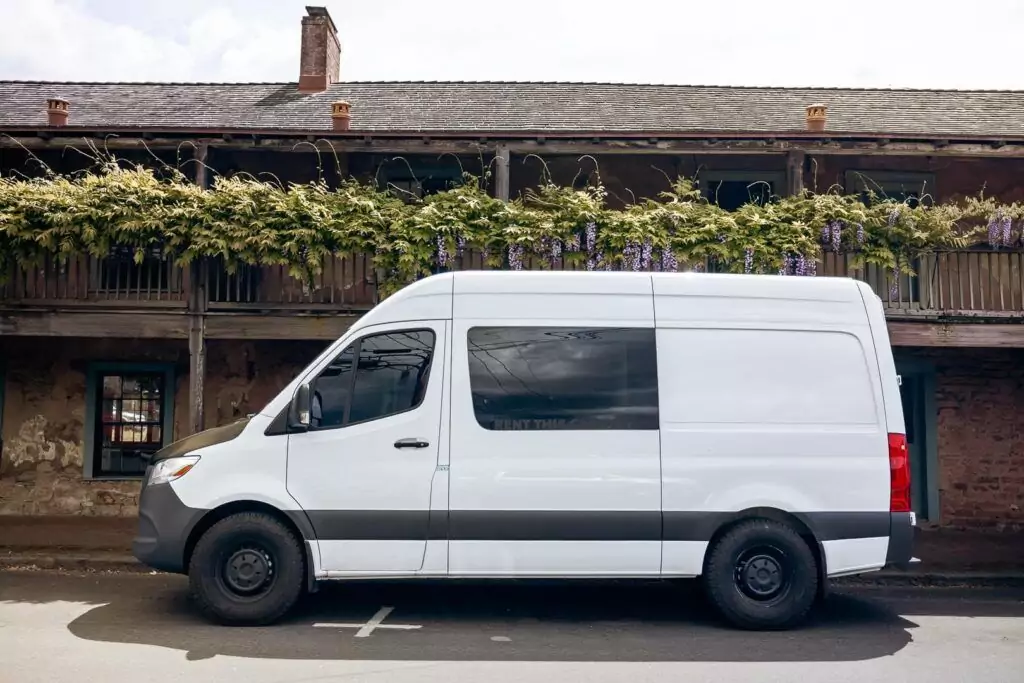
#7a: The Cost [Renters]
To make an apples-to-apples comparison between the cost of a campervan and RV trip, we delved into the world of rentals. We analyzed a handful of different variables and ultimately concluded that campervans are a much more affordable way to travel. For good measure, we also threw some smaller alternative camper vehicle options into the mix. The illustration below was created by pulling cost data for a 1-week mid-summer trip from various campervan and RV rental companies. It’s no wonder campervan rentals are taking significant market share from the RV rental industry.
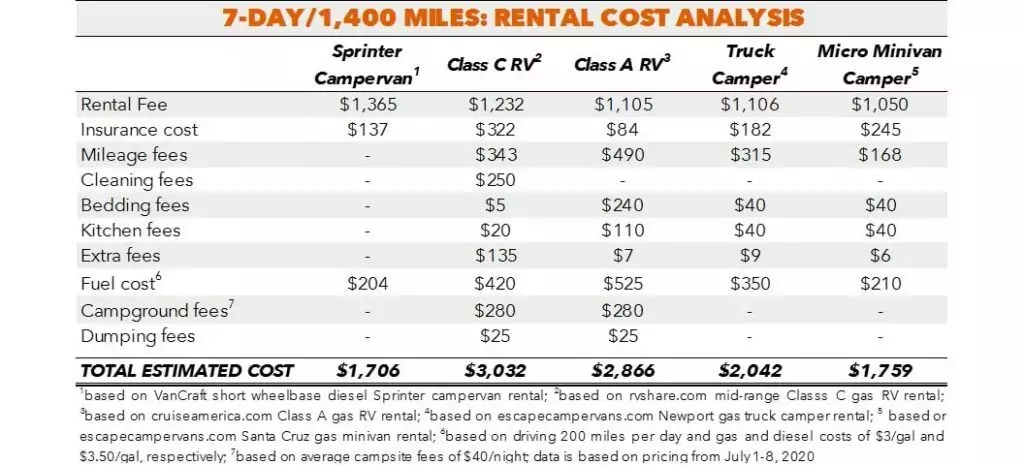
#7b: The Cost [Owners]
Below, we break down and compare the raw travel costs for Sprinter campervan and RV owners. Notice we exclude certain obvious costs, like insurance, tolls, entertainment, and debt service in efforts to keep it as simple and comparable as possible. Another glorious victory for the campervan.

#8: Waking Up To That View
Imagine being able to wake up to breathtaking views from your secluded private camp spot every morning… Anyways, someone really smart once said, “a picture is worth a thousand words”, so we’re gonna shut up now.
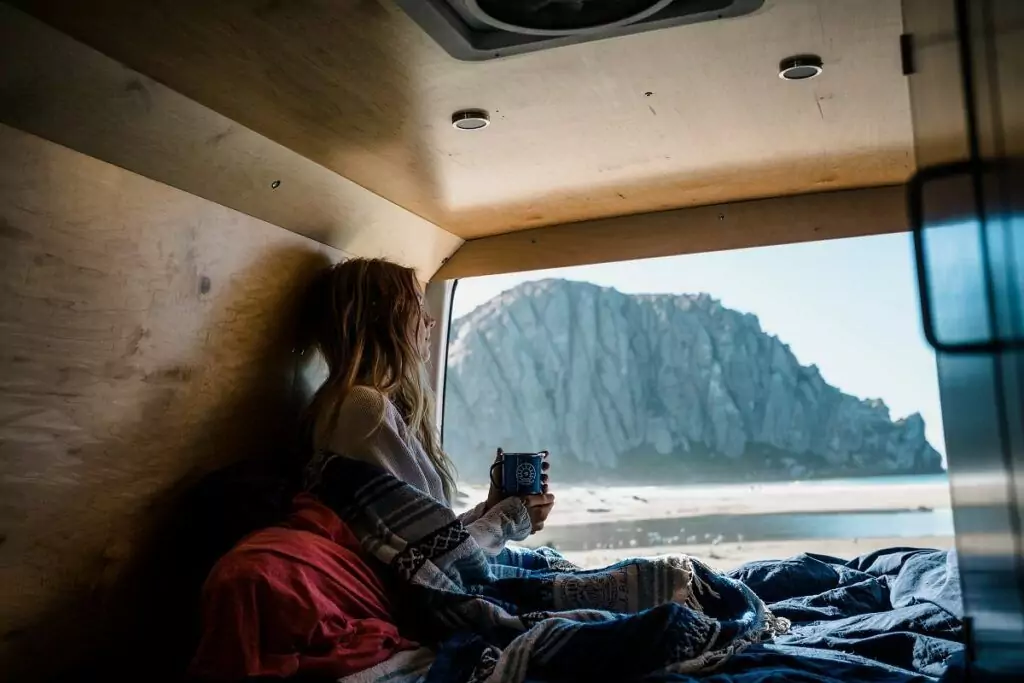
“Travel isn’t always pretty. It isn’t always comfortable. Sometimes it hurts, it even breaks your heart. But that’s okay. The journey changes you; it should change you. It leaves marks on your memory, on your consciousness, on your heart, and on your body. You take something with you. Hopefully, you leave something good behind.” – Anthony Bourdain
Our editors carefully select every product we recommend. We may earn a commission from these links. Learn more
Sprinter Van vs. Teardrop Trailer: Which Is Better For Camping?
By: Johnny Brayson Published: Mar 02, 2021
Unless you’re really into roughing it, you probably prefer to stay in something other than a tent when camping for extended periods of time. Don’t get us wrong, tents are great, but if you’re a serious camper who goes often and likes to take some of the comforts of home along with you, then you’ve likely considered purchasing some sort of camper. And that search may have led to you trying to decide between two of the most popular options: teardrop trailers vs Sprinter vans. So which is better for camping? That’s what this guide aims to help you sort out.
Teardrop trailers are tow-behind campers that are shaped like, you guessed it, teardrops. They’re popular not only for their whimsical design language but also because they are easily towable by a number of vehicles and offer a decent amount of space and amenities for their size. Sprinter vans, by contrast, are a legendary van model produced by Mercedes-Benz, and they’ve long been popular as a base vehicle for van conversions that transform these utilitarian vehicles into miniature RVs. Both teardrop trailers and Sprinter vans offer their own pros and cons, so let’s get into which is the better choice for camping.
Things To Know About Teardrop Trailers
Tears Of Joy
Price: If you’re working with a limited budget, teardrop trailers are almost certainly going to be the better option for you. While they aren’t cheap, the cost of buying a teardrop trailer is almost always going to be less expensive than going the Sprinter van route. However, you will need a vehicle that’s capable of towing a teardrop trailer, and while many are small enough to be towed by a variety of cars, this is still something you’ll need to double-check before pulling the trigger on any teardrop. Expect teardrop trailers to start below $10,000 and max out around $40,000 for large, high-end models, with most coming in around the $20,000 mark.
Size: By and large, teardrop trailers do not offer as much space as Sprinter vans. They’re usually meant for a maximum of two people, and with generally no standing room, things can get rather cramped. The tradeoff for this lack of living space is that teardrop trailers are fairly easy to store when not in use, with a smaller footprint than Sprinter vans, which are the size of, well, vans.
Driveability: One aspect of teardrop trailers that turns some people off is the idea of towing them. Any time you’re towing something behind your car, you have to be more cautious than usual to make sure you don’t do any damage to your trailer or other vehicles — especially when backing up. Parking can also be an issue with teardrop trailers, as the length they add to your vehicle may relegate you to RV-only parking spots in certain areas.
Maintenance: Most teardrop campers are not overly complicated mechanically, as there is no drivetrain. As a result, maintenance is easier and less costly than on many other types of camping vehicles , including Sprinter vans. But that doesn’t mean you can forget about it completely. There are still tires, axles, and electrical systems to worry about — and sometimes suspension systems and brakes — so always make sure everything is working as it should and follow your manufacturer’s recommended maintenance schedule.
Amenities: Given their small size, teardrop campers generally offer only the most basic amenities. A small bed, some storage cabinets, lighting, and an outdoor galley kitchen are considered pretty standard. More elaborate setups can include their own generators, more-complete kitchens, and rarely, even bathrooms.
Timberleaf Kestrel
The latest model from Timberleaf is a great budget option for anyone who’s looking to dip their toe in the teardrop trailer waters. The Kestrel is designed to be pretty barebones, giving you shelter and not much else — hence the small price tag. But what it does, it does well, offering a six-inch mattress, two windows, a roof vent, and three interior lamps housed within a lightweight 860 lb package that can be towed by nearly any vehicle.
Purchase: $7,800+
Escapod Topo
A tough steel frame and corrosion-resistant aluminum exterior make up the foundation of the Topo, which is built for extreme adventures with 20” of ground clearance, a 3500 lb. torsion axle suspension, and 31” all-terrain tires all standard. Also standard is a stainless steel exterior galley kitchen with dual propane burners, a 5” foam mattress, LED lighting, and birch cabinetry. There’s even a plethora of standard accessories from brands like Thule, ROAM Adventure Co., and YETI, making this an extremely feature-packed off-roader.
Purchase: $19,759+
Bean Classic Bean
The aptly-named Classic Bean has been on the road for more than two decades, and it’s pretty much your prototypical teardrop trailer. Its one-piece fiberglass shell is extremely durable, while retro fender flares add a fun touch of style. But as attractive as the Bean’s exterior is, it’s the interior that really shines with a queen-sized bed, 5 feet of vertical clearance, touch-control RGB lighting, a Maxx air fan, and a serious amount of storage. There’s also an exterior galley kitchen with a stainless steel sink, two-burner stove, and a shocking amount of counter space.
Purchase: $20,900+
Polydrops P17A
It seems cliché to point out that this is the teardrop trailer that a Tesla Cybertruck would pull, but… this is the teardrop trailer that a Tesla Cybertruck would pull. The Polydrop’s angular styling with anodized aluminum finish looks like nothing else on the road, but that’s not all that’s futuristic about it. This self-sustaining trailer boasts 260-watt solar panels and an MPPT solar charge controller to power up its 2.4kWh Lithium Batteries and run its full HVAC system. There’s also a stylish interior with a full-size bed, micro-closet, LED lighting, and optional Bluetooth speakers. Oh, and you get in and out of the trailer via gullwing doors, of course.
Purchase: $24,990+
Safari Condo Alto
If the typical teardrop trailer seems a little too small for your taste but you still dig the look, then the Alto from Safari Condo may be for you. This is about as big and luxurious as teardrop trailers get. Weighing in at over 1,800 pounds and measuring 83.5” tall, the Alto’s unique telescoping aluminum roof increases the total height to 101” when open, offering a more comfortable living space. Speaking of comfort, this trailer includes a flush toilet, interior dining area and kitchenette, and either a king or queen-sized bed. If you opt for the version with the queen, you also get an interior shower in the deal — basically unheard of among teardrop trailers.
Purchase: $41,200+
Things To Know About Sprinter Vans
Hashtag Van Life
Price: There’s no way around it, Sprinter vans are expensive. If you already have a compatible Sprinter van to use as a donor vehicle — they start around $40,000 new, FYI — you’re still going to need to pony up at least $30,000 for a basic conversion. For a completed Sprinter van conversion that includes the van, you’re likely looking at a starting price around 90 grand, with many coming in around $150,000. So, yeah, they ain’t cheap.
Size: All that money definitely gets you some space in return, as Sprinter vans offer a lot of room. There’s often space enough to stand and walk around inside them, something that can’t be said for teardrop trailers. You can actually hang out inside a Sprinter van, while a teardrop is going to mainly be used for sleeping . And while a Sprinter van will definitely take up more space than a teardrop trailer when not in use, they’re still a reasonable size for many people and are certainly easier to make room for than a full-size RV.
Driveability: Driving Sprinter vans should be pretty familiar to anyone who’s driven a car since that’s what they are. There’s nothing to tow, so as long as you’re comfortable with driving a vehicle that’s on the larger side, you’ll be fine. Parking also is not an issue with Sprinter vans. Since they’re just regular vans that have been converted, they’ll fit into any parking spot that’s meant for cars. They often lack off-road capability, though, so if you’re looking to go bombing around in your camper, then a teardrop with a 4×4 to tow it will probably make for a better option.
Maintenance: Maintenance is definitely more extensive on a Sprinter van than on a teardrop trailer. Everything that can go wrong on a car can also go wrong on a Sprinter van, plus about a million other things if you’re running electrical, gas, and water to the van’s living space. But when we’re talking about a six-figure vehicle, you didn’t really expect maintenance to be cheap, did you?
Amenities: Here’s one area where Sprinter vans really shine. Because of their size, Sprinter vans can fit in a lot of goodies behind their sliding doors. Interior kitchens , dining areas, couches with convertible beds, and bathrooms — sometimes even with a shower — can often be found in Sprinter vans, and they are much more akin to a hotel room on wheels than teardrop trailers are.
VanCraft Rentals
If the idea of dropping six-figures has you resigned to living that #tentlife forever, don’t give up hope yet. You still have the option of renting a converted Sprinter van, giving you an affordable way to #vanlife your way through your next camping trip on the cheap. Southern California’s VanCraft offers Sprinter van rentals starting at just $189 per day for vans that are outfitted with stoves, fridges, full-sized beds, over six feet of headroom, off-grid solar power , outdoor hot showers, and more — all standard.
Purchase: $189+
RB Components Adventure Vans
If you’ve already got a Sprinter van and are simply looking for someone to convert it, then RB Components Adventure Vans Sport Packages are a great and (relatively) affordable option for you. Their most-inexpensive interior conversion packages start at $31,000 for the 144 RB Sport model ($89,000 if they supply the van, too) and go up to $90,000 for their top-level 170/170ex RB Touring conversion. They also offer many individual conversion components for DIYers, if you’re looking to go that route.
Purchase: $31,000+
Pleasure-Way
Pleasure-Way is one of the leaders in the camper van conversion space, and as such, they have a lot to choose from. The company offers 8 different van builds, three of which are based on the Sprinter. Their entry-level Sprinter model is the Ascent TS, which you can easily customize via the company’s superior online van builder. Pick out your color, cabinets, countertops, upholstery, and add-ons, then download a PDF of your build and get in touch with a dealer . Easy peasy.
Purchase: $149,000+
El Kapitan has been handcrafting their Sprinter van conversions for more than 30 years, and they’re darn good at it. With an inventory of hundreds of models either for sale or in production at any given time, you’ll always have plenty of completed vans to choose from, and all will be stunning and of the highest quality. Their Story Maker model boasts plywood floors, mahogany wall panels, reclining lounge seats, and room to comfortably sleep four, while their Dream Weaver model includes an interior shower and garage space. Both have 4×4 and ultra-luxe package upgrades available.
Purchase: $152,000+
Boulder Camper Vans
If you have a very specific dream of what your Sprinter van should look like, then you should talk to the folks at Boulder Camper Vans. You’ll find nothing off the shelf here, and no standard layouts from which to choose. Everything they do is custom-made , giving you complete control over your Sprinter van conversion. All of their bespoke builds are engineered to be four season-ready and off-grid capable, but other than that, it’s up to you (they’ll of course guide you as much as needed). Expect your build to take two to three months, with regular photo and video updates from the team at Boulder throughout the process.
Purchase: $TBD
From Our Partners
Wellen’s Garment Dyed Chore Coat Takes Inspiration from Vintage French Work Jackets
Presented by Huckberry
Nike’s Air Max Dn Kicks off the Latest Innovation in Air Technology
Presented by Nike
The Best USA-Made Everyday Carry Essentials [VIDEO]
Presented by Gerber
More Campers & RVs
Ford Rolls Out a Black-Out Package For Its Range-Topping Bronco Raptor
By Tim Huber
Toyota Rolls Out Comprehensively Redesigned 2025 4Runner SUV
Aimé Leon Dore and Porsche Are Back with a Beautifully Restored 944 Turbo
By Cameron Cardwell
Toyota Rolls Out a Factory-Lifted, Go-Anywhere Version Of Its Crown Mid-Sized Luxury Model
The 2025 Range Rover Sport Stealth Pack Is a Moody and Monochromatic Marvel
Steve McQueen’s 1970 Chevy K5 Blazer CST Is Slated To Cross the Auction Block

IMAGES
VIDEO
COMMENTS
Expect to pay: $10,000 - $35,000. A travel trailer can be much less than a camper van unless you choose to build your own camper van and buy a cheap, used van. If you choose a newer van or if you buy a pre-manufactured van, you will pay much less for a travel trailer. However, there are other costs that you must consider if this is the route ...
A recreational vehicle (RV) is a catch-all term that applies to the family of vehicles that can be driven, towed or popped up as well as lived and slept in, says Paul Bandstra, national sales ...
Let's delve into the key differences that set campers and travel trailers apart, helping you make an informed decision when selecting the ideal RV for your adventures. 1. Design and Size: Campers: Campers are smaller and designed to be affixed to the bed of a pickup truck or towed by a smaller vehicle.
Recreational vehicles are more popular than ever and millennials and Gen Z-ers are flocking to one particular kind of RV- campervans. But campervans are not without their drawbacks and, if you're in the market to buy an RV, I'd argue that one type may be a better fit for you than a campervan- the mighty travel trailer. In fact, here's 8 reasons you should buy a travel trailer vs. doing van ...
Fuel Efficiency. At the end of the day, the smaller size of a camper van makes it such an attractive option for campers. When it comes to fuel efficiency, gas costs half of what you would typically put into an RV. A fuel-efficient van can help you expand your budget for more sightseeing opportunities and other luxuries.
Pros to Travel Trailer vs Camper Van. You Save your Spot! Once Parked, You have a Normal Vehicle. More Room (vs a Camper Van) Pros to Camper Van Over Travel Trailer. You Can Stealth Camp More Easily. Your Rig is Smaller. You Always have Everything. Cons to Travel Trailer vs Camper Van.
However, in general, campervans are slightly more fuel-efficient than travel trailers. The added vehicle strain involved in towing a travel trailer adds up quickly and you can generally expect to get around 20mpg, while most diesel engine campervans get around 18-25mpg (or higher). Obviously, neither are excellent on fuel, but when you consider ...
Short answer: RV vs Campervan. RV stands for recreational vehicle and is a larger vehicle designed for full-time living. A campervan or camper van is a smaller vehicle, often converted from a van, that can be used for camping and short trips but may not have as many amenities as an RV. How to Choose Between an RV and a Campervan for Your Next ...
Since these are smaller motorhomes, they allow you to travel virtually anywhere and park under the stars. The downside, of course, is that the van is often only big enough or one or two people. That said, some vehicles are pop-up campers, meaning they have a bunk above the roof to make it more accommodating.
A camper van is also a better option for stealth camping. A travel trailer is a better option for families because of the larger amount of space available. Travel trailers are also better for extended trips because they can carry more water. In the rest of this article, I will discuss Campervans vs. Trailers.
Class C: the in-between RV size. A parked RV across from Google headquarters on May 22, 2019 in Mountain View, California. Justin Sullivan/Getty Images. As counterintuitive as it is, the Class C ...
Fuel efficiency plays a major role in the cost of ownership of your RV. Imagine you're taking a 1,000 mile trip. If you drive a motorhome that gets 10 mpg, you'd need 100 gallons of fuel. At $3.50 per gallon, that's $350. If you use a travel trailer and your tow vehicle gets 15 mpg, you'd only need 67 gallons of fuel.
5th wheel vs. travel trailer. 5th wheels are often a similar size to travel trailers (larger than campers and other smaller trailers), but the primary difference between these is in how they connect to the tow vehicle. Travel trailers connect via a bumper-level hitch, while 5th wheels connect to a hitch that is inside the bed of a truck.
The Revel Class B camper van by Winnebago uses a 144-inch Mercedes-Benz 4x4 Sprinter as the base. Photo: Courtesy of Winnebago. Size: 17 to 23 feet. Weight: 4,000 to 9,000 pounds. Details: Often ...
A campervan is a compact home on wheels, offering a blend of mobility and essential amenities. Conversely, a camping trailer provides a detachable dwelling, allowing more flexibility in setting up your camp. Your choice between a campervan and a camping trailer will hinge on various factors, including your travel style, budget, and the level of ...
Most of the research that I have been doing has been saying that travel trailers are around $20,000-$30,000. That is a significant price drop. You can even get used ones which could potentially cost less. If you are experienced or you live in your RV, then go for the motorhome. That will probably fit you better.
A camper trailer can be considerably cheaper than a caravan or a camper van. Also, camper trailers are generally a lot smaller and easier to transport than the other two options. This takes away any worries that your gas mileage will decrease, because of the extra weight of the trailer. ... PROS AND CONS OF CAMPER TRAILER & CARAVANS VS CAMPERS ...
Pros. Point #1: Travel trailers are much cheaper, and a have a much better square foot cost ratio compared to truck campers. This is often viewed as a "starter pack" for RVer's. Point #2: You can easily attach and unhitch the trailer so that you can use your towing vehicle to explore or run errands.
Both the travel trailer and class c rv incur almost similar overnight parking costs which could be around $10-$50 per night. Indoor or outdoor storage costs are also similar for both. An indoor storage costs around $50-$500 where as outdoor storage cost of renting could be anything between $40-$100 on an average. 16.
Van life costs typically range between $800 - $2,000 per month for most van lifers. According to Nomads in Nature, RV life generally costs between $1,600 - $5,000 per month. Class B camper van living is the most cost-effective RV option for those on a tight budget.
Then, the travel trailer just goes to the storage park or sits on your property. With an RV, the least expensive ones will be about $100,000. However, it's sole purpose is as an RV. It's less expensive to have a travel trailer and a tow vehicle, and you have something that you can use when you're not traveling.
Category. VanLife Tips. In this article. #1: Size Really Does Matter After All…. #2: Fuel Consumption. #3: Self Sustained & Off-Grid Sprinter Campervan Electrical System. #4: Get Off The Beaten Path. #5: Simply Functional. #6: Conveniently Stealthy.
Teardrop trailers are tow-behind campers that are shaped like, you guessed it, teardrops. ... Pleasure-Way is one of the leaders in the camper van conversion space, and as such, they have a lot to choose from. The company offers 8 different van builds, three of which are based on the Sprinter. Their entry-level Sprinter model is the Ascent TS ...